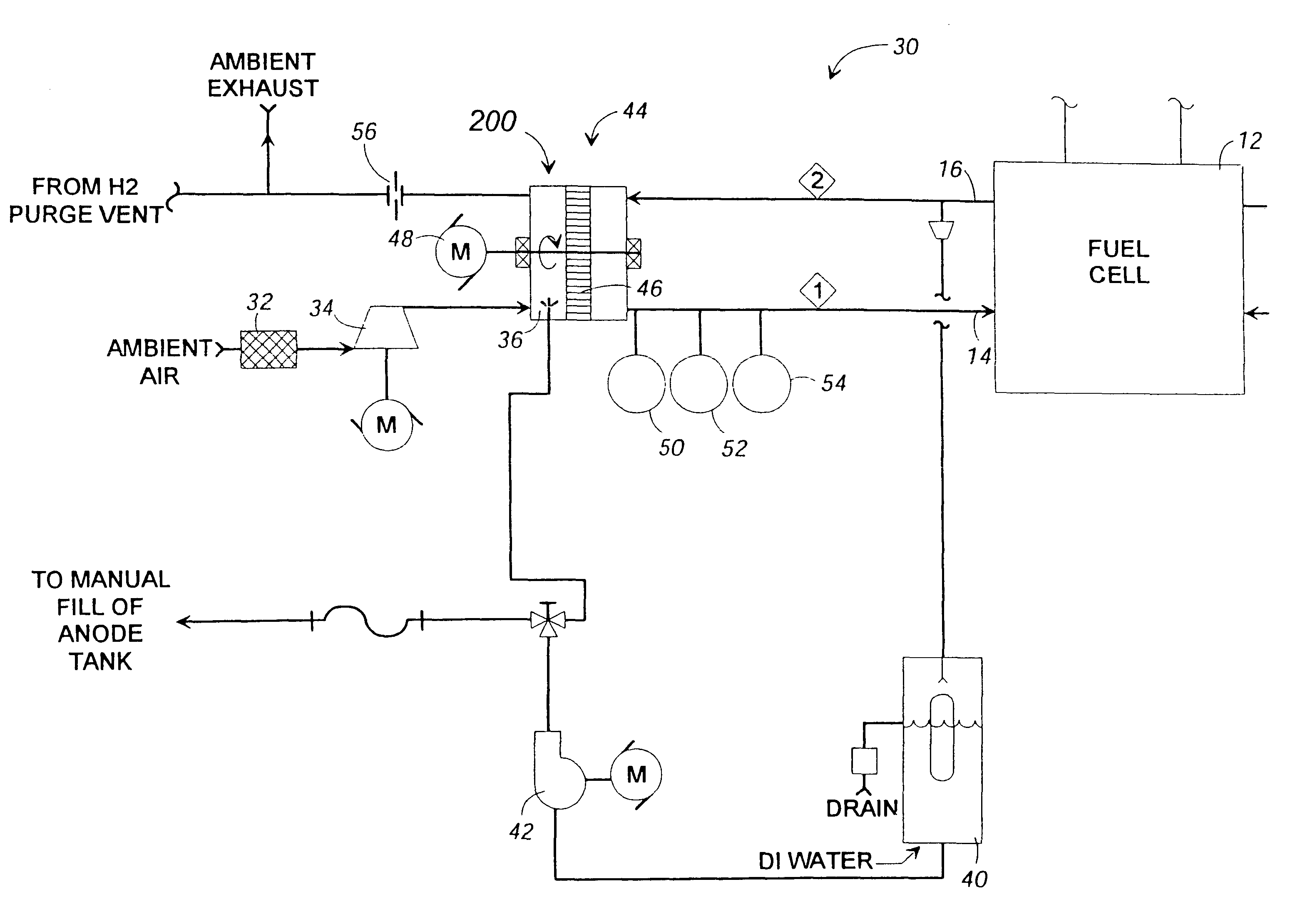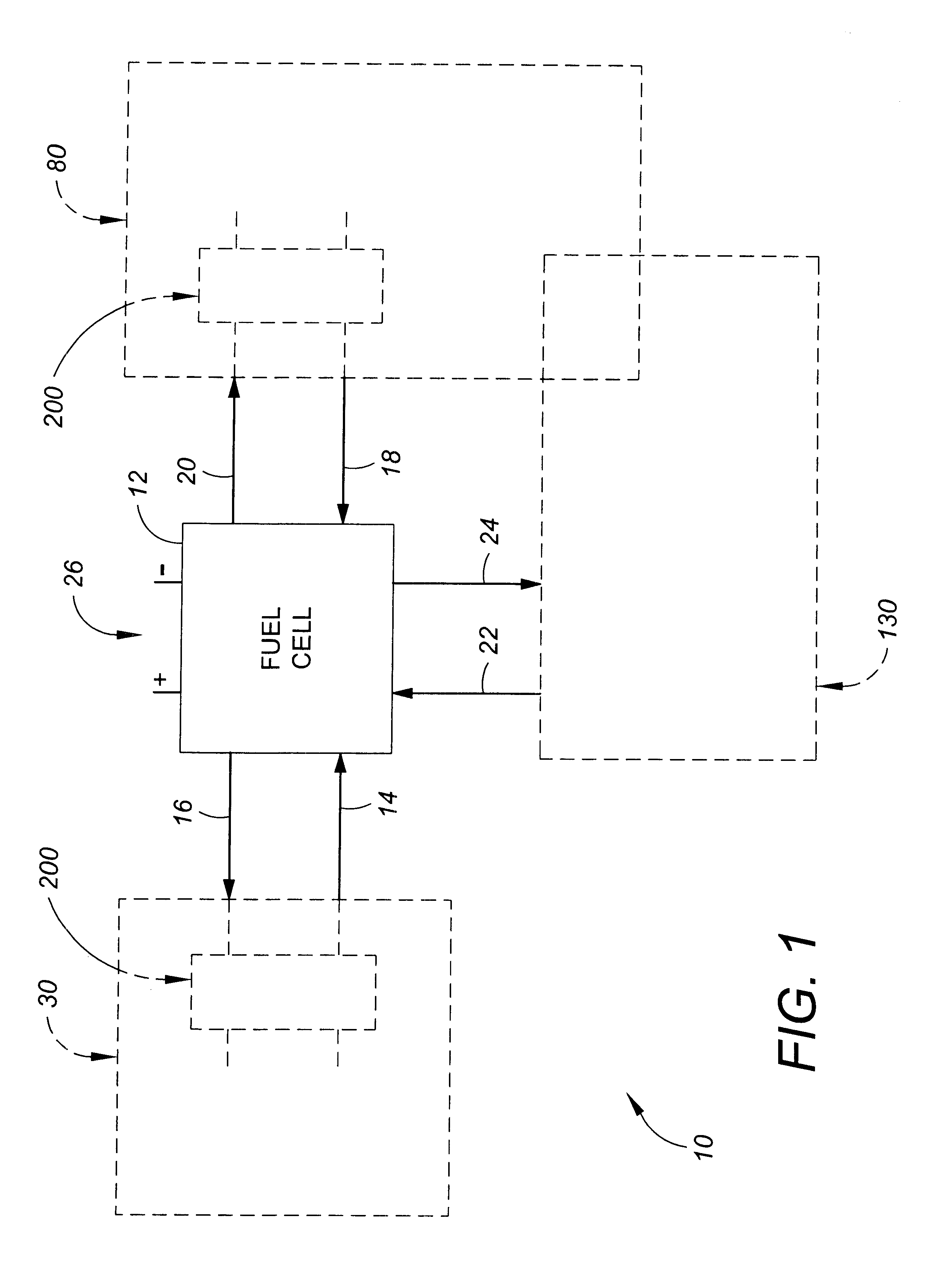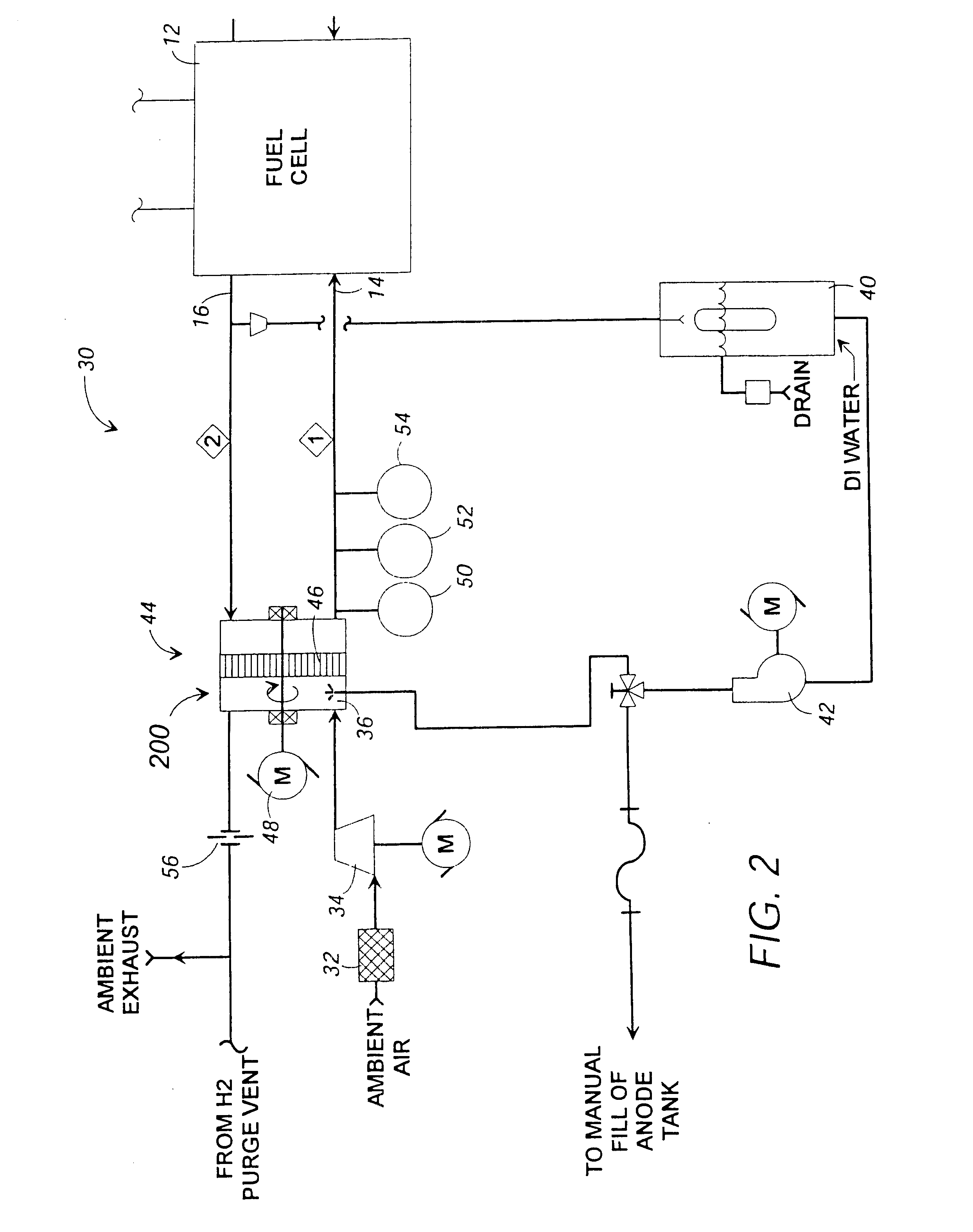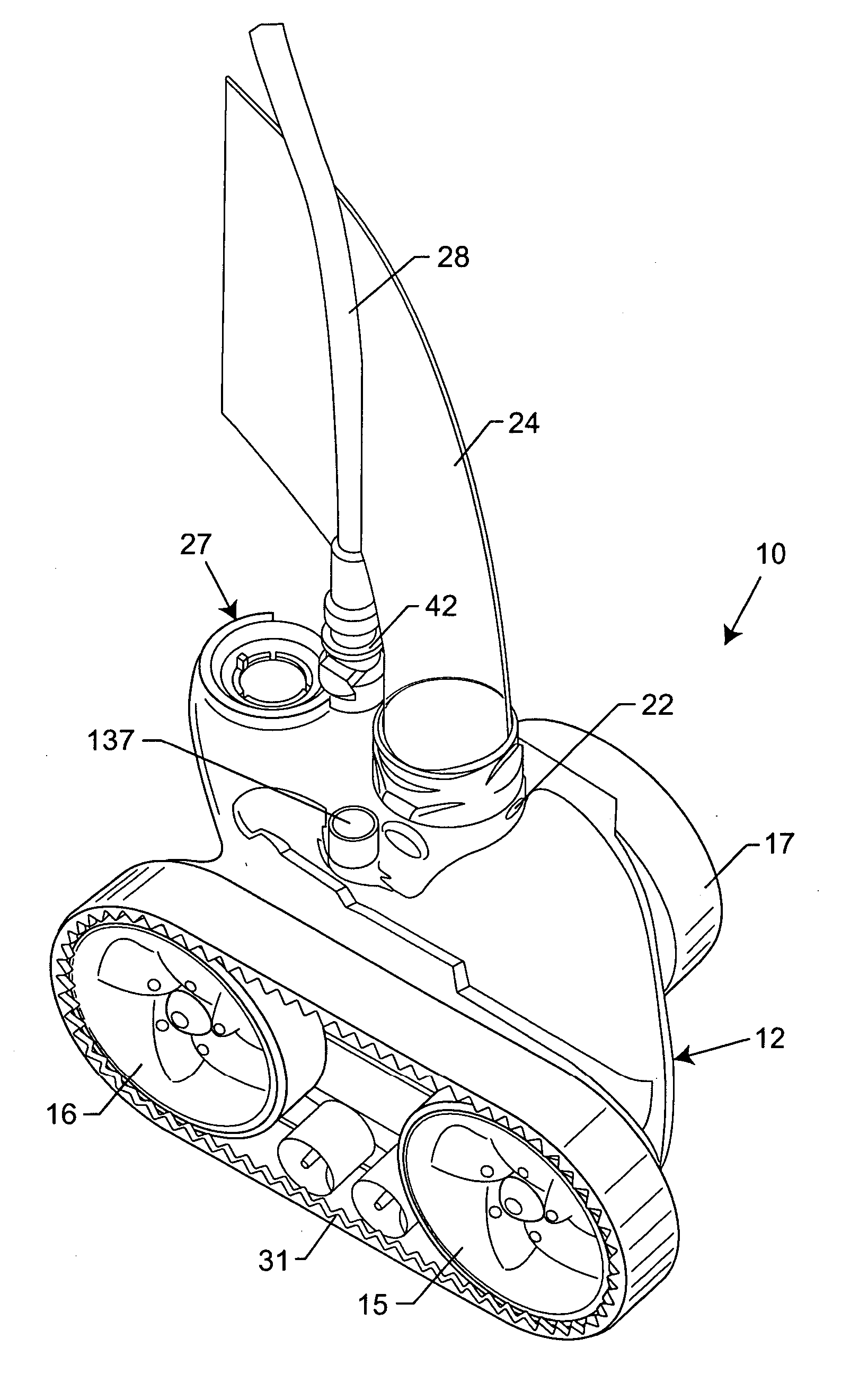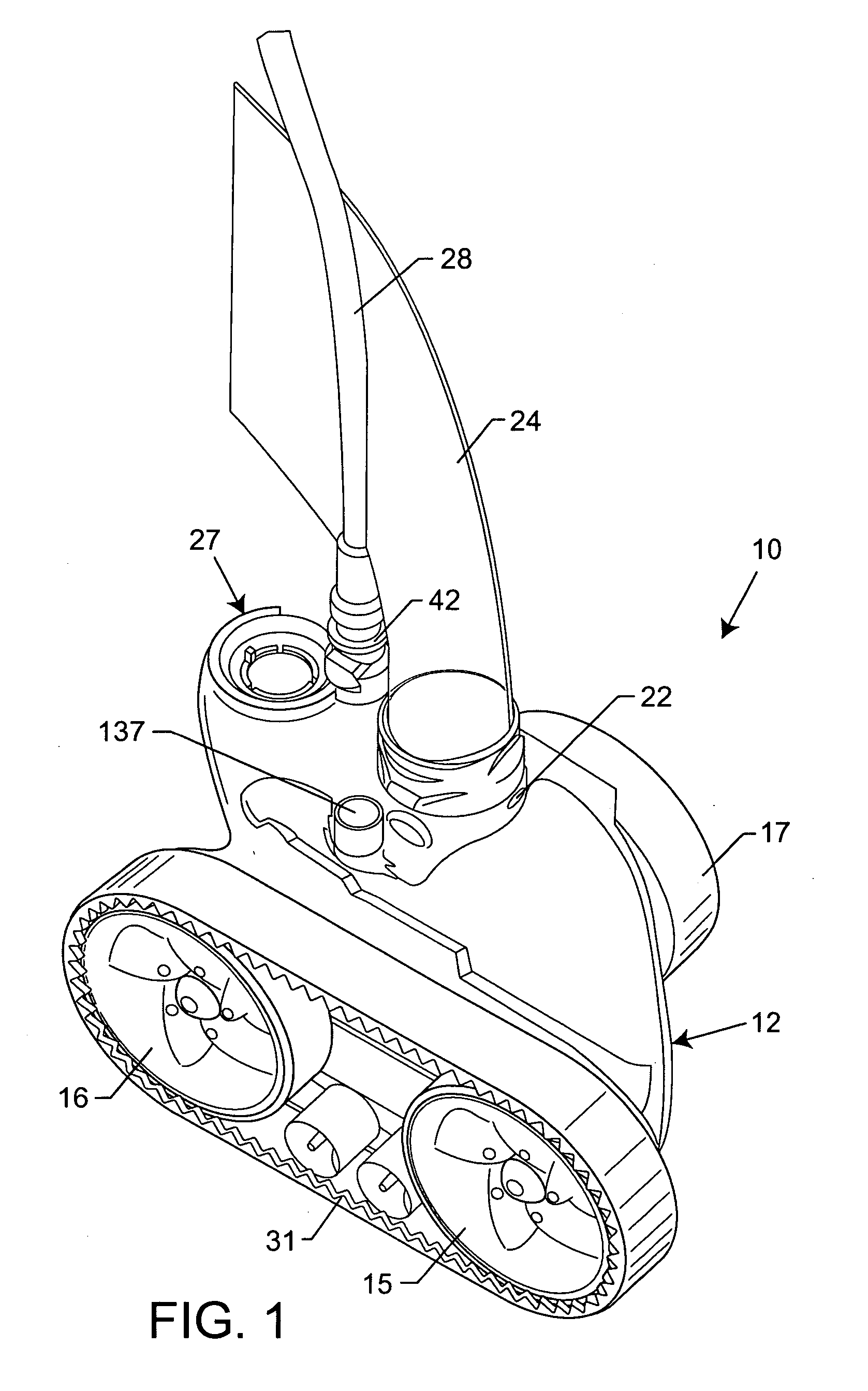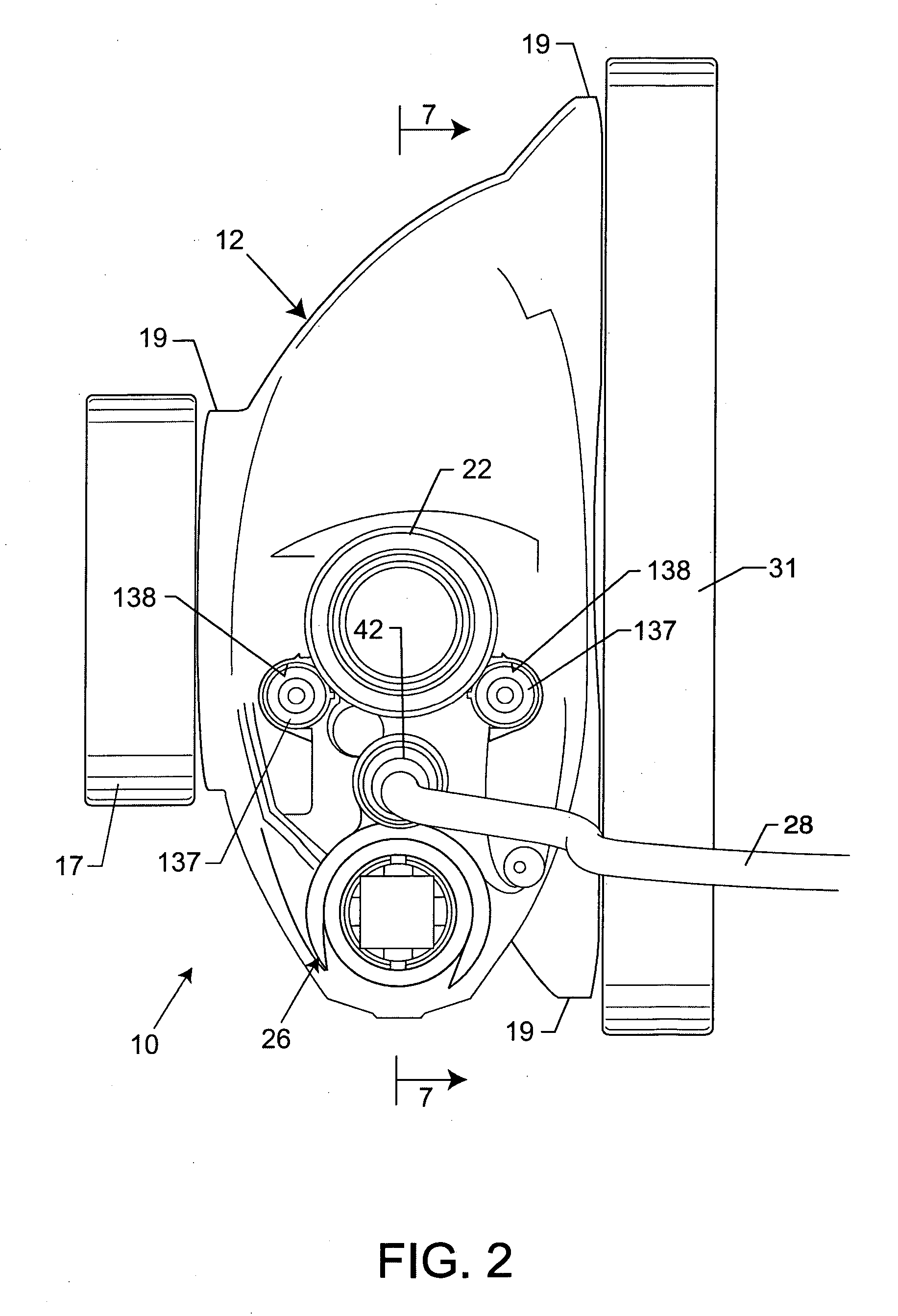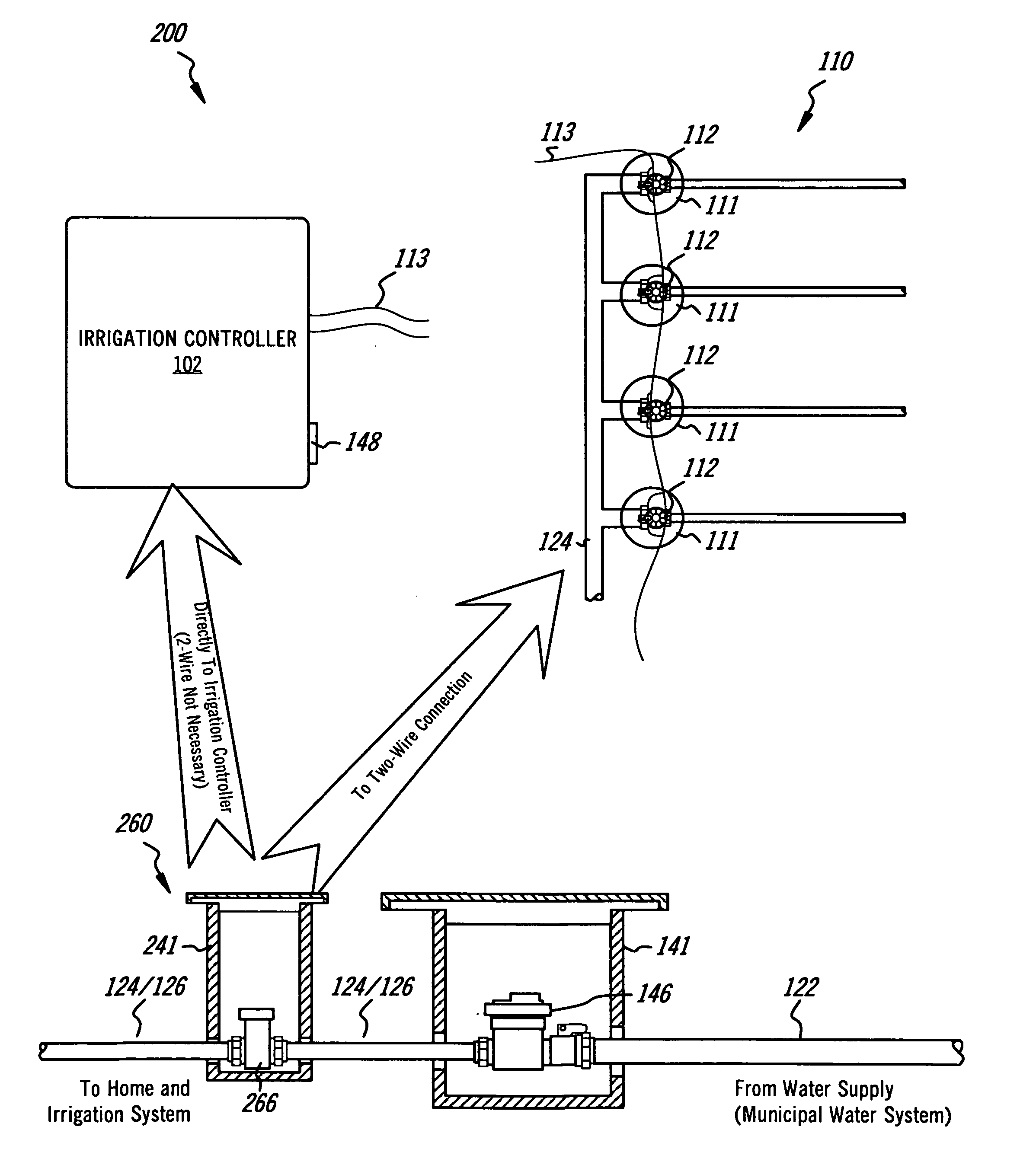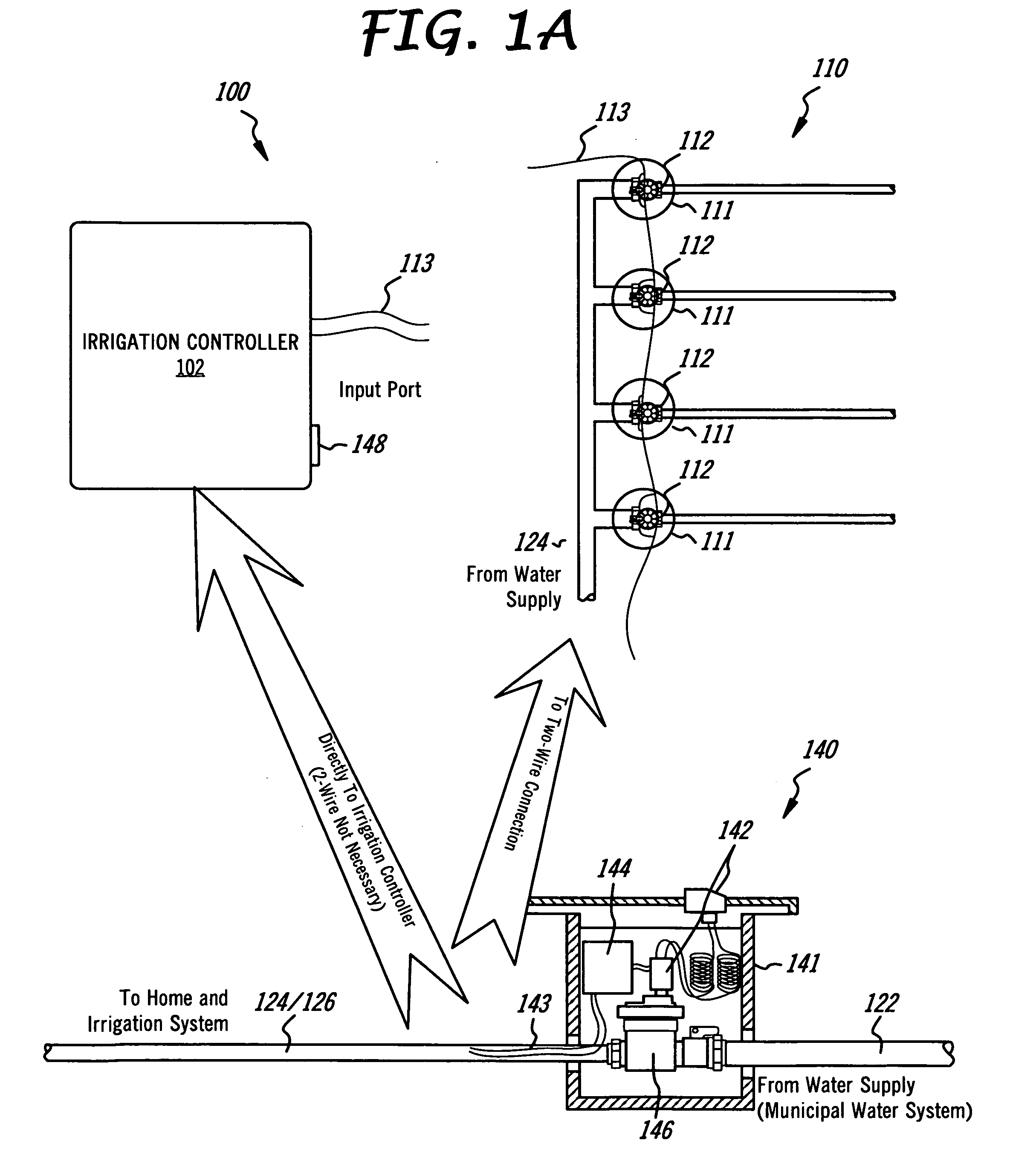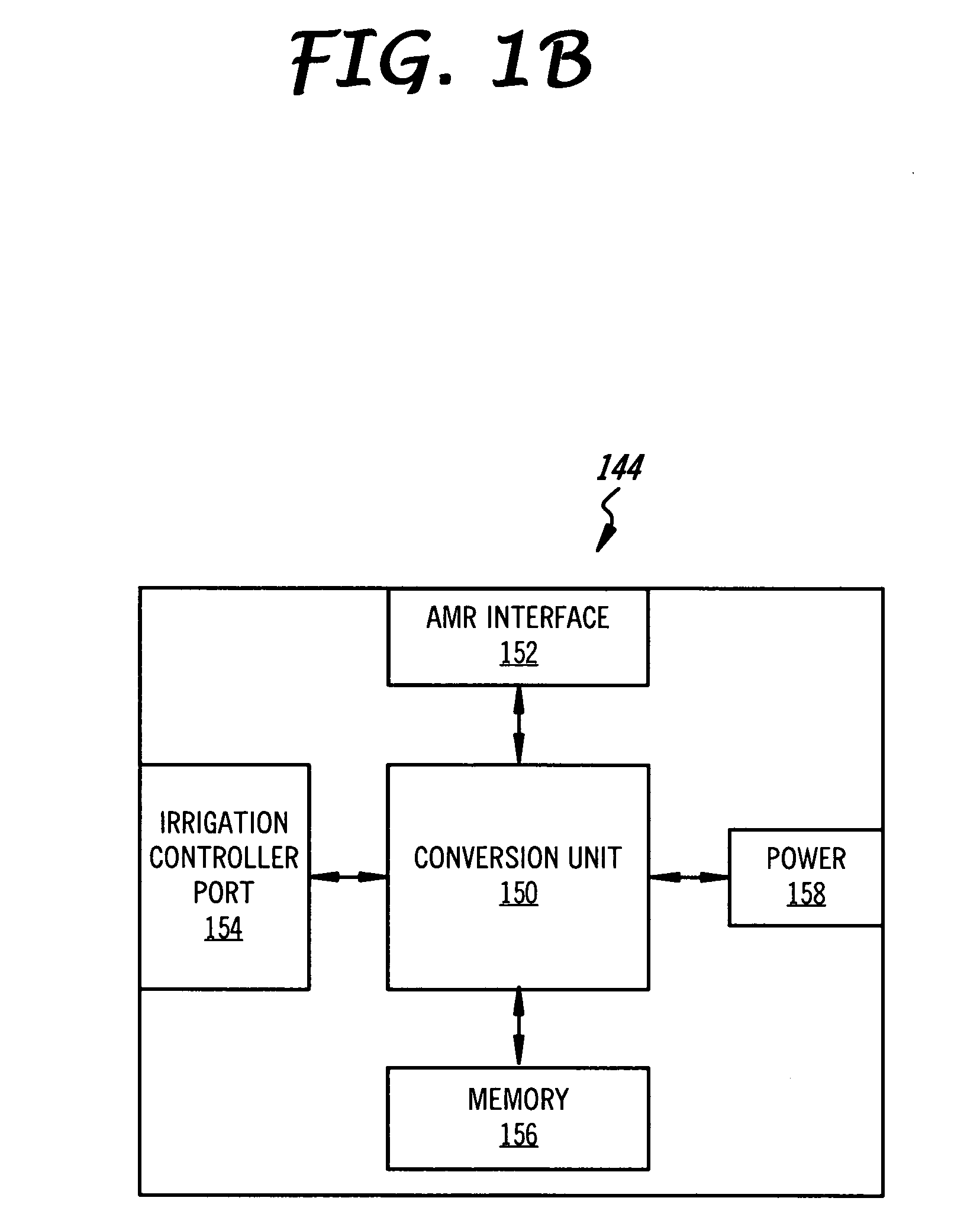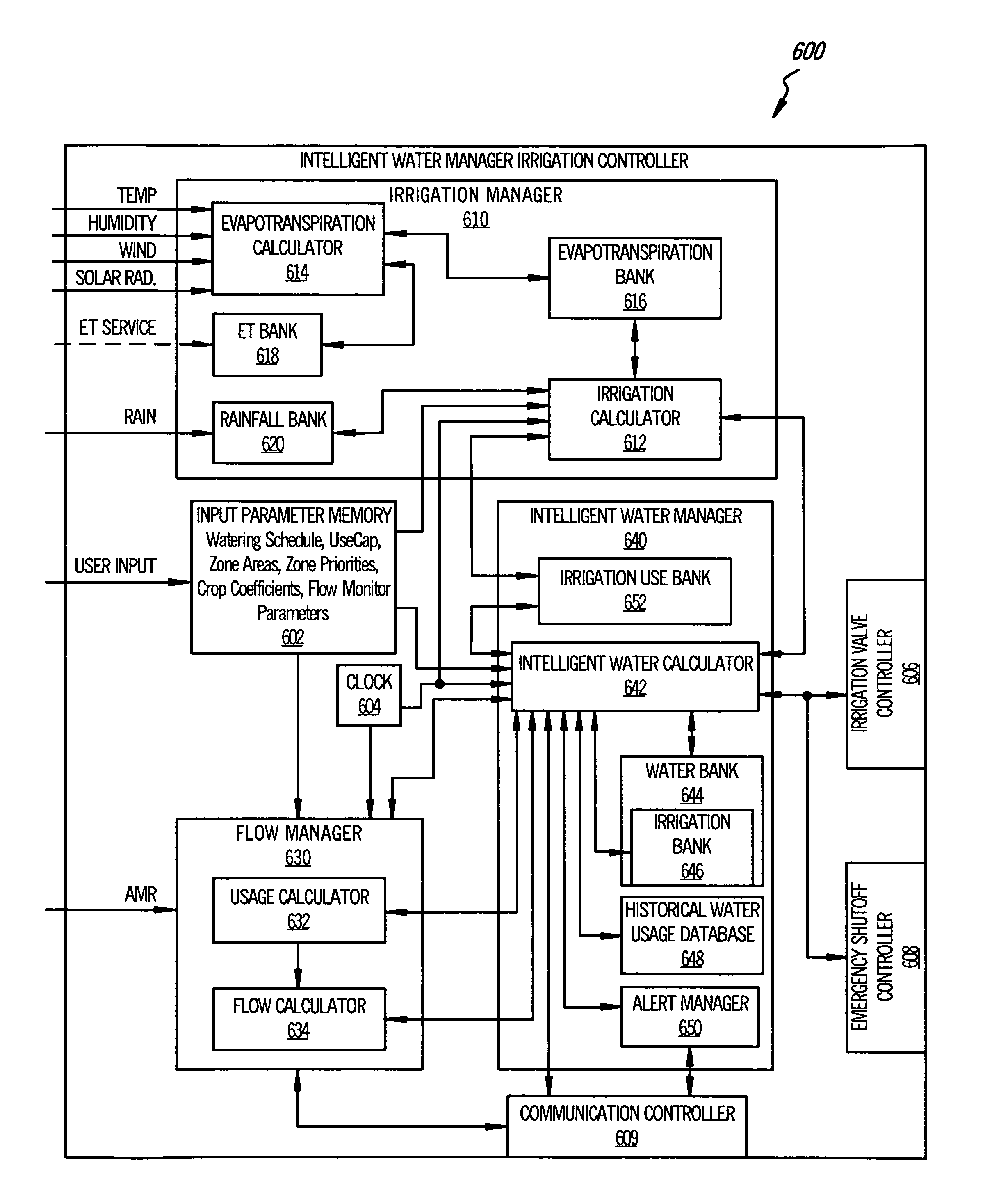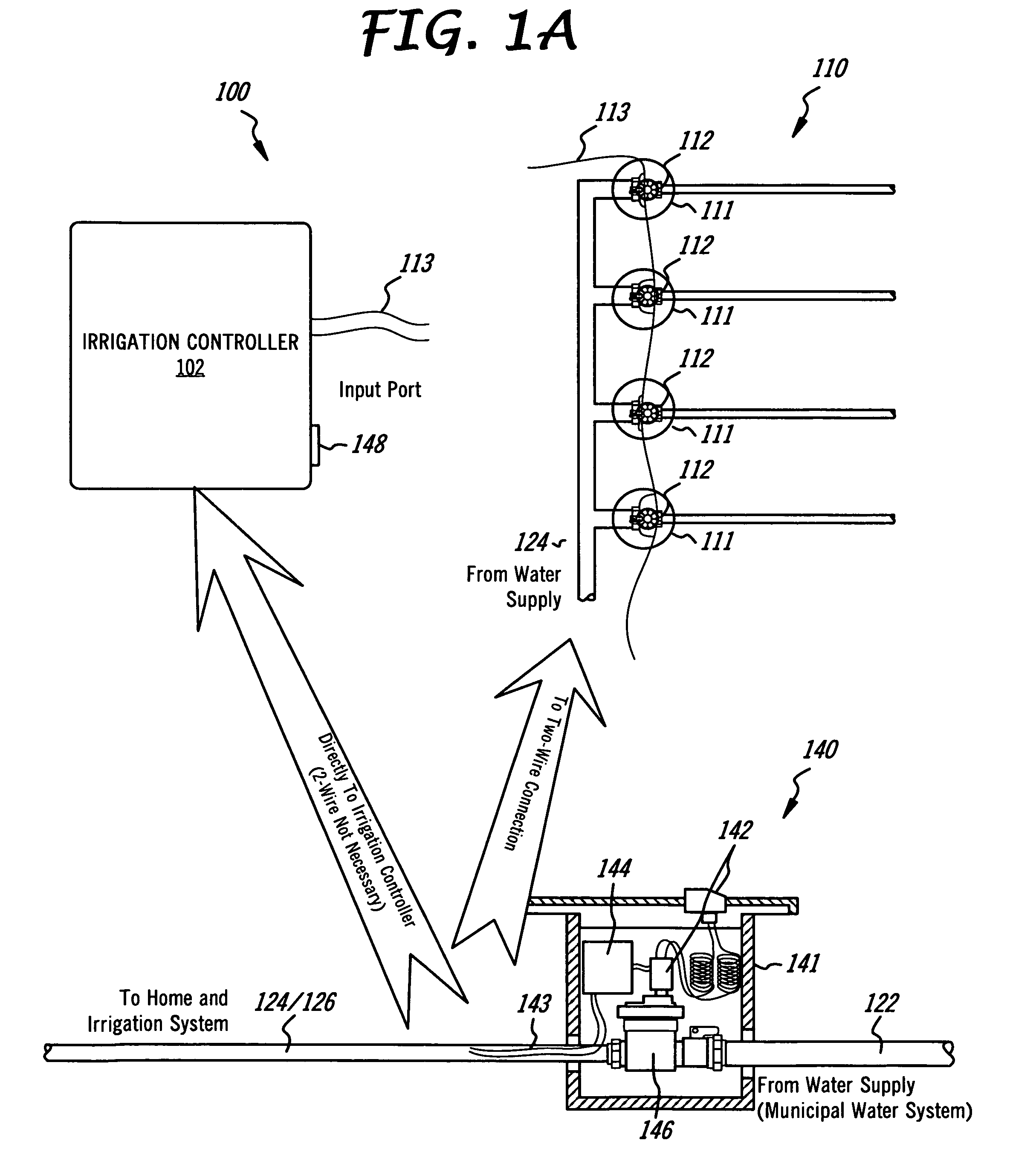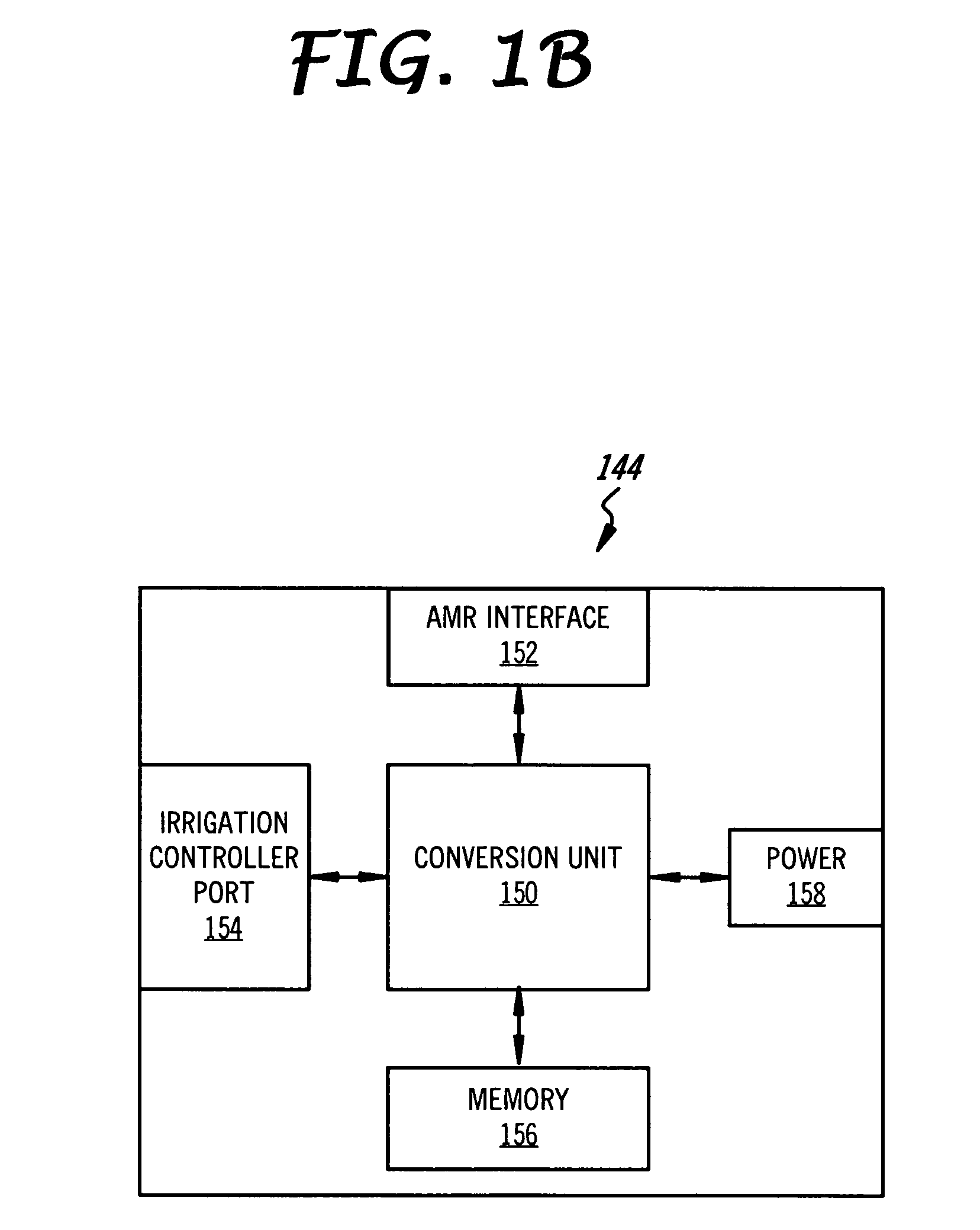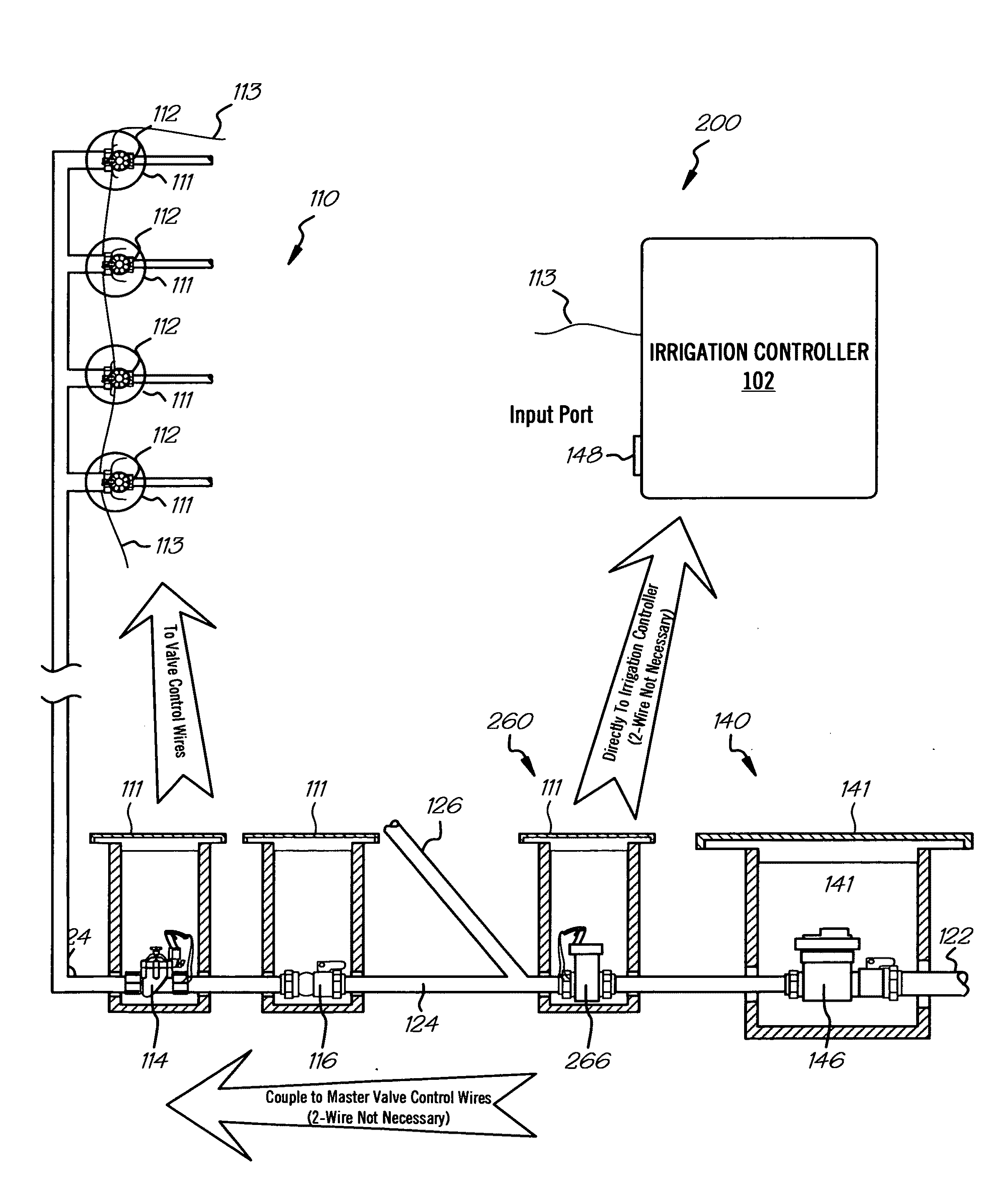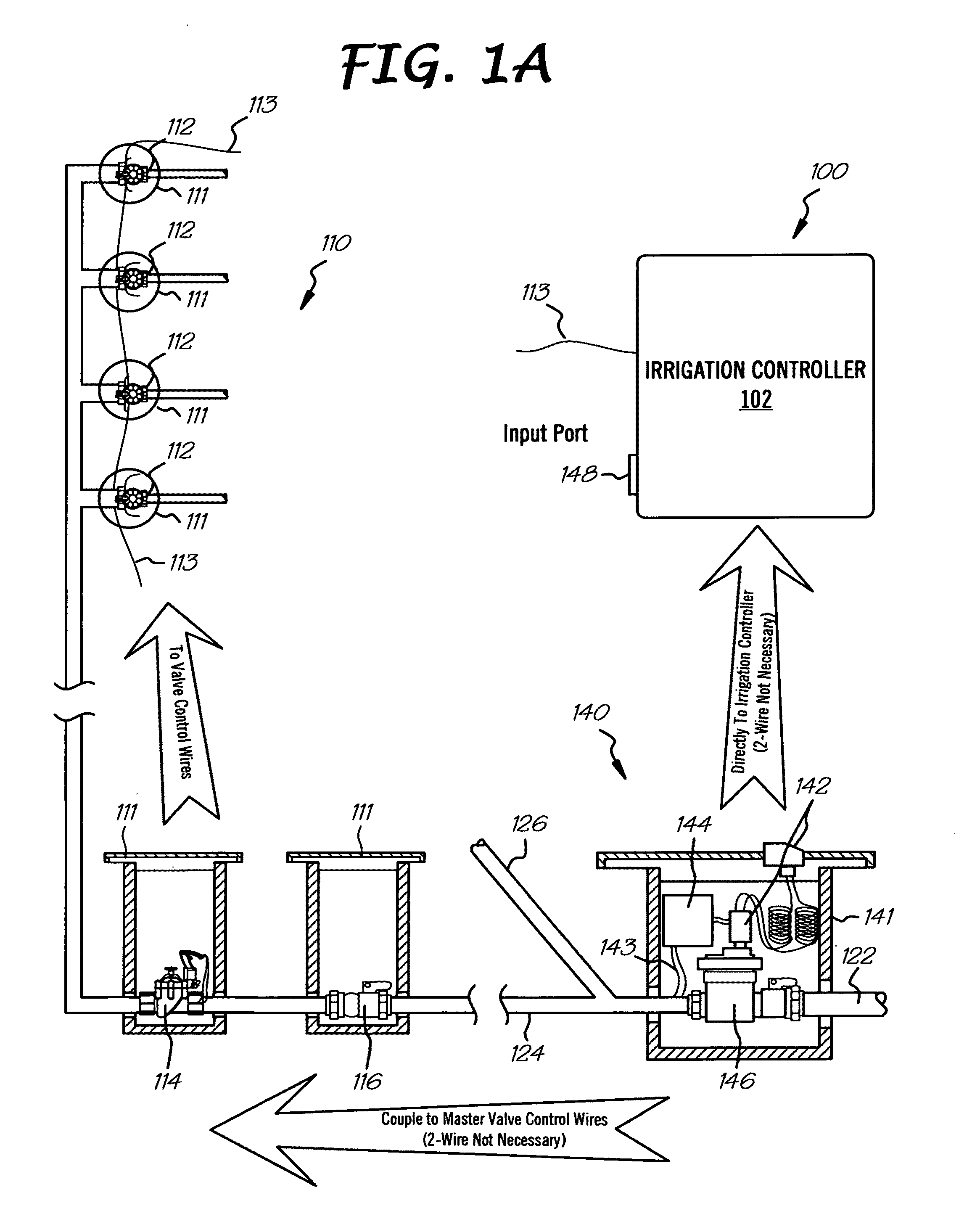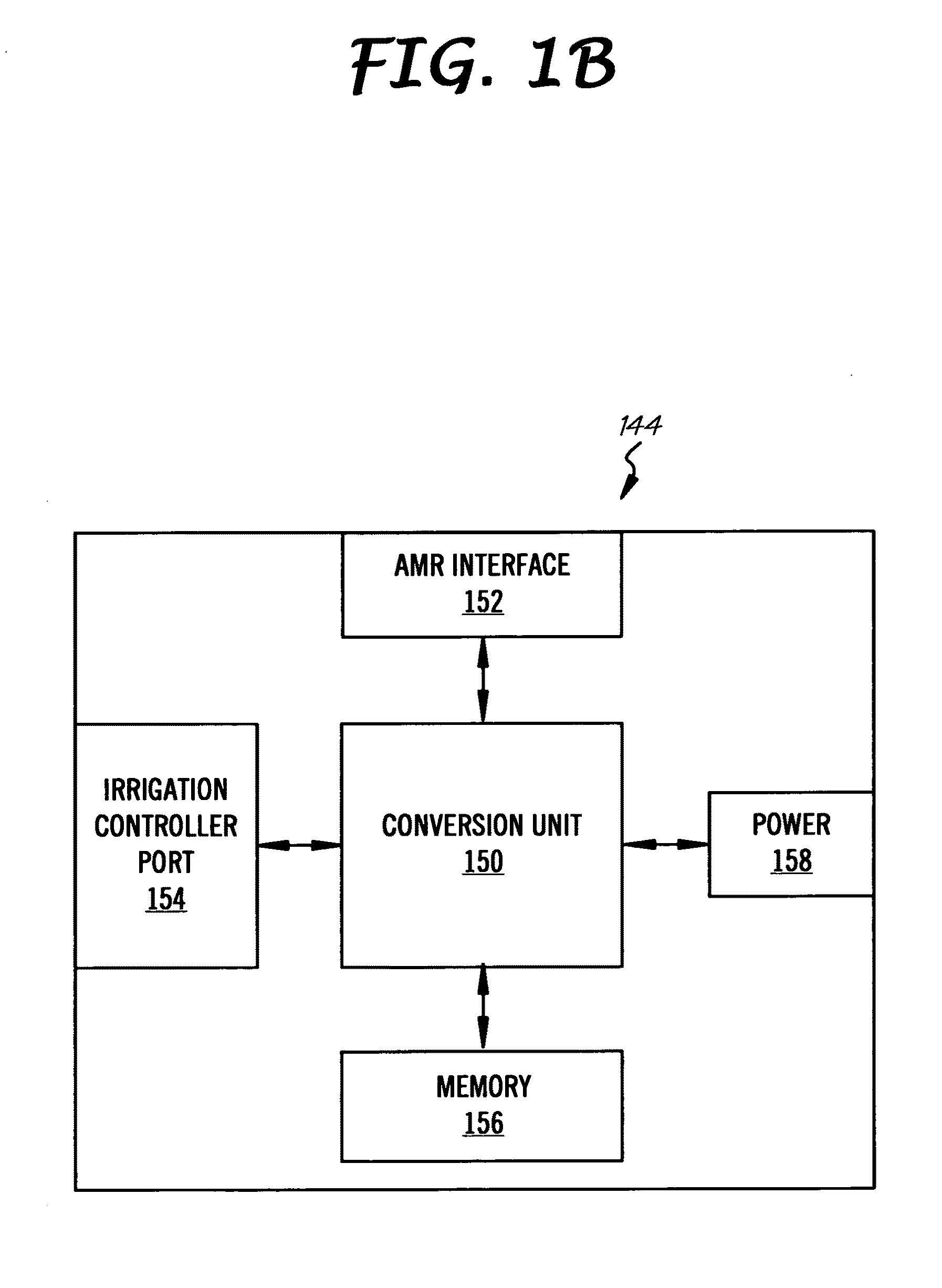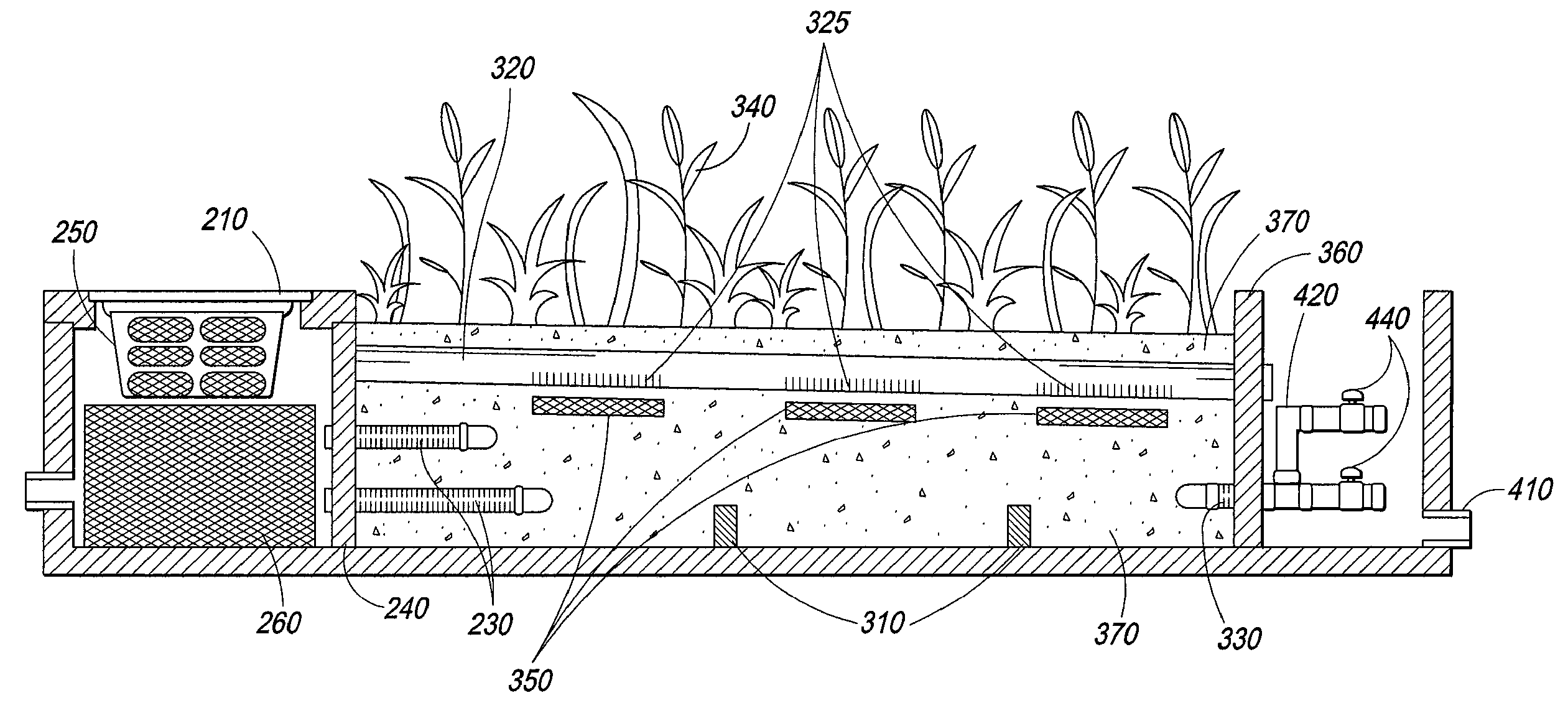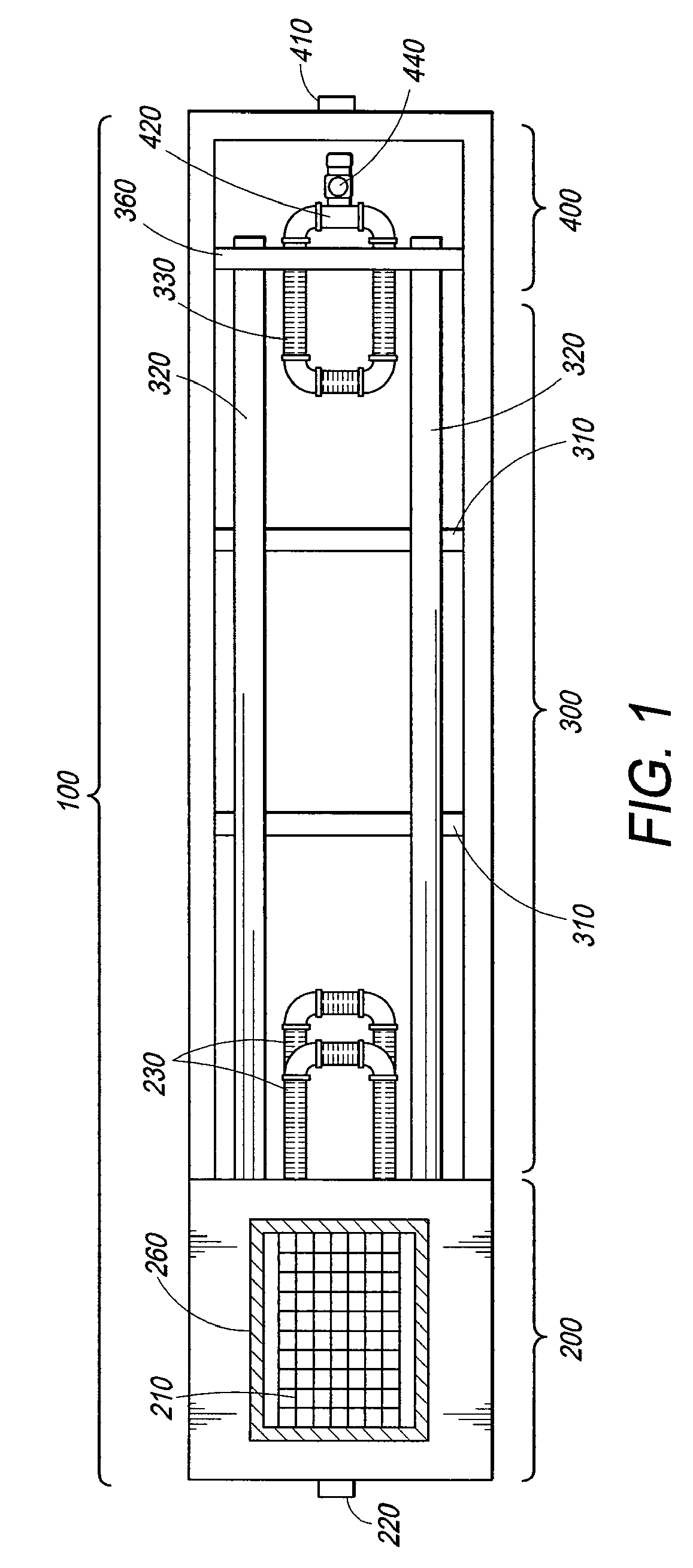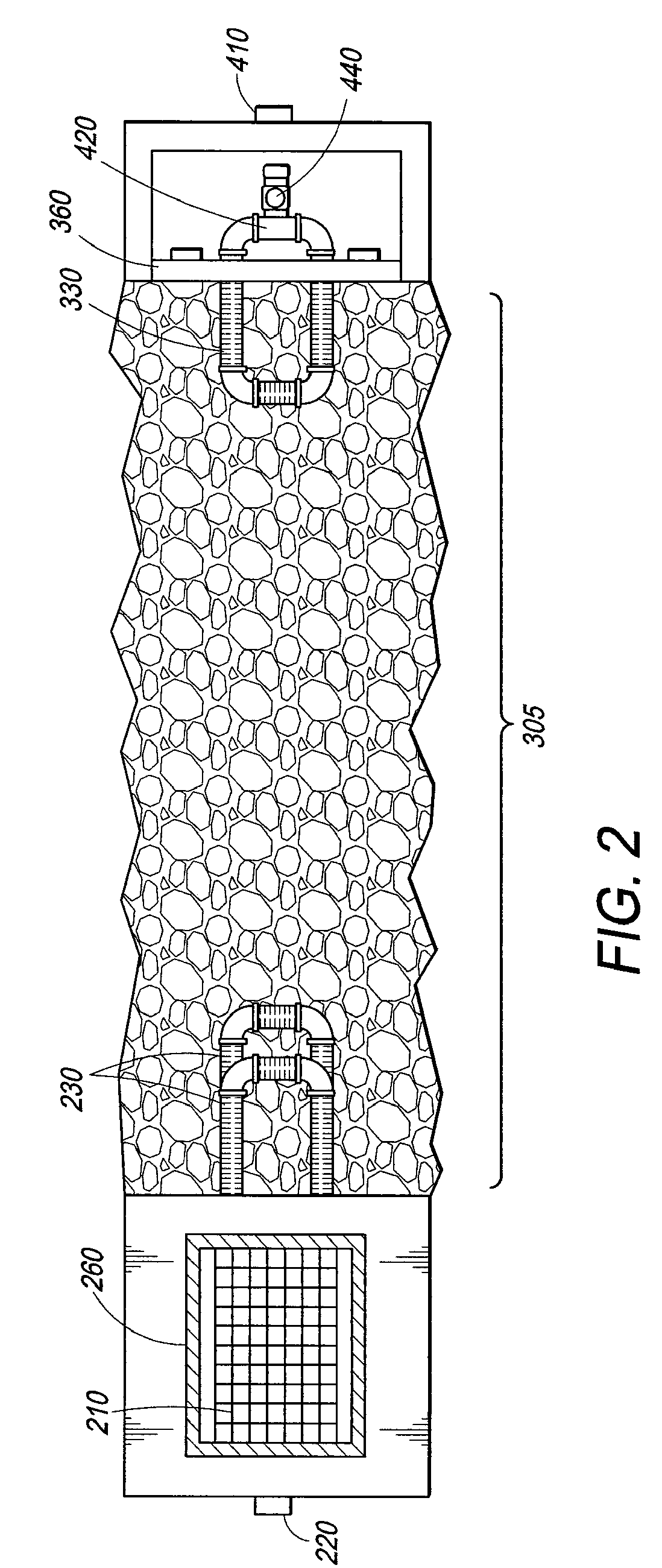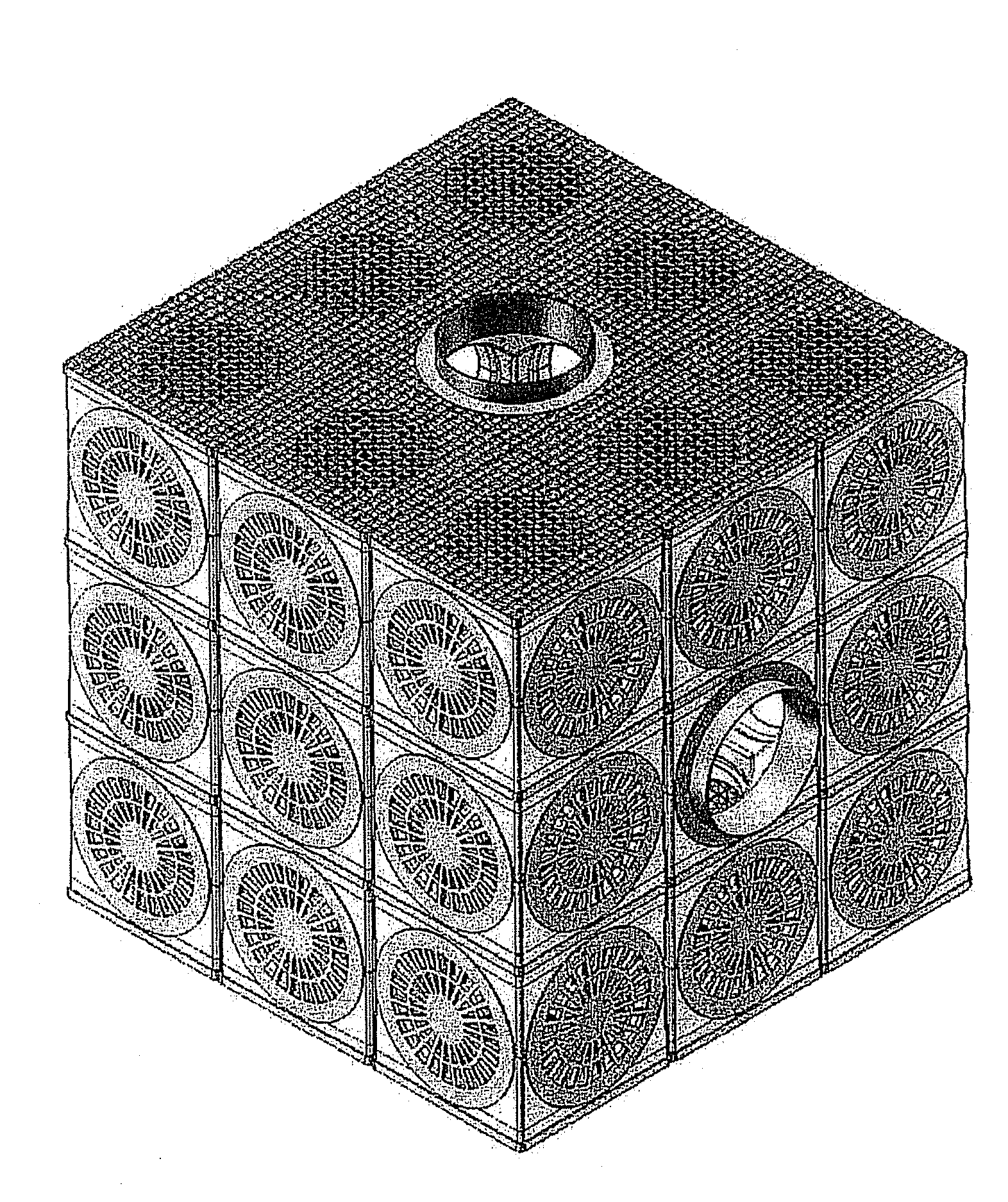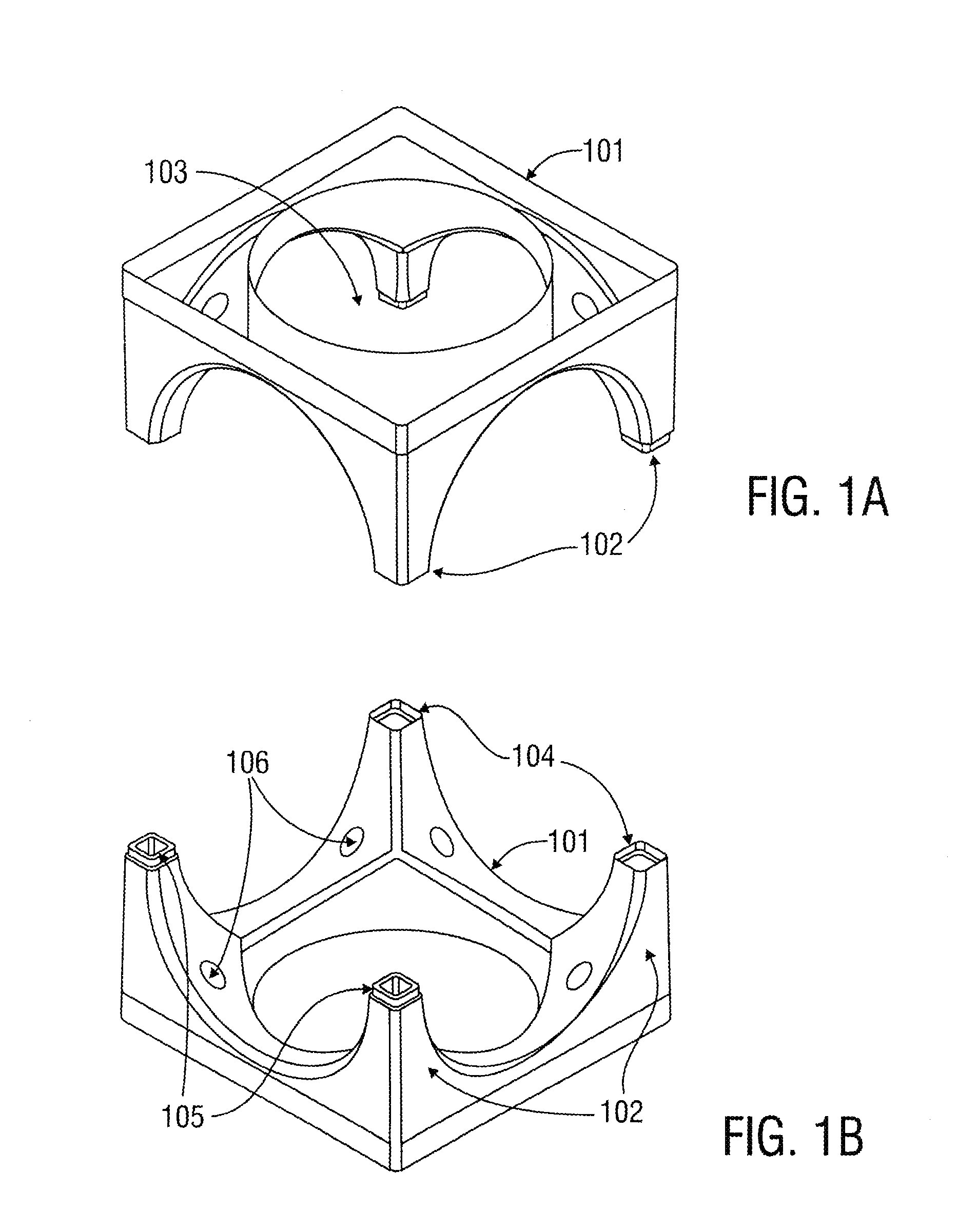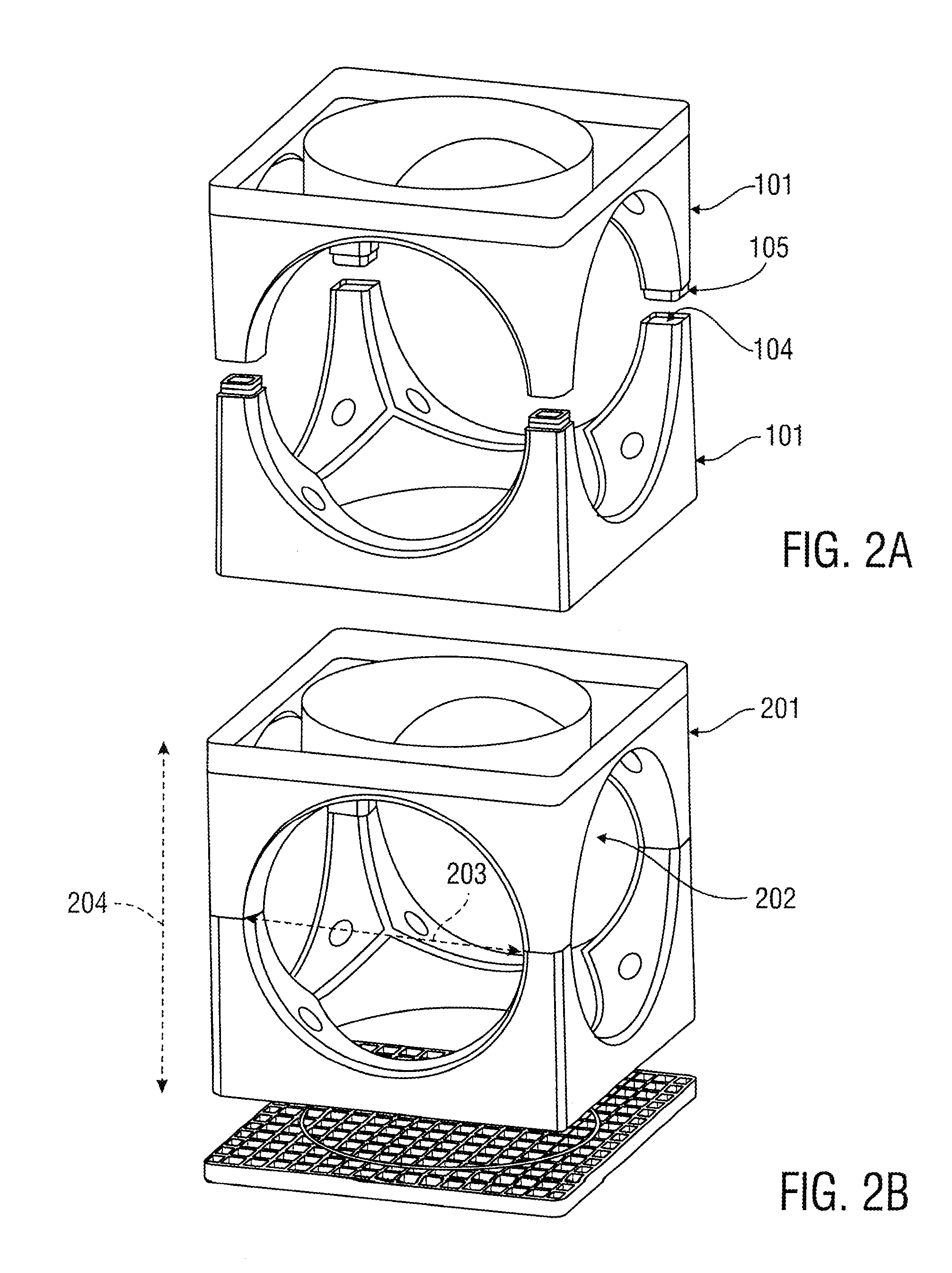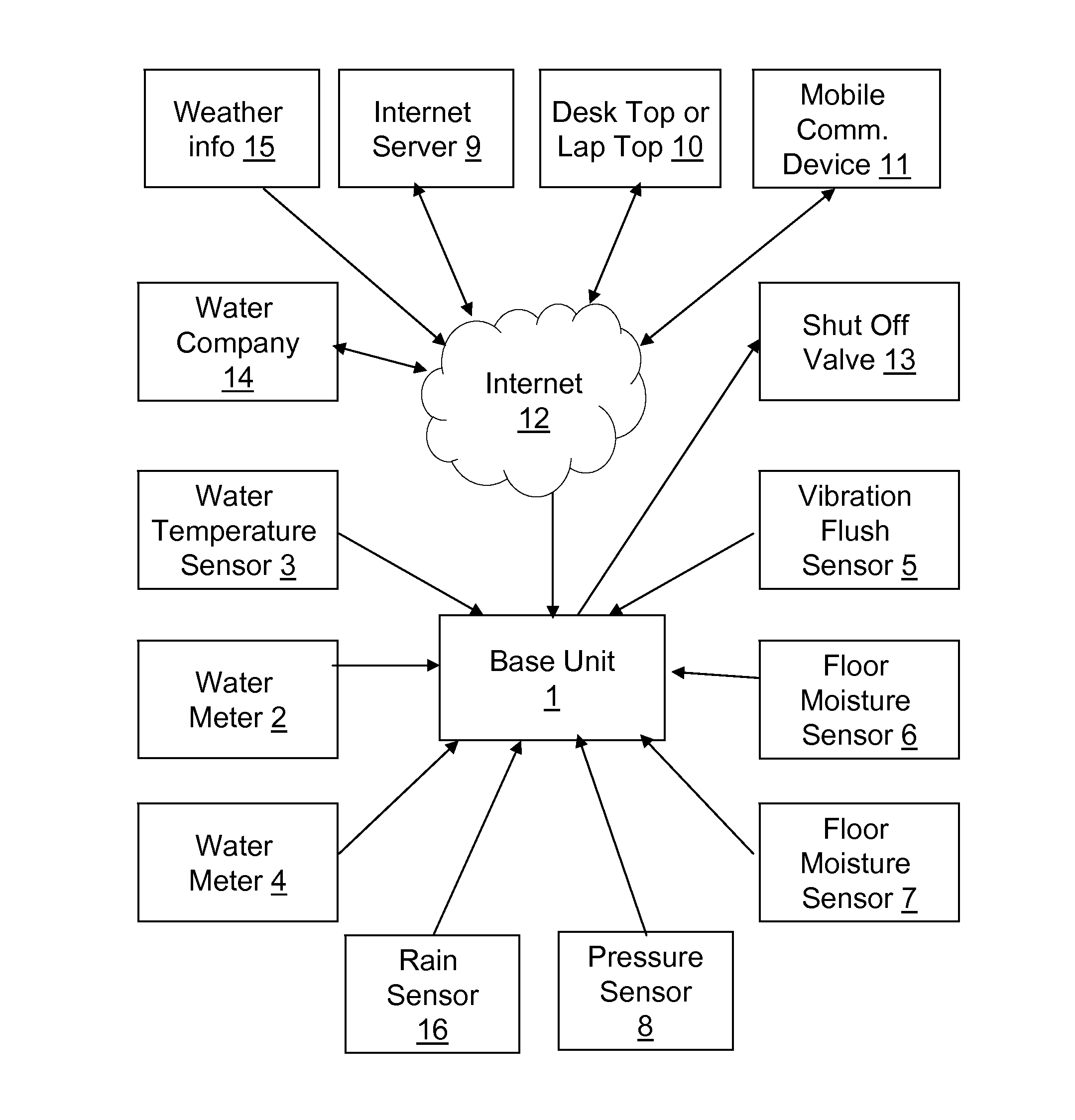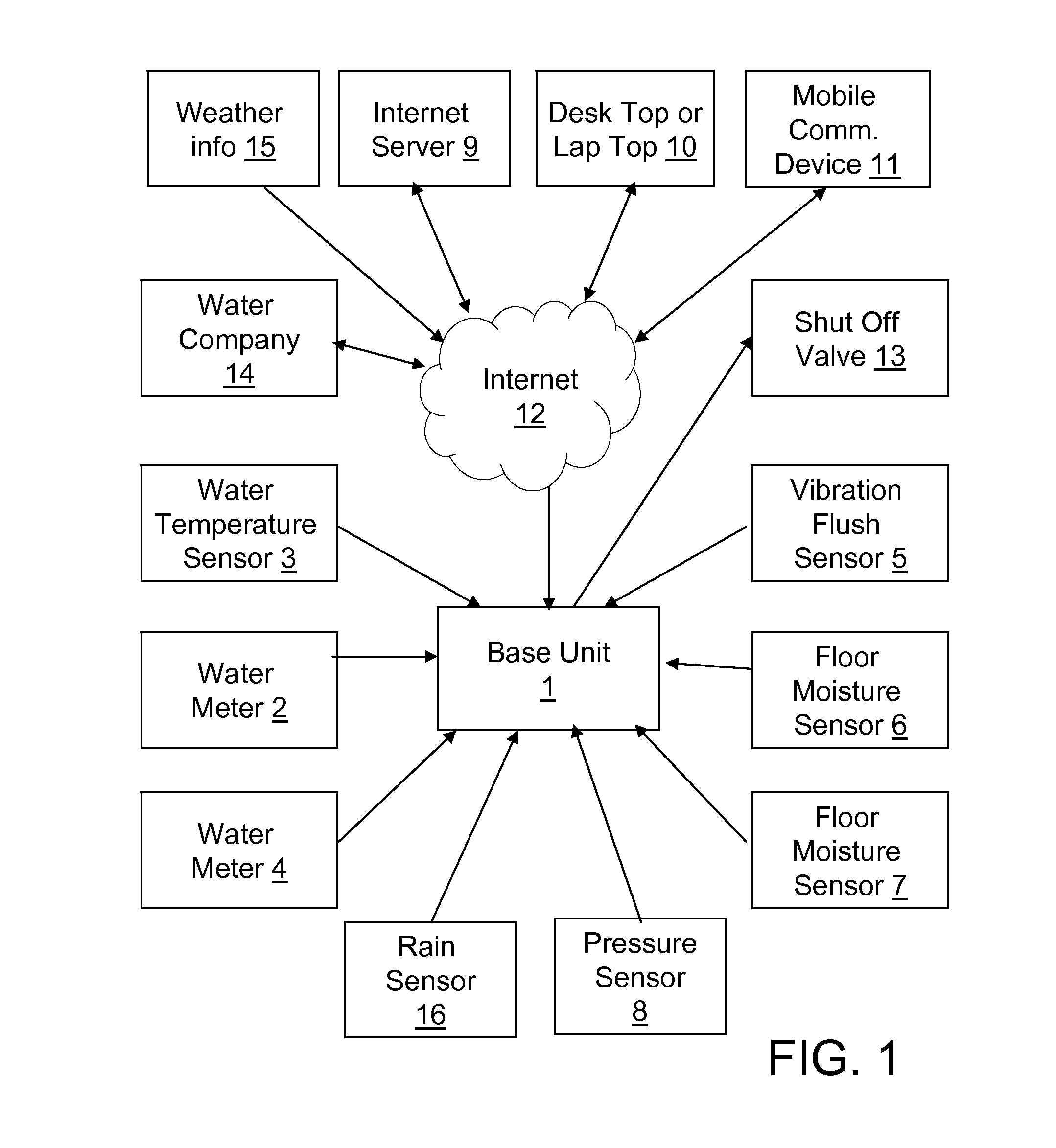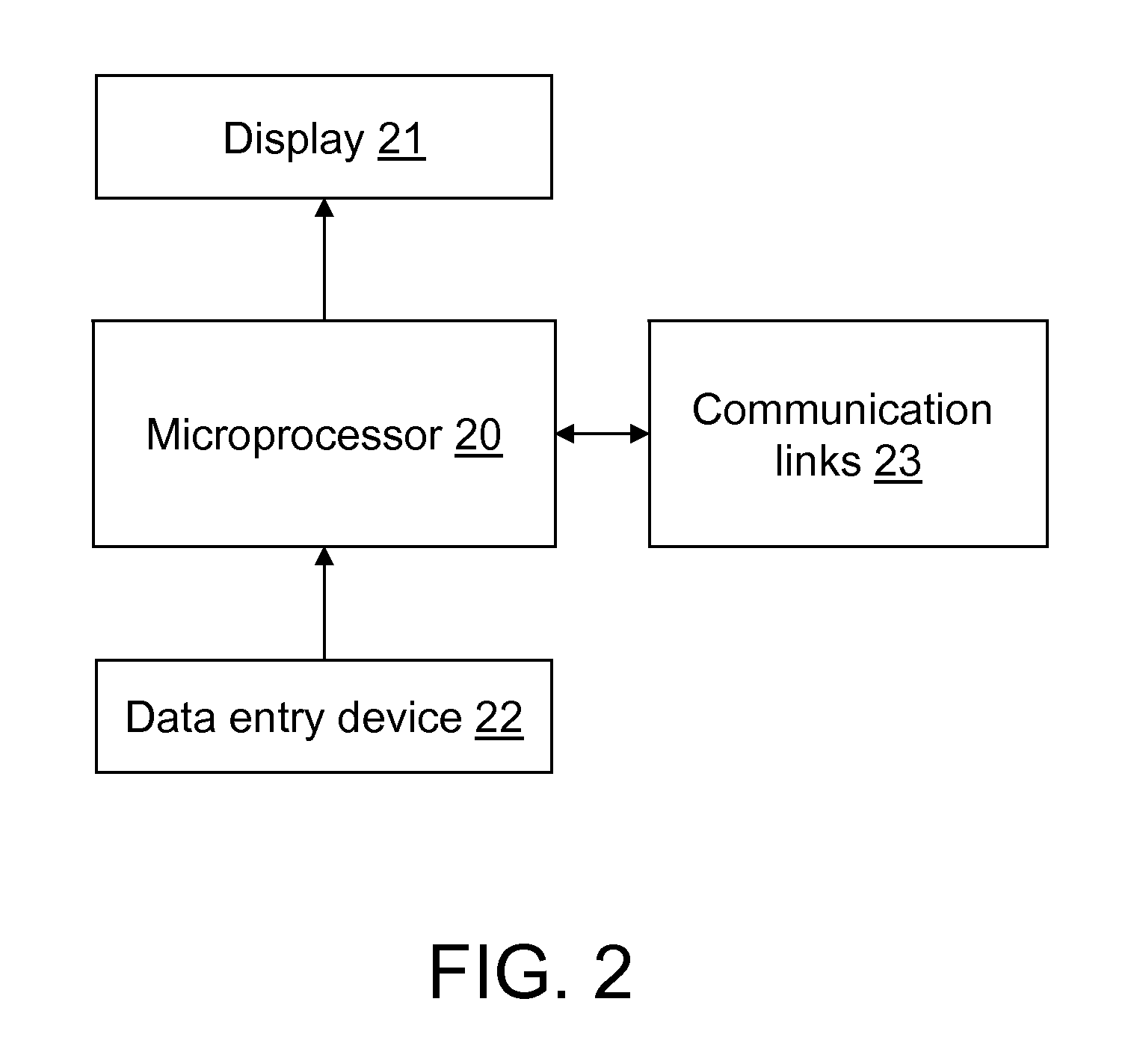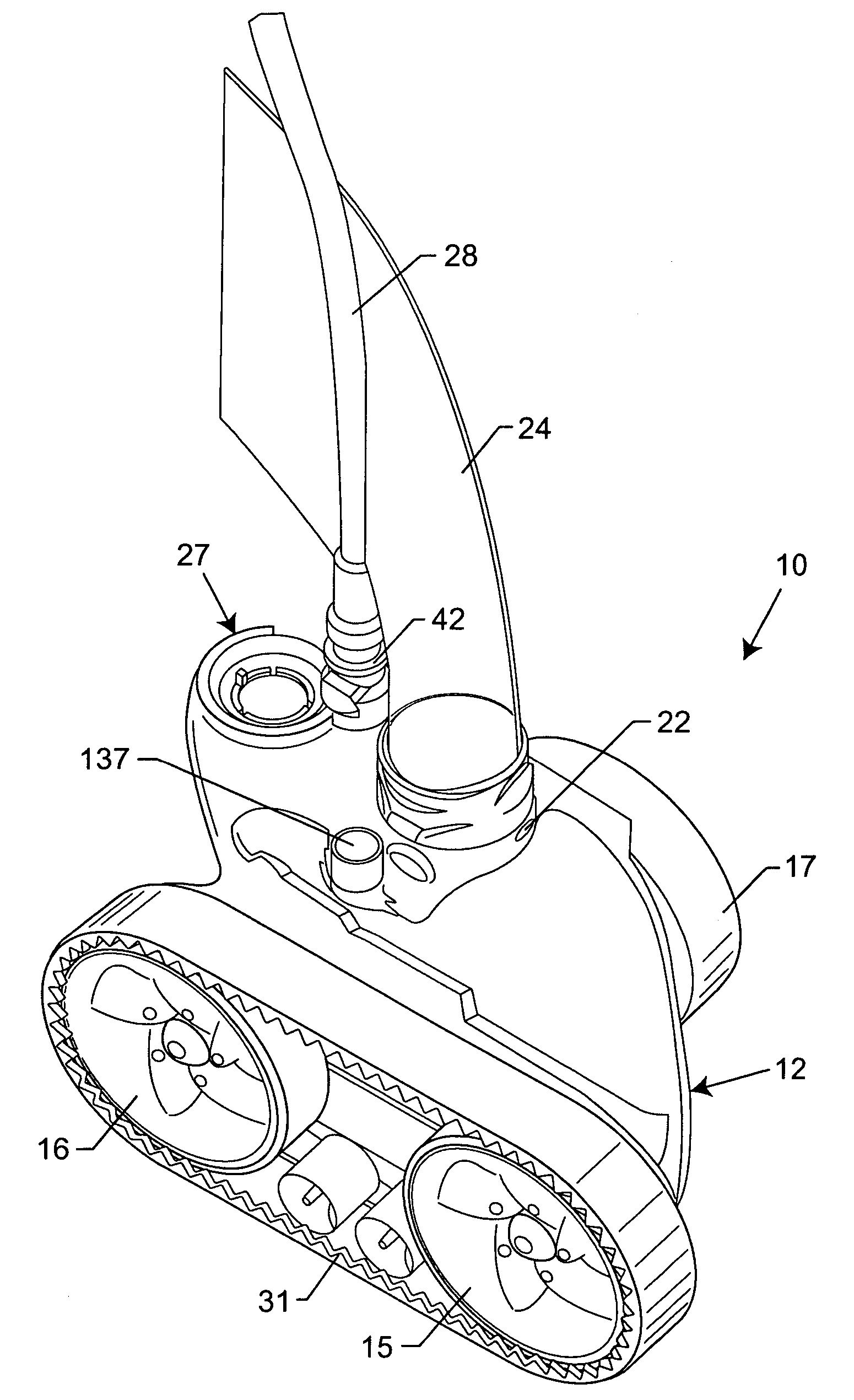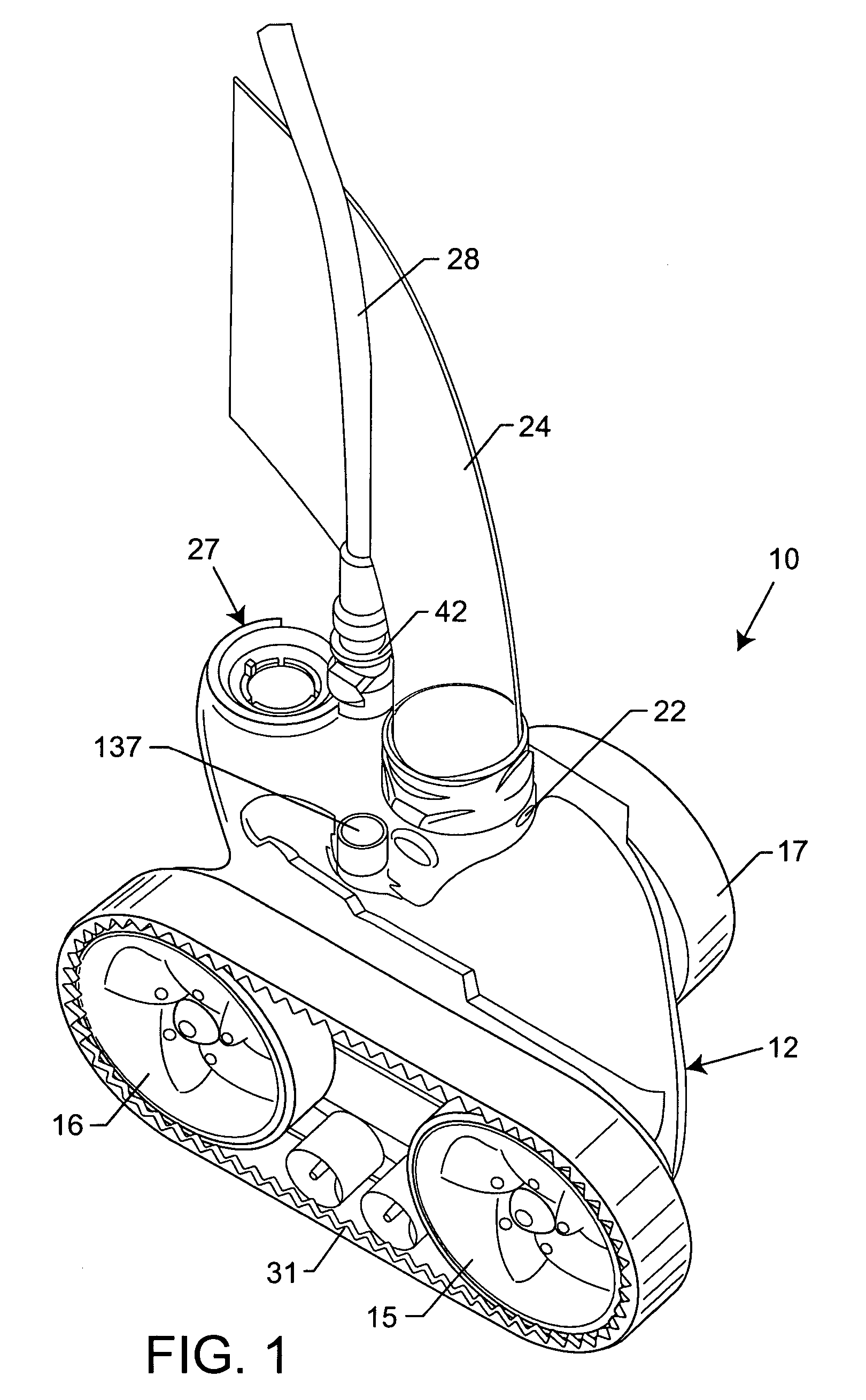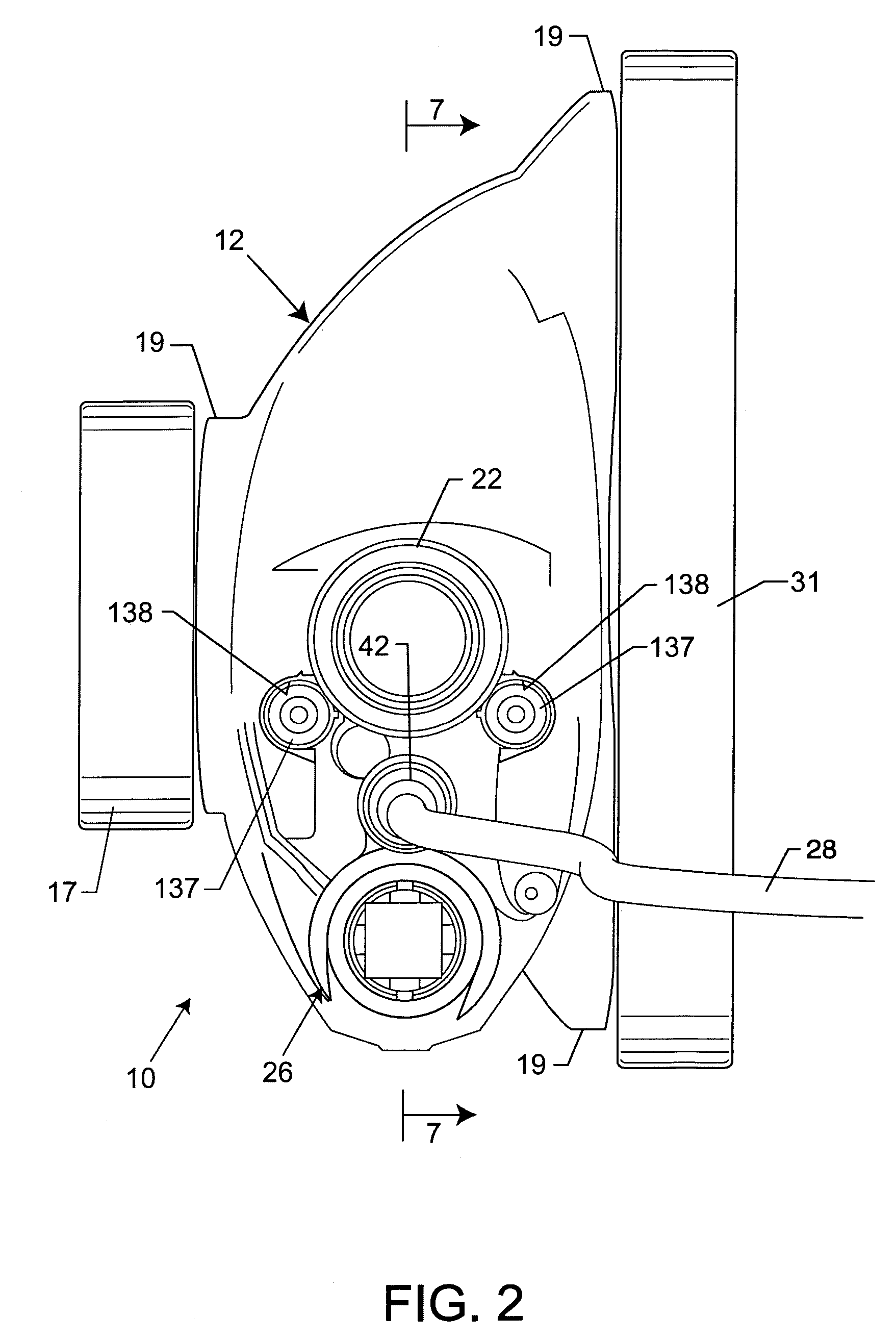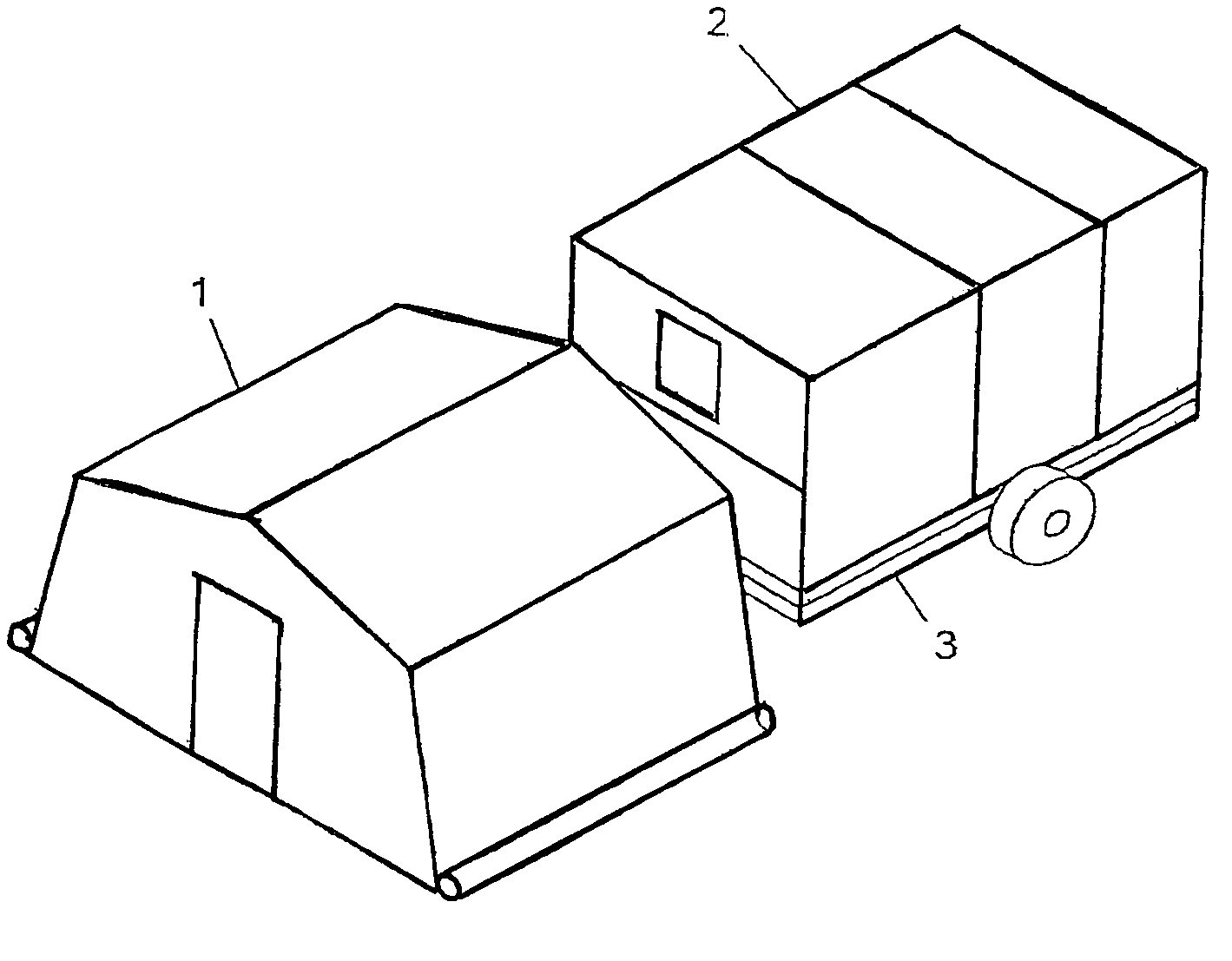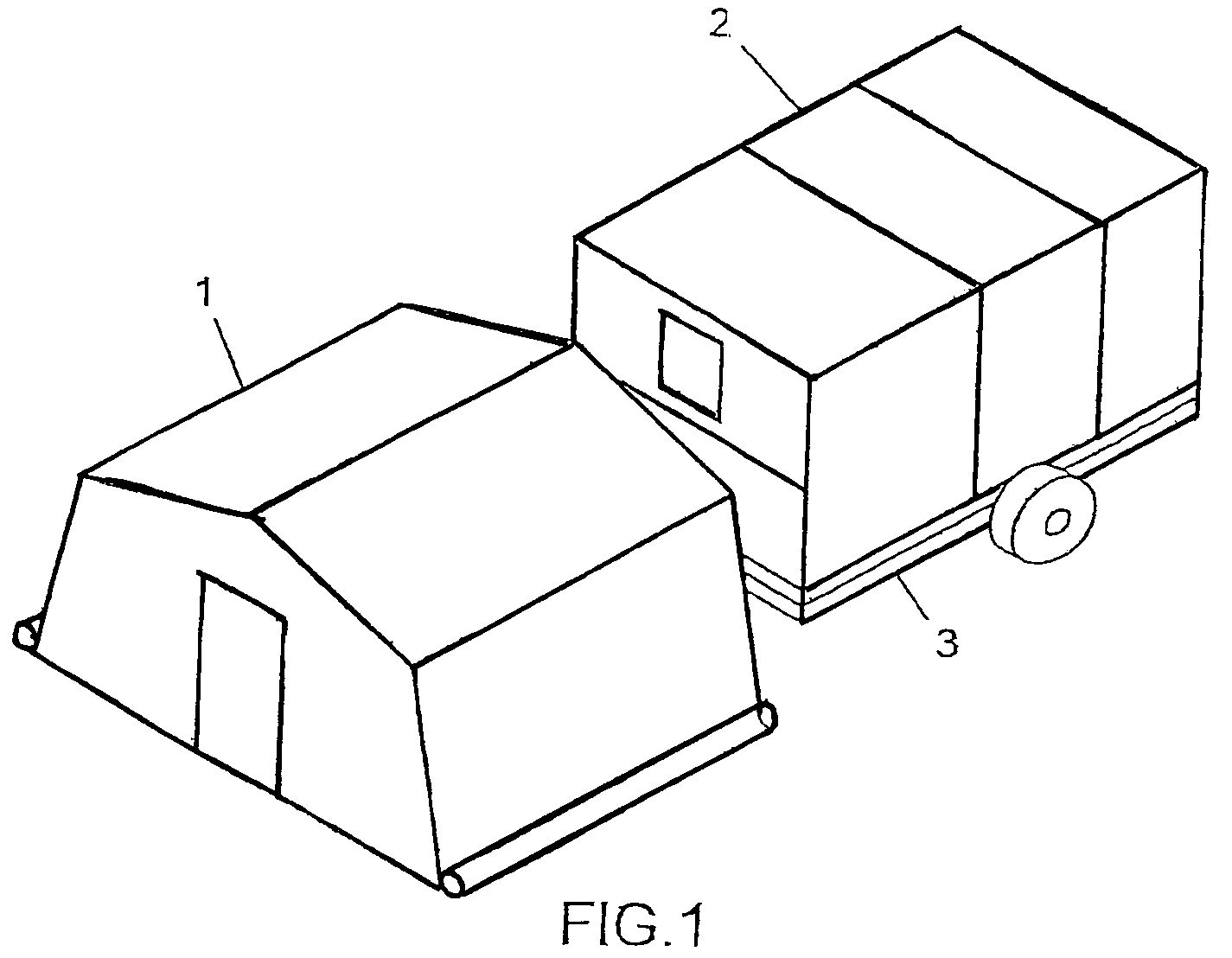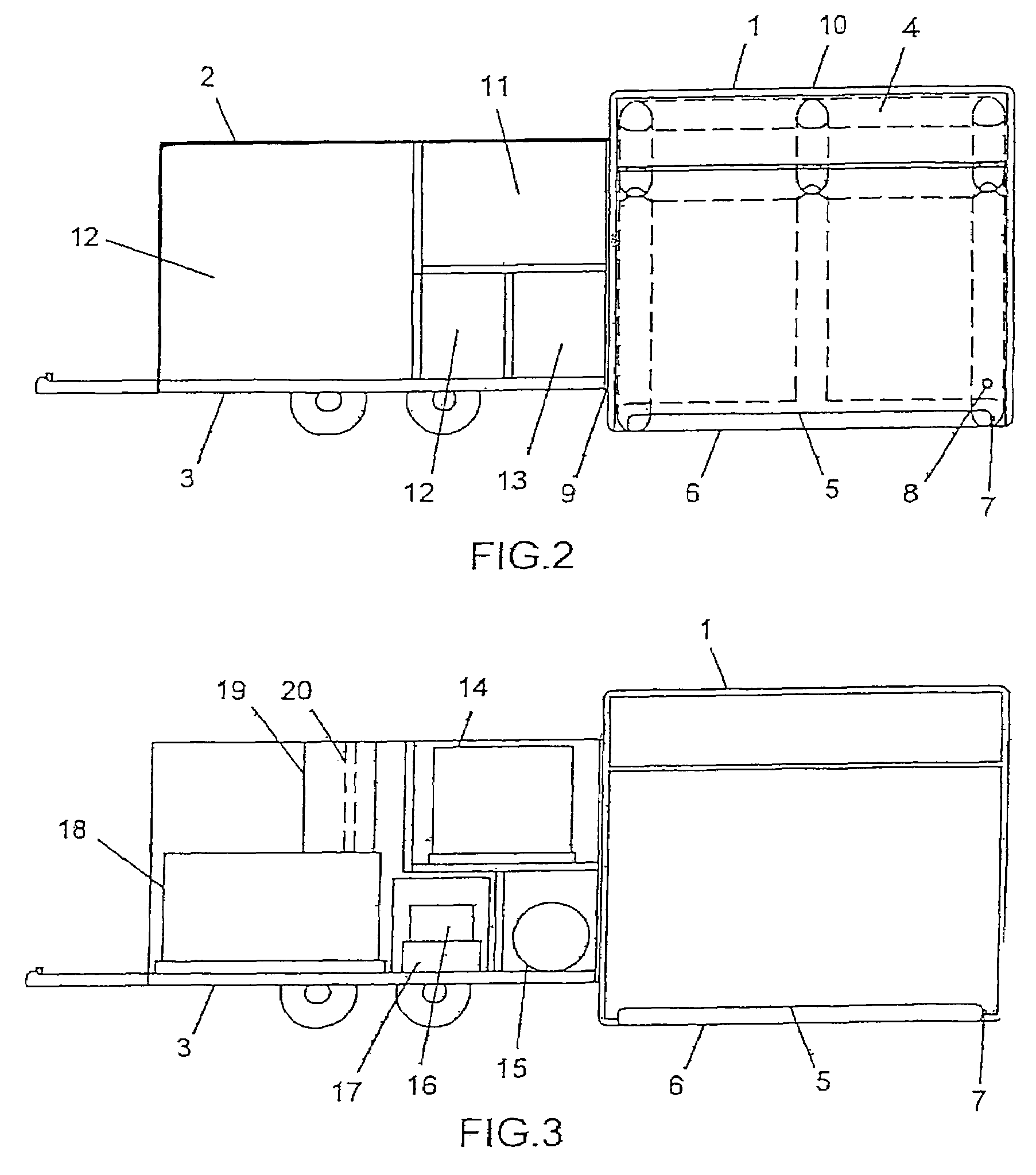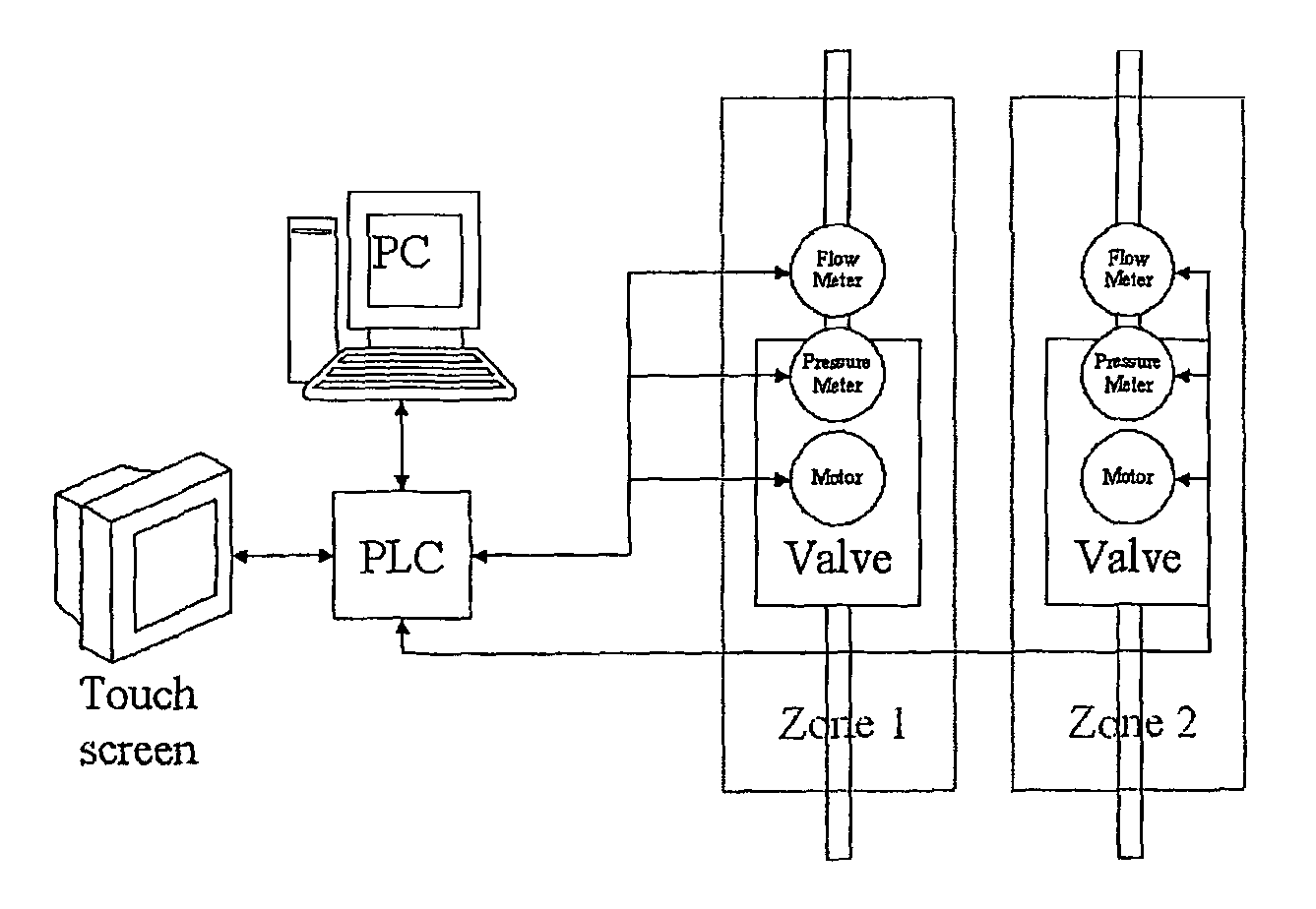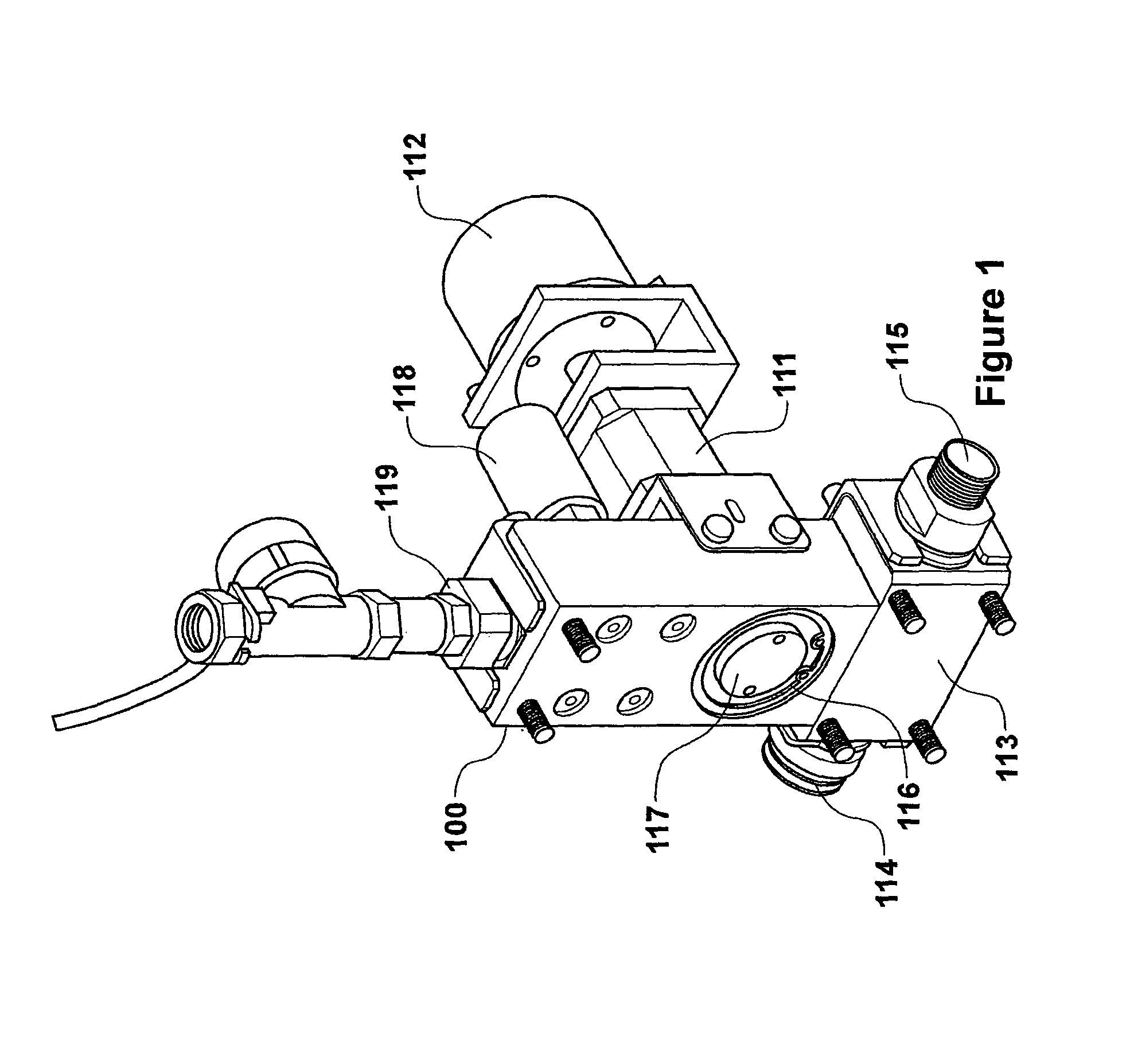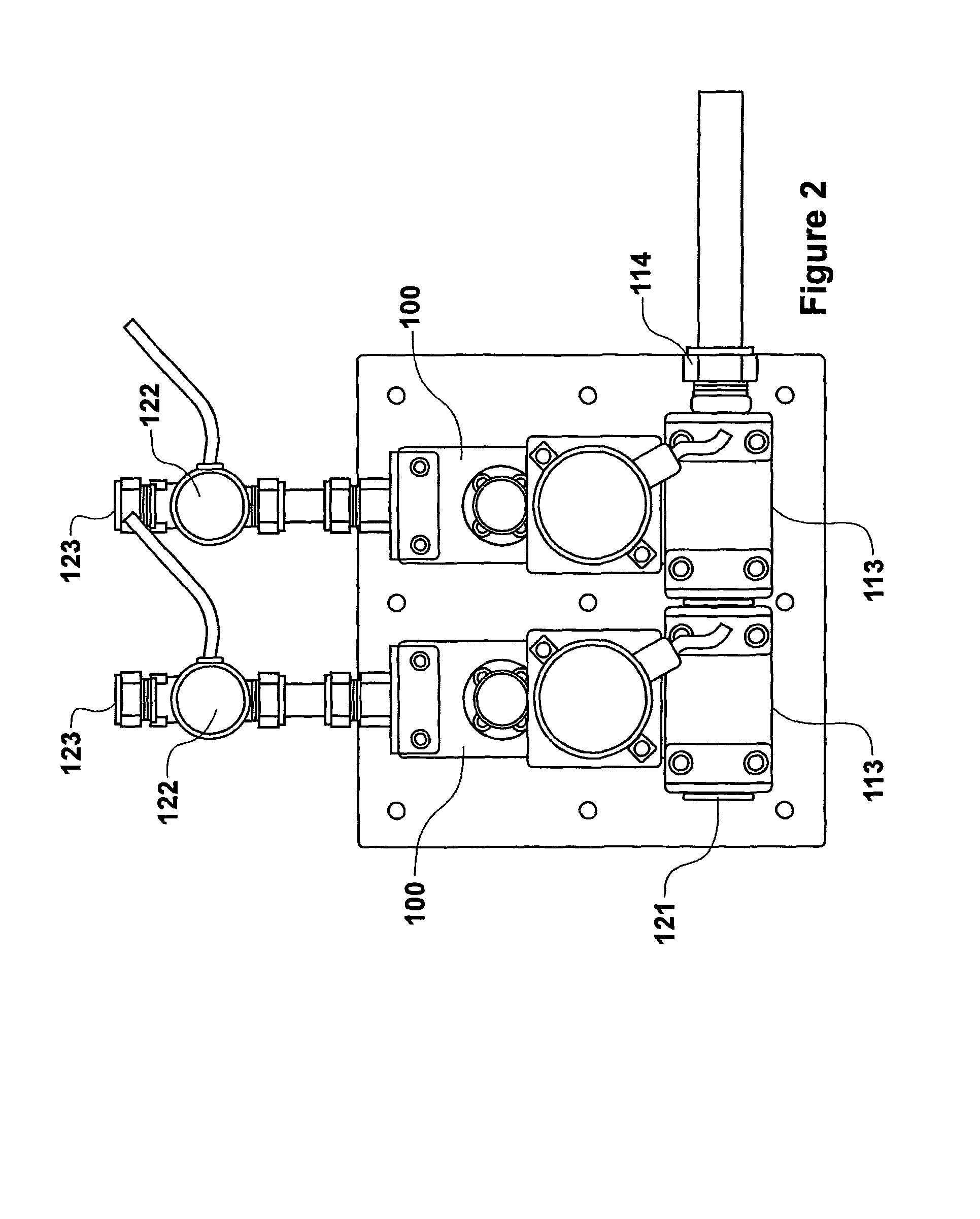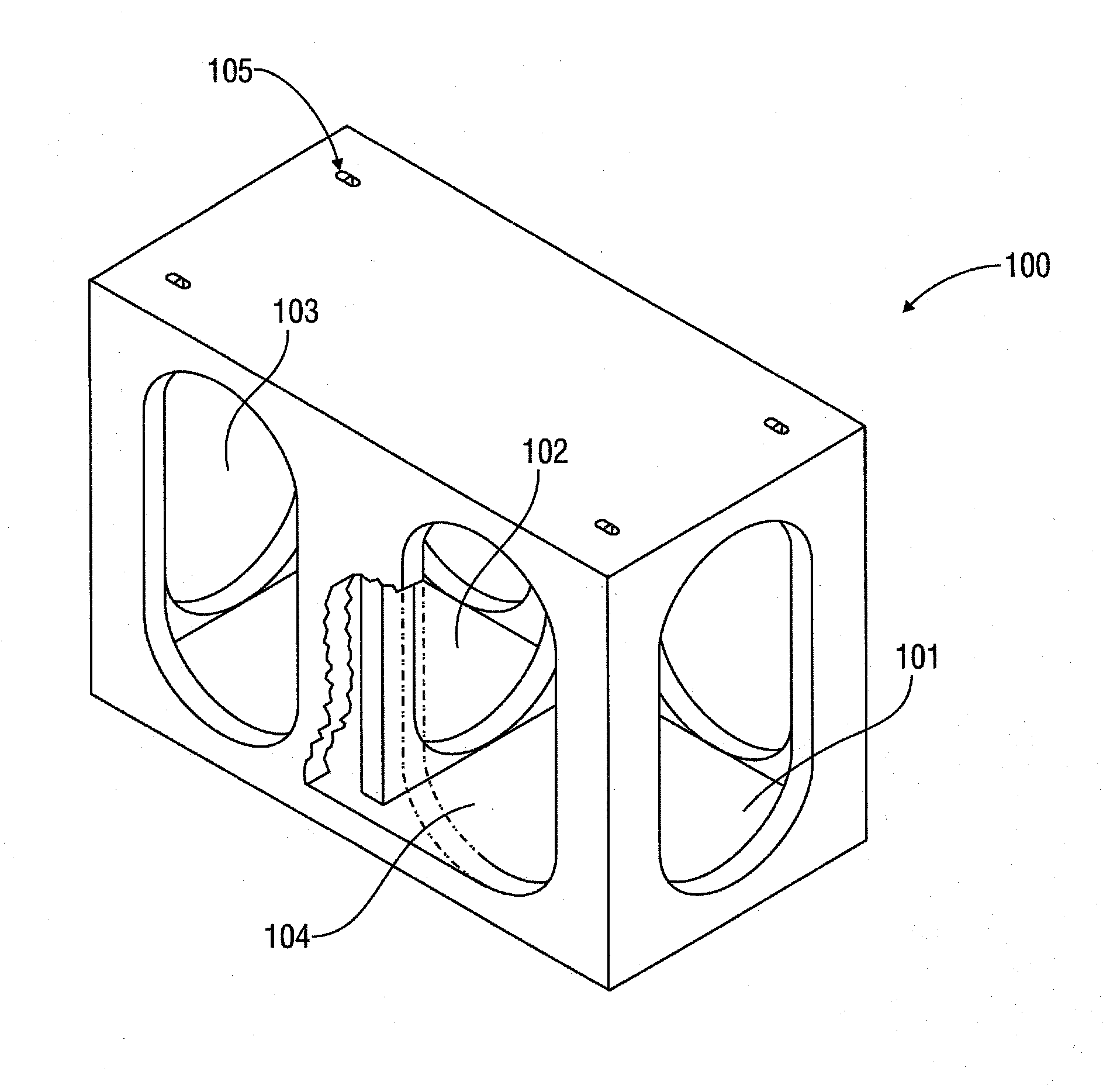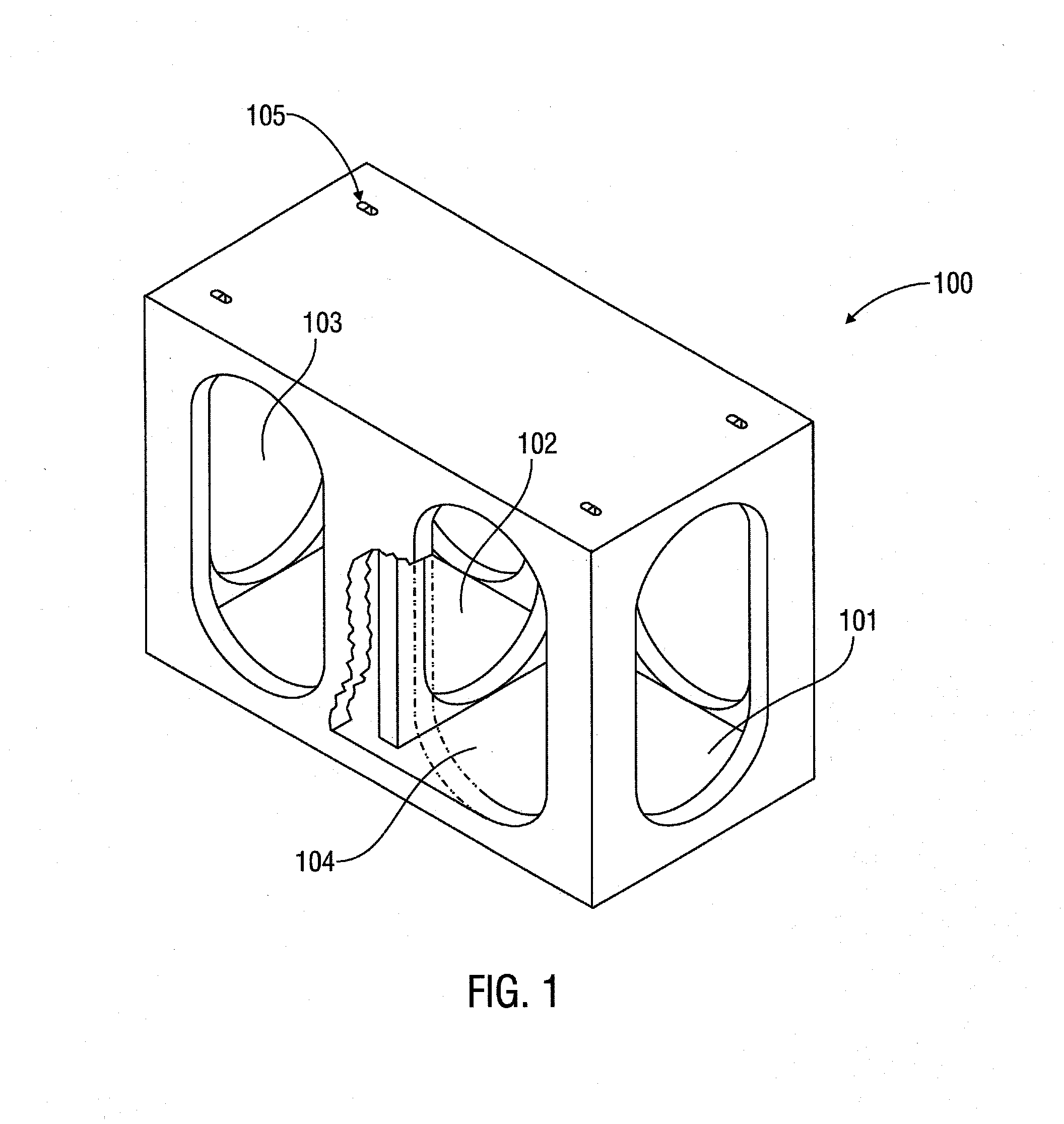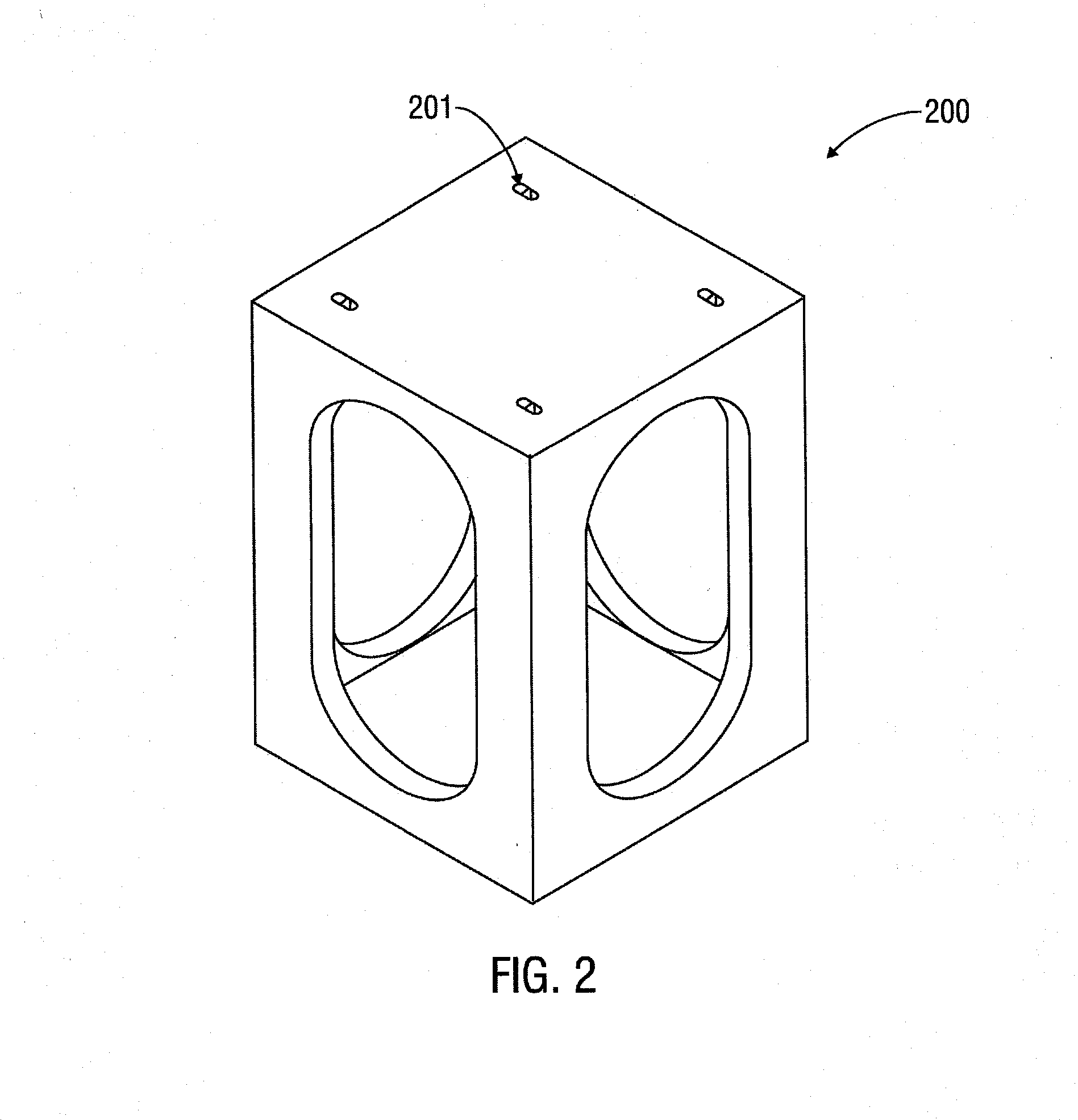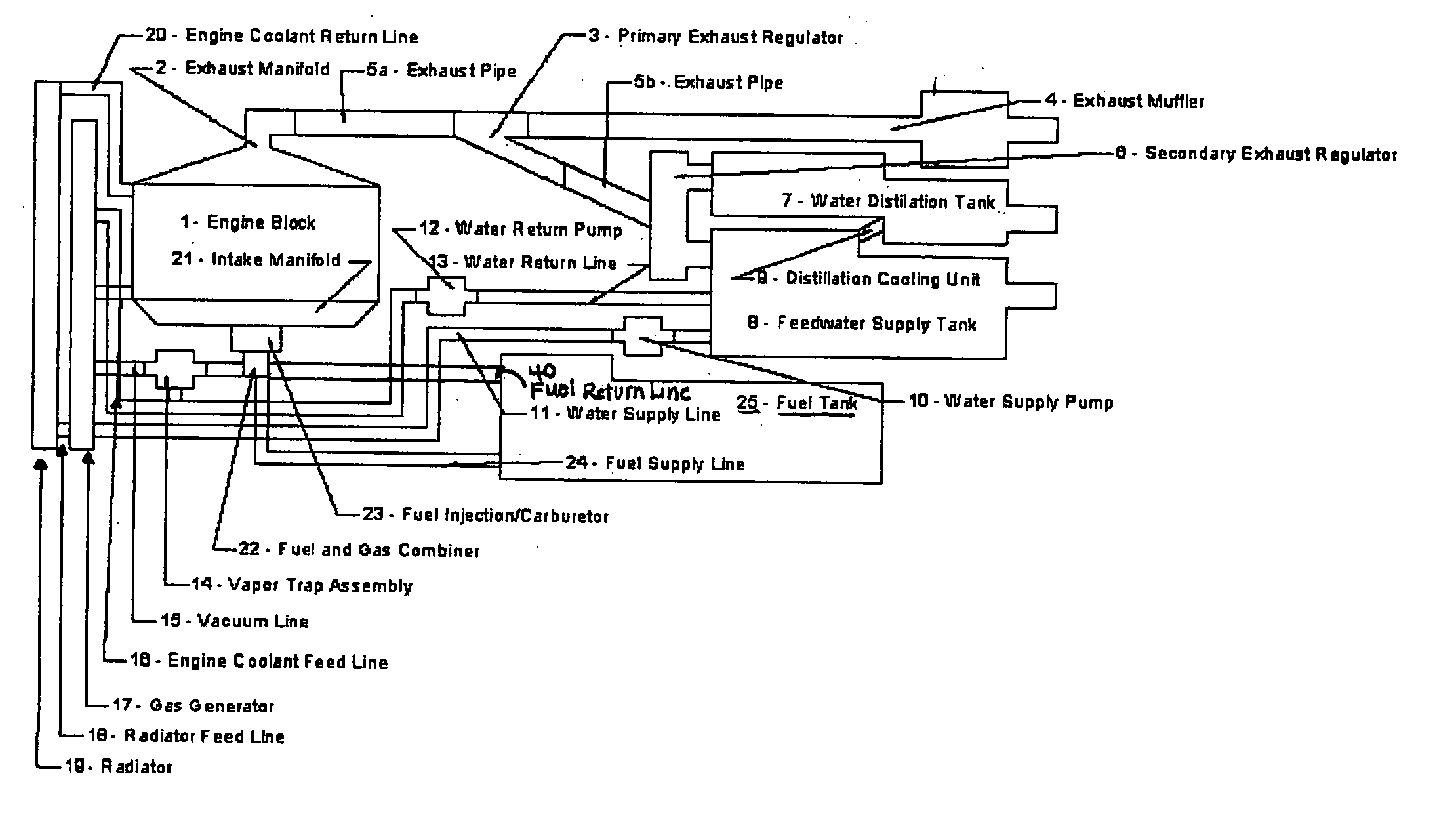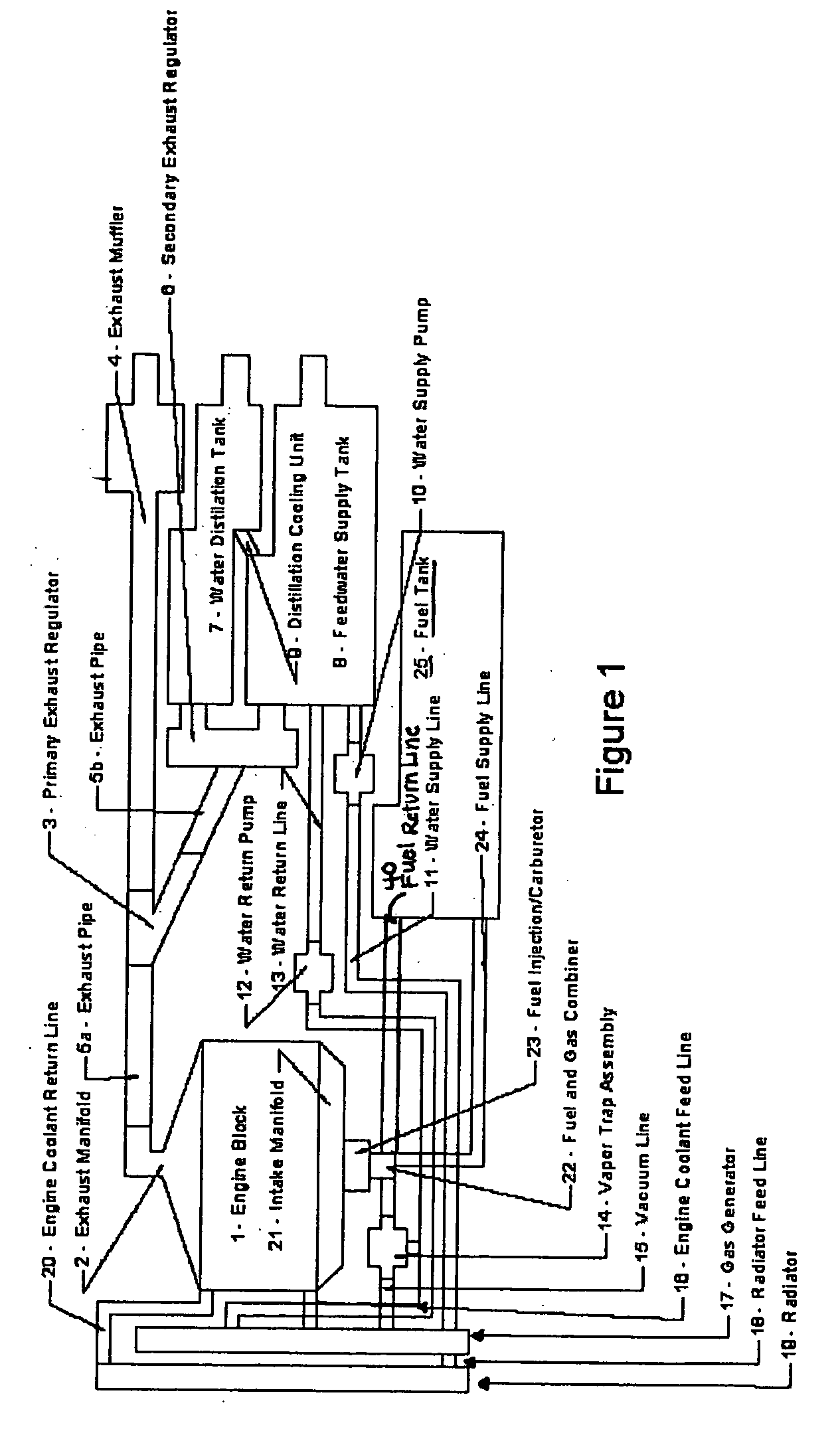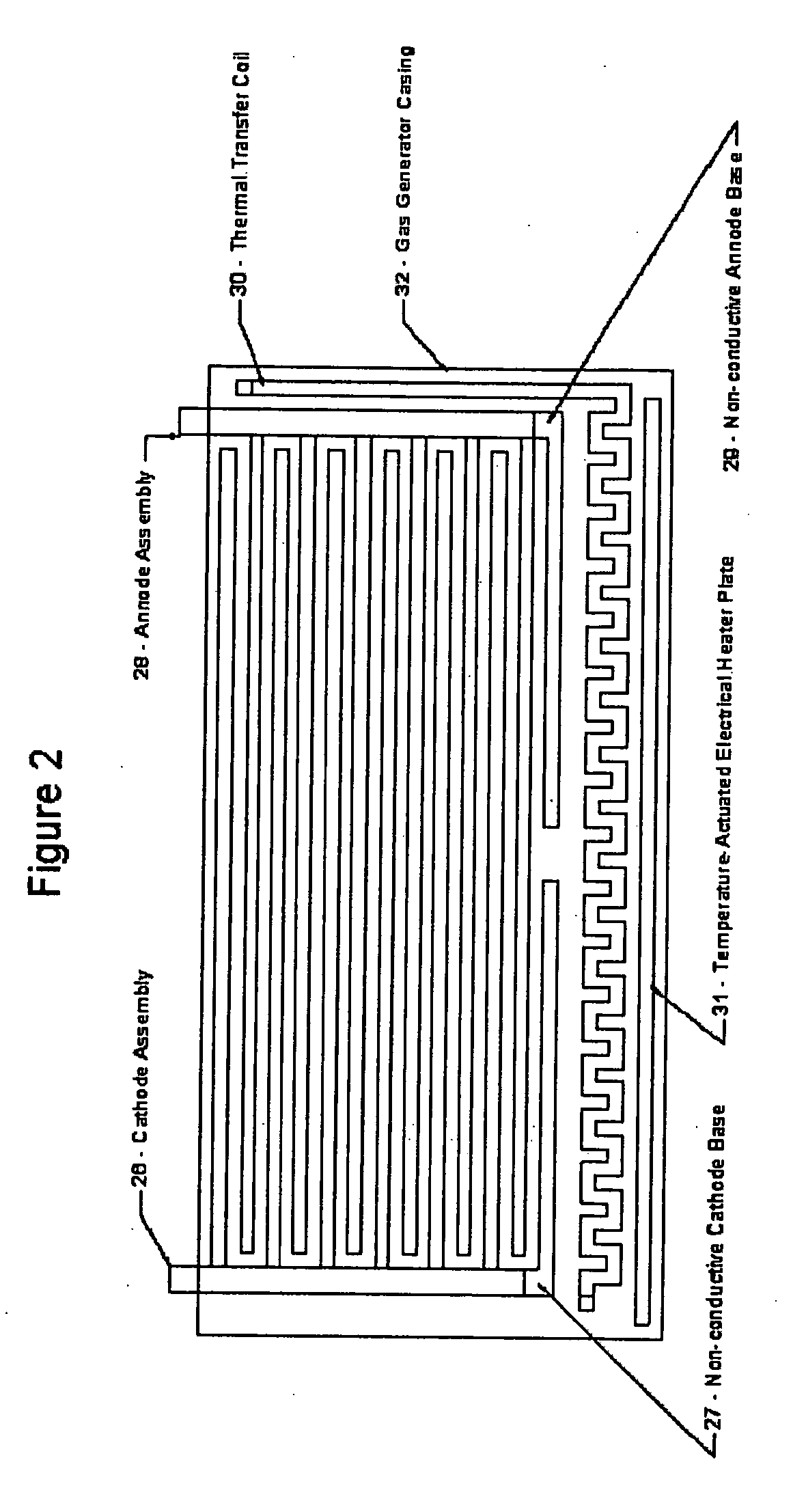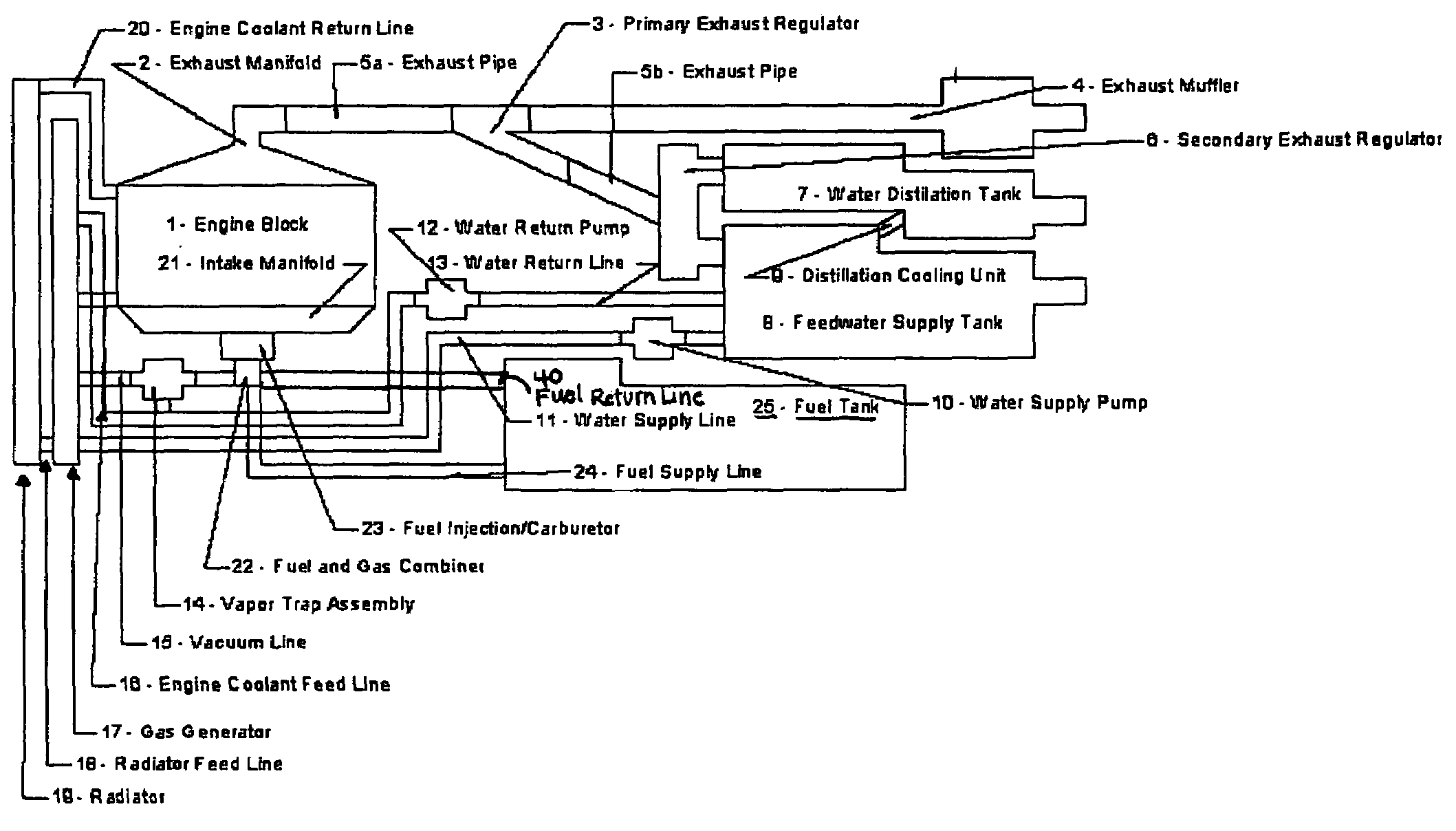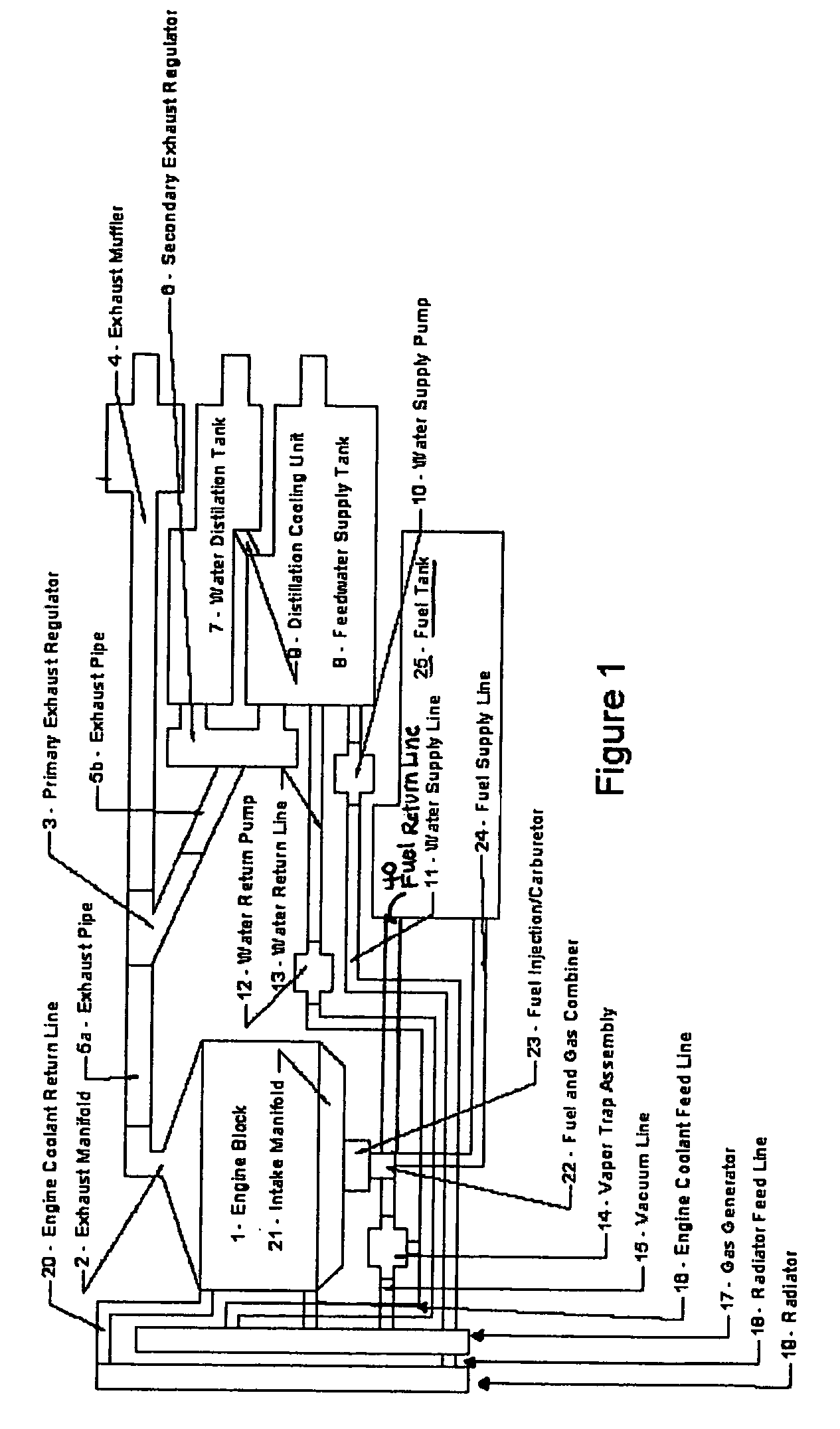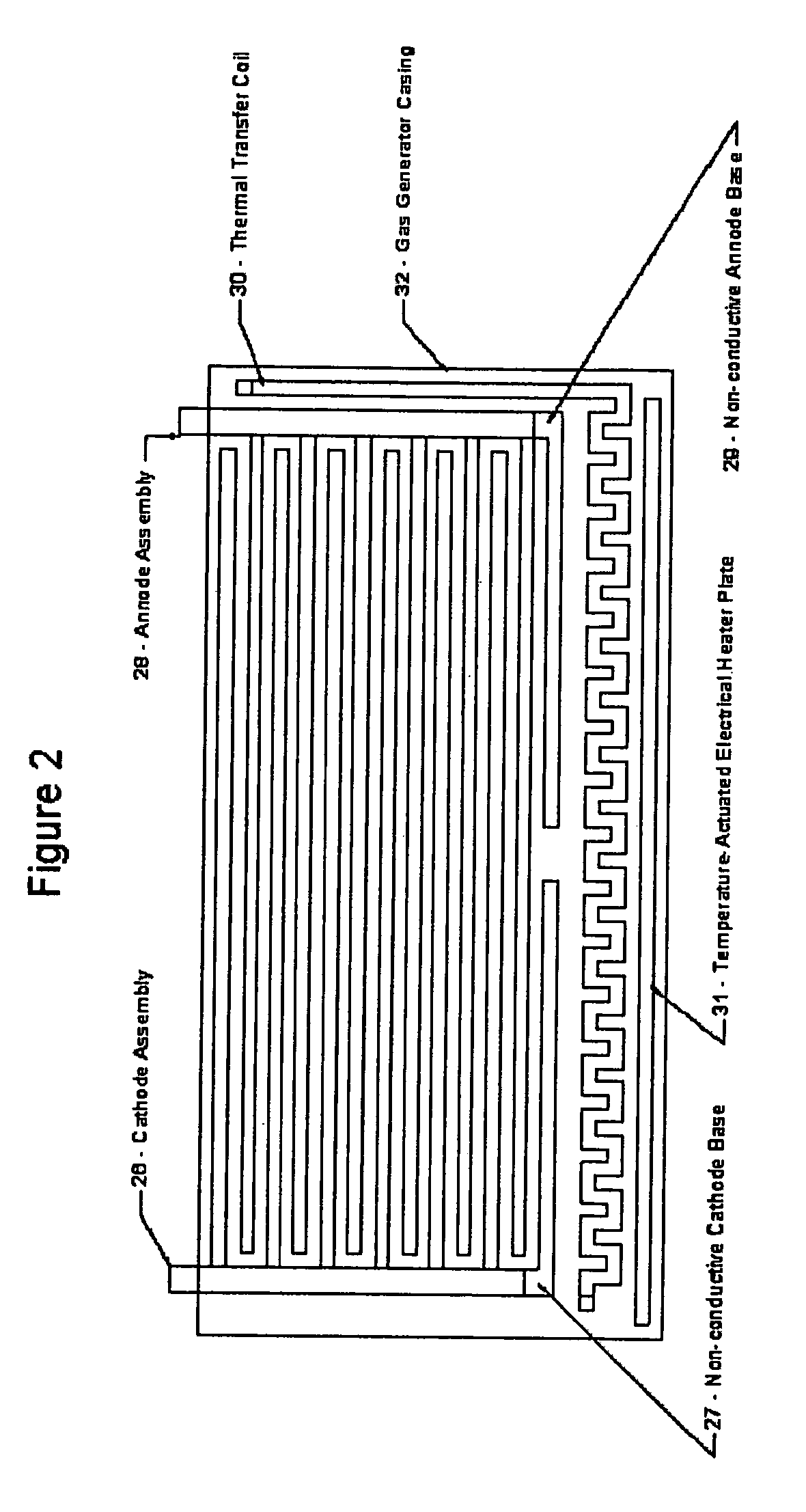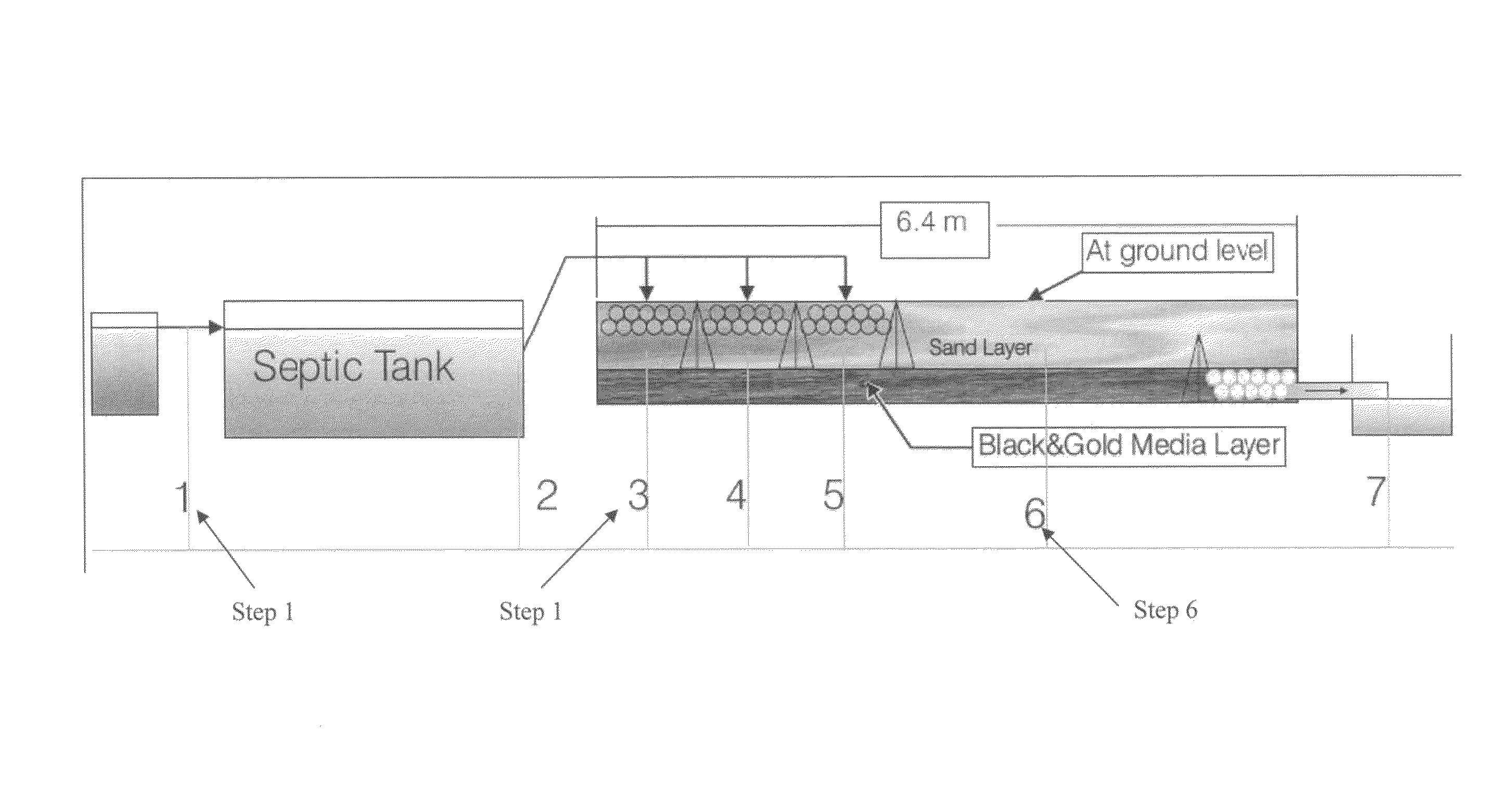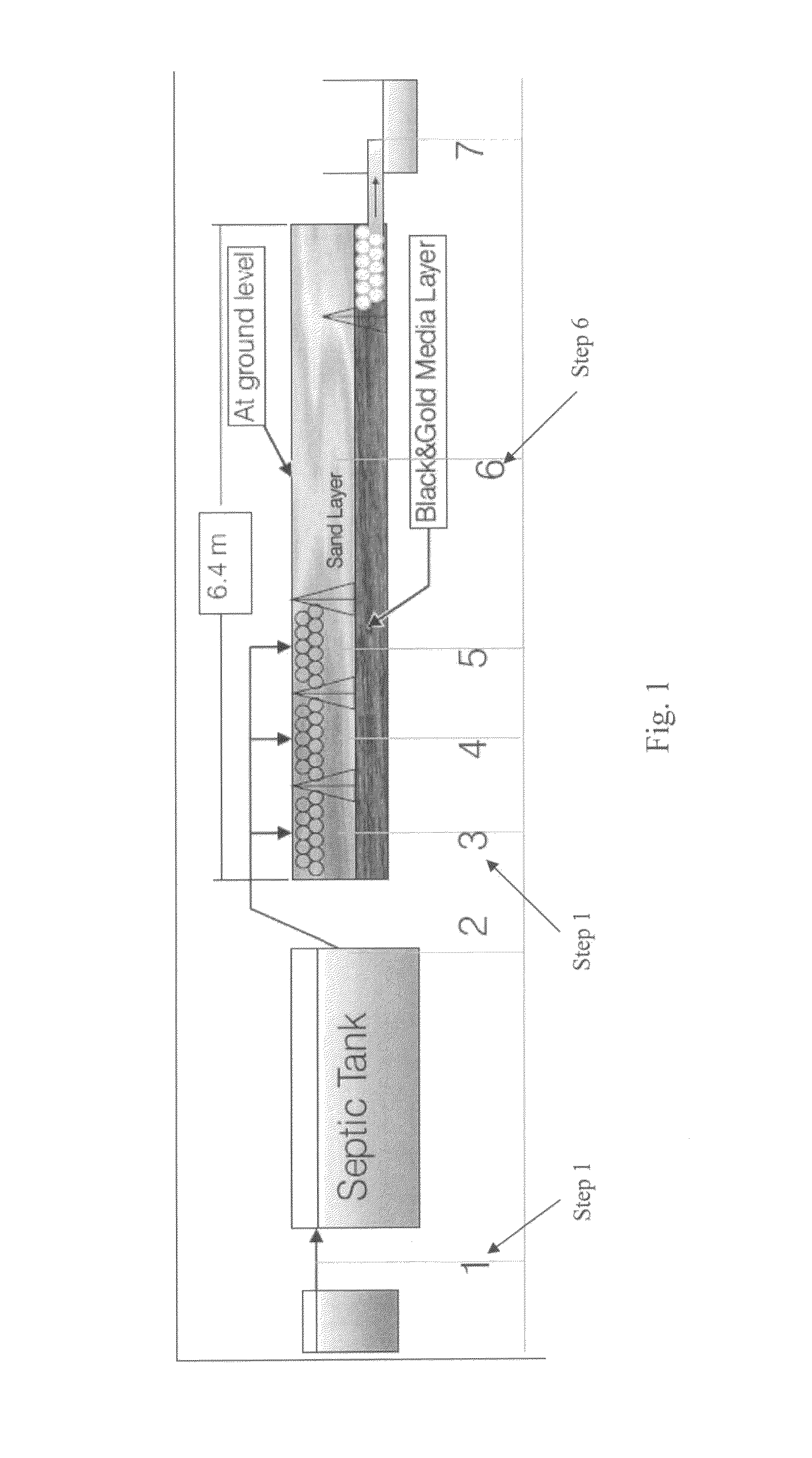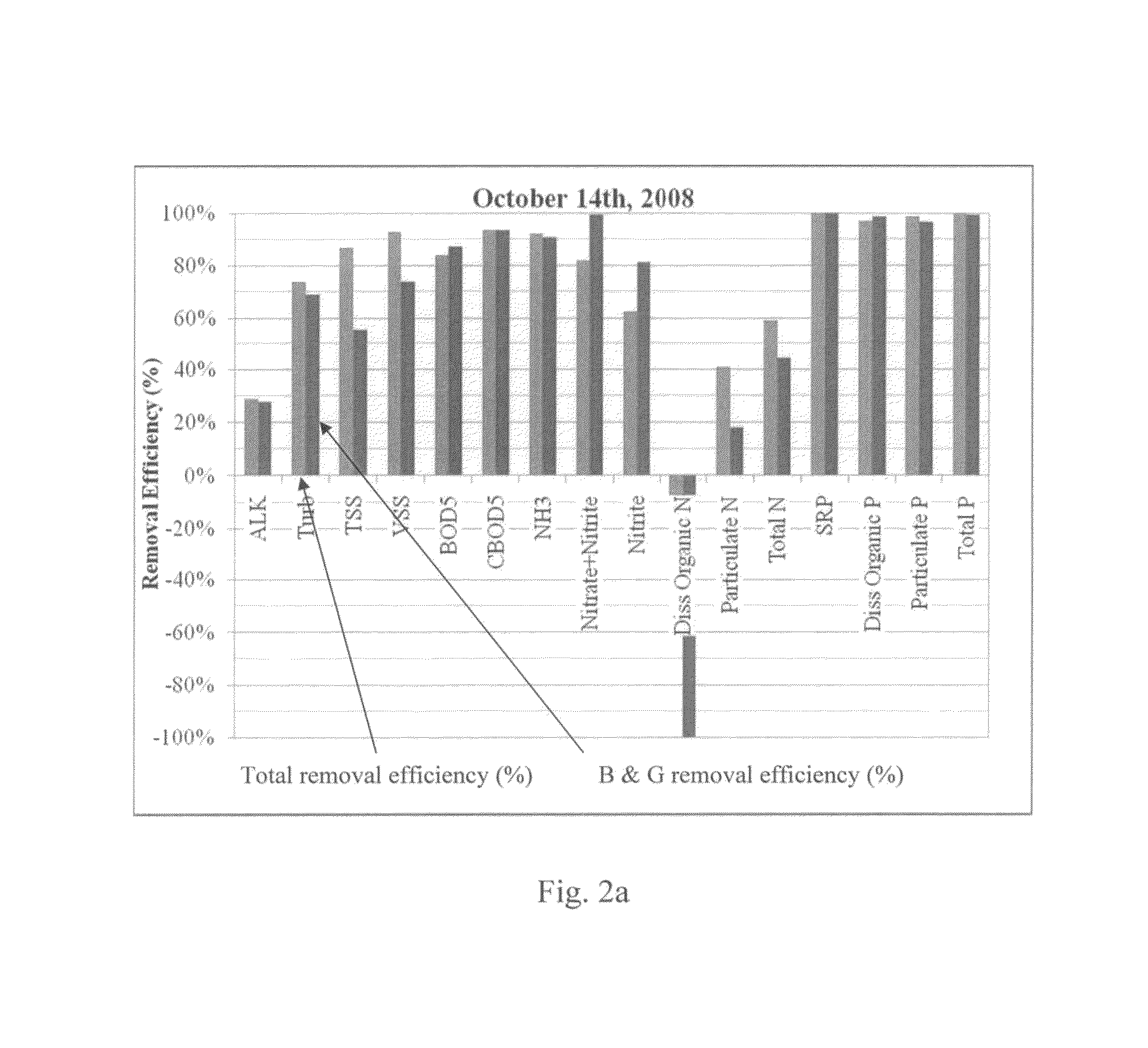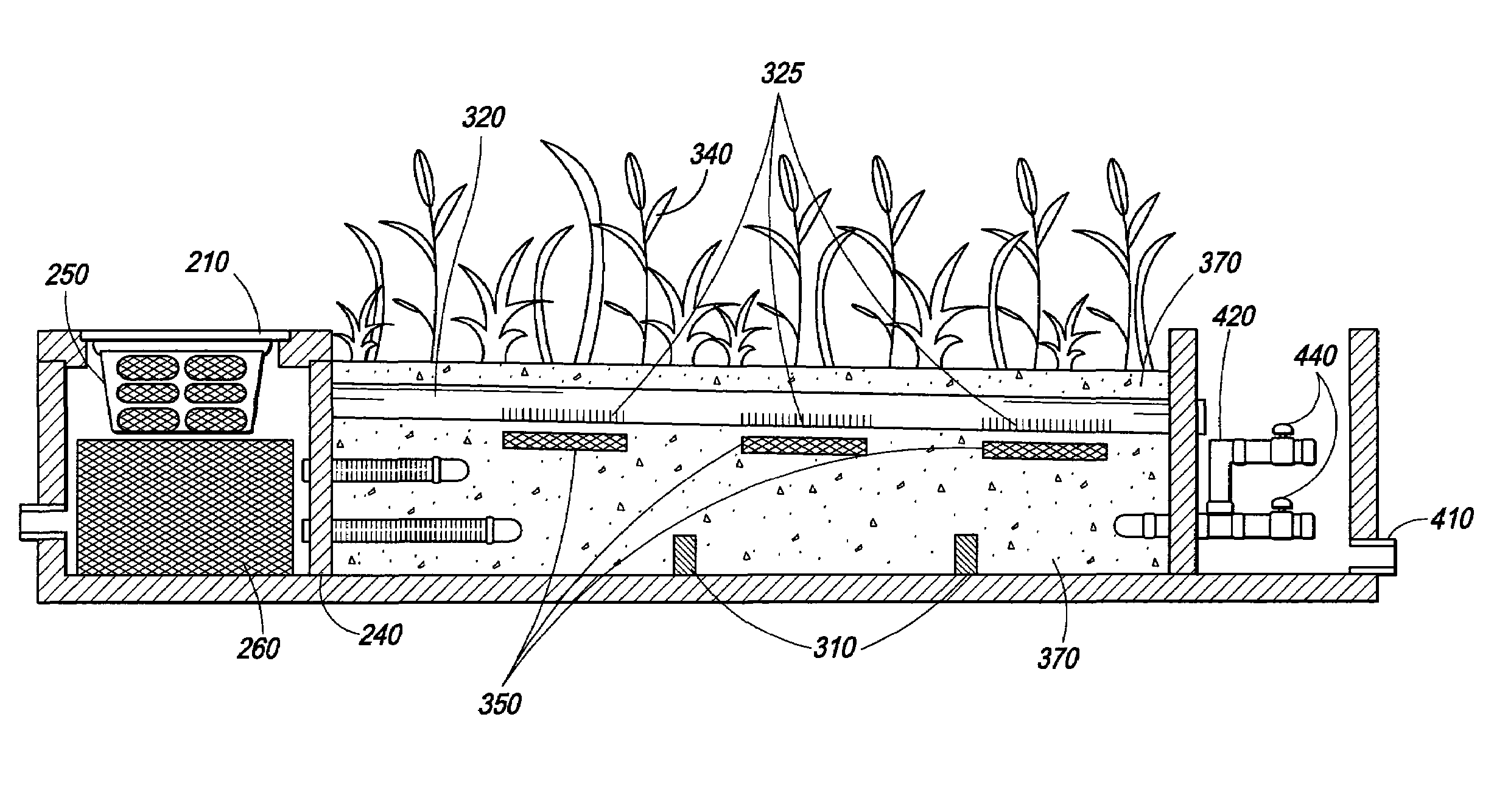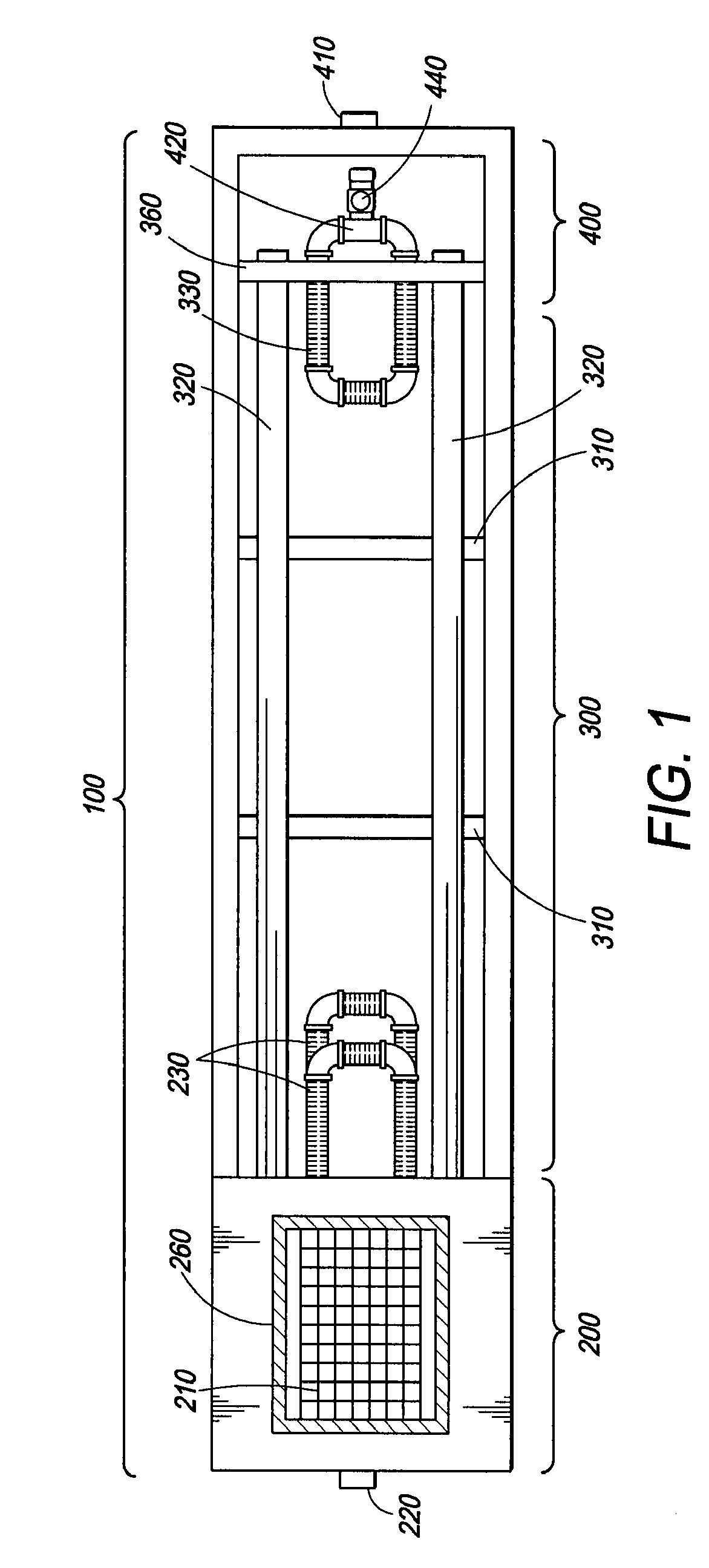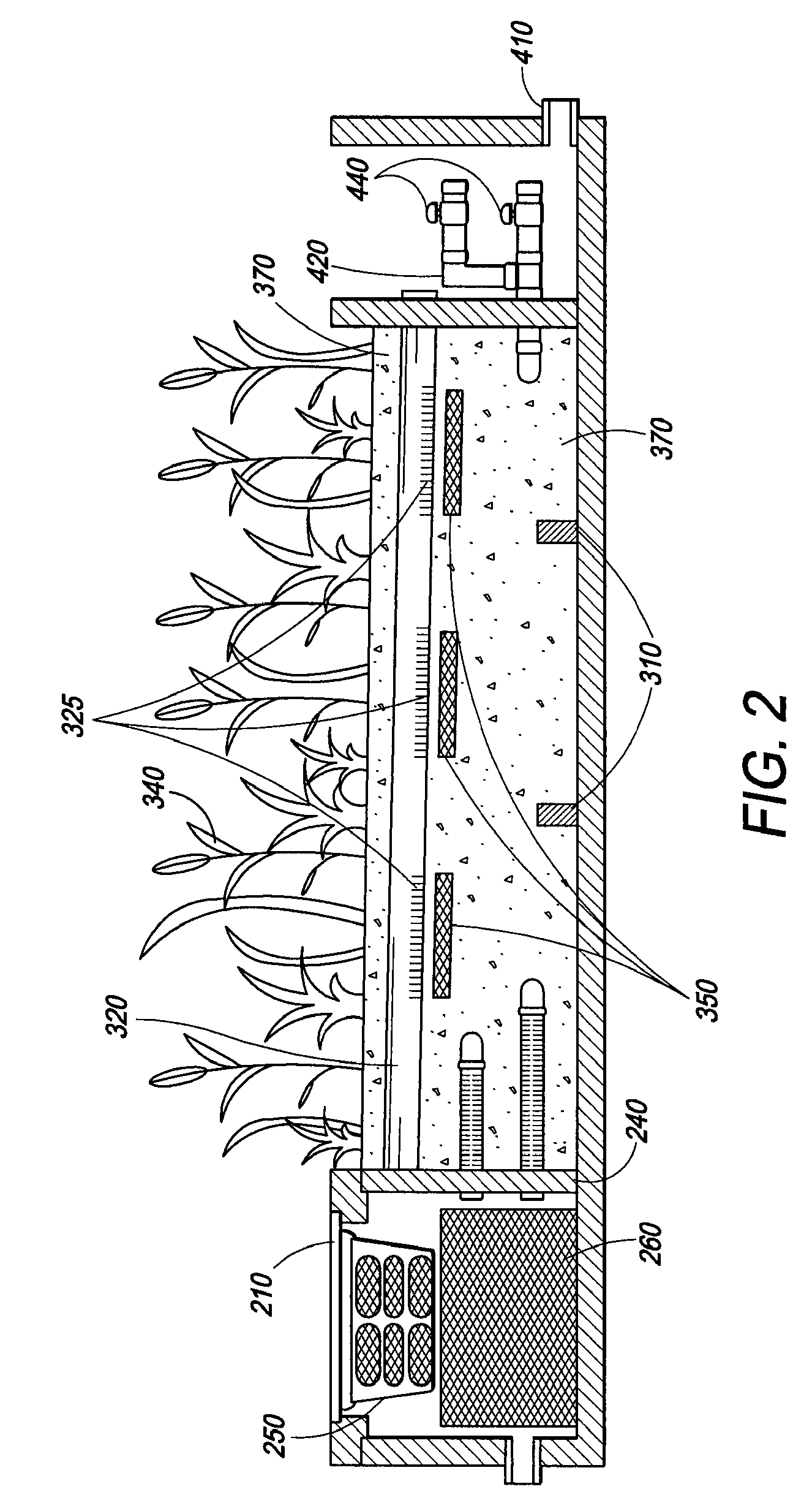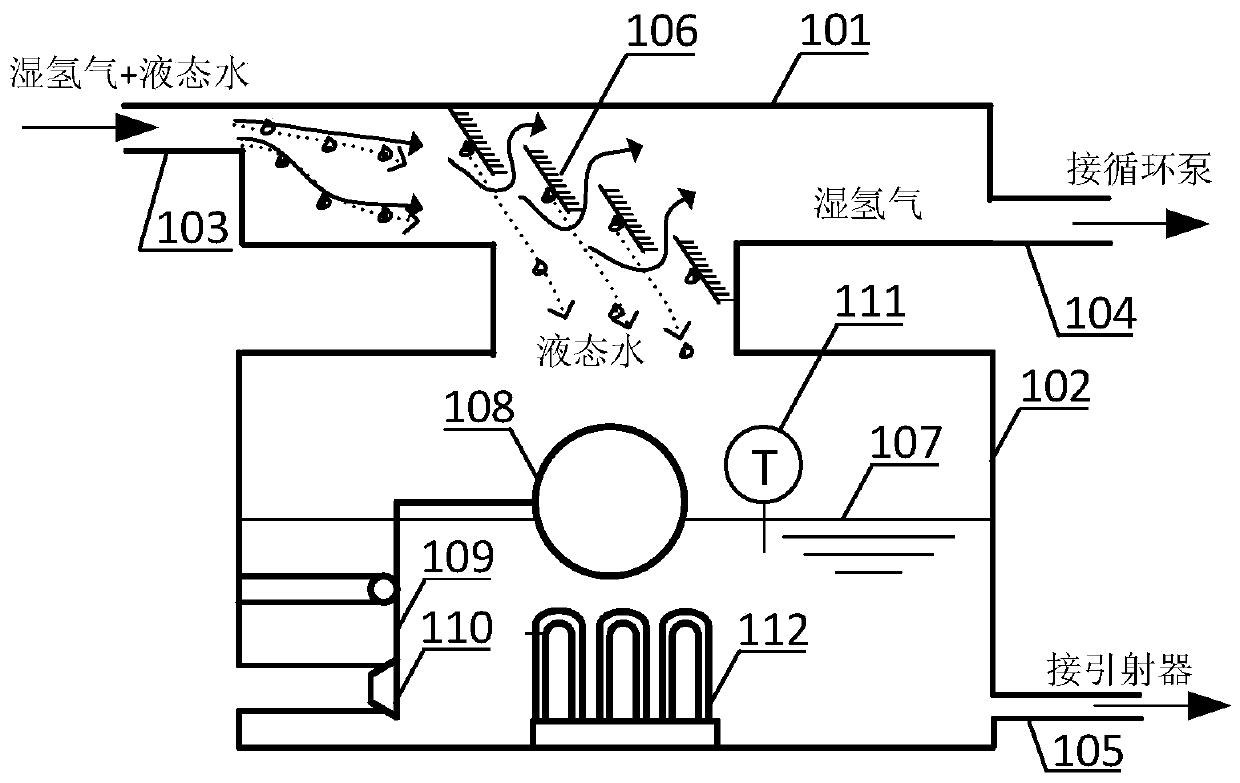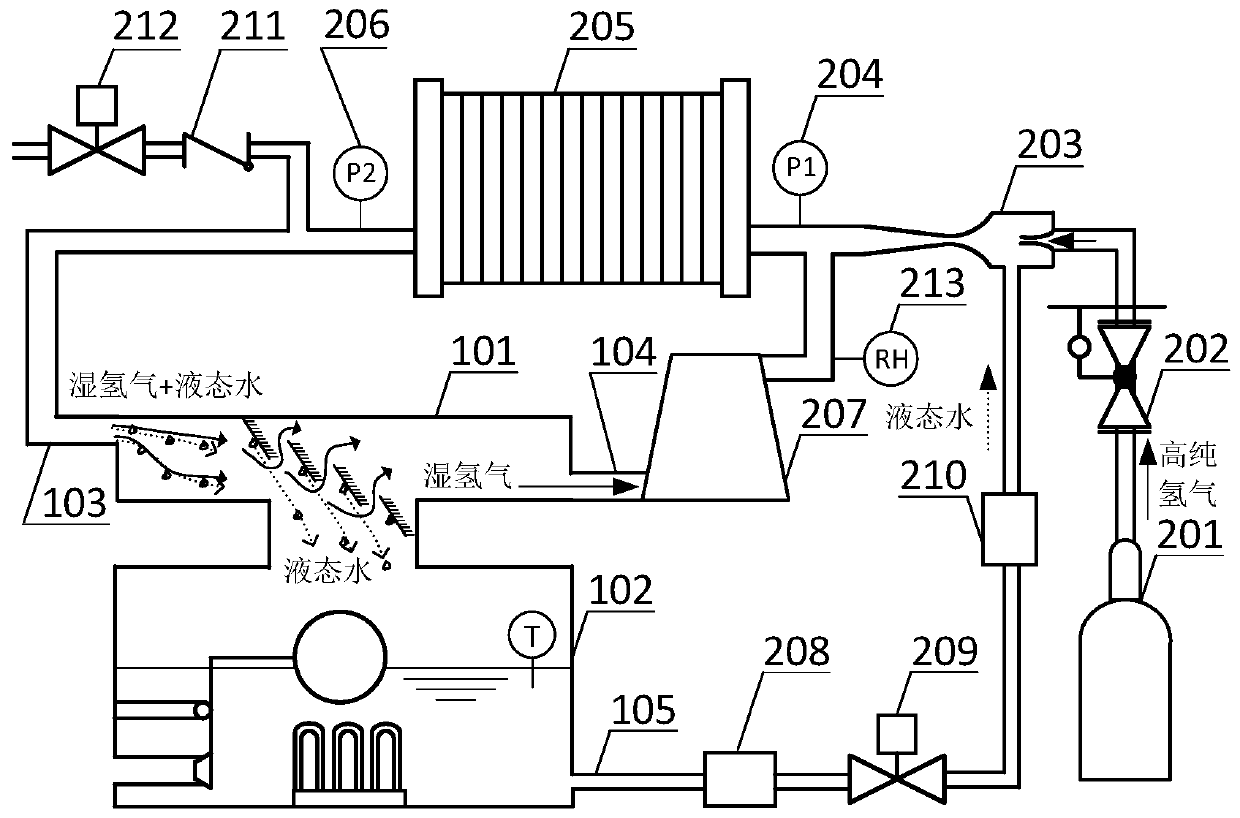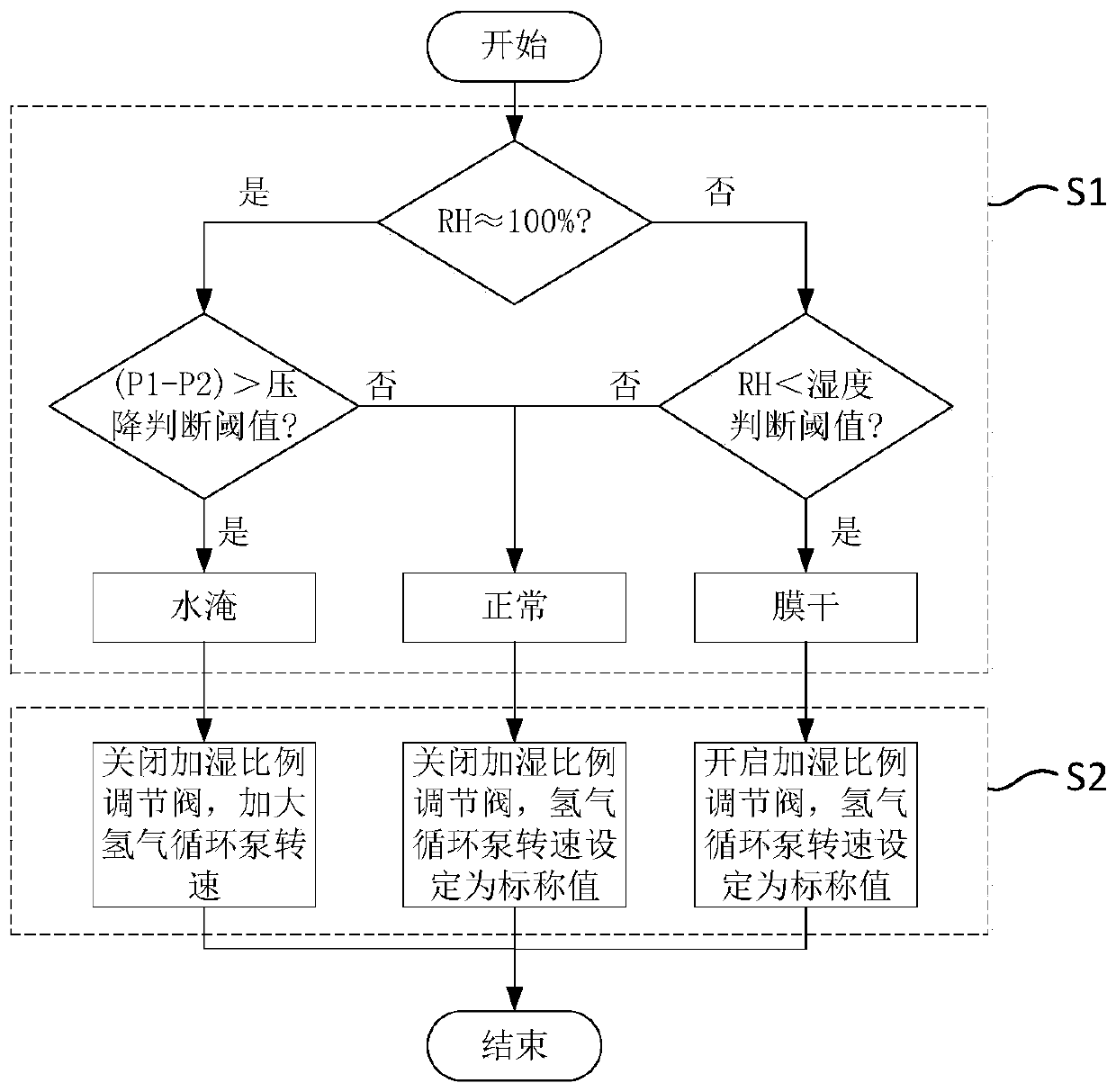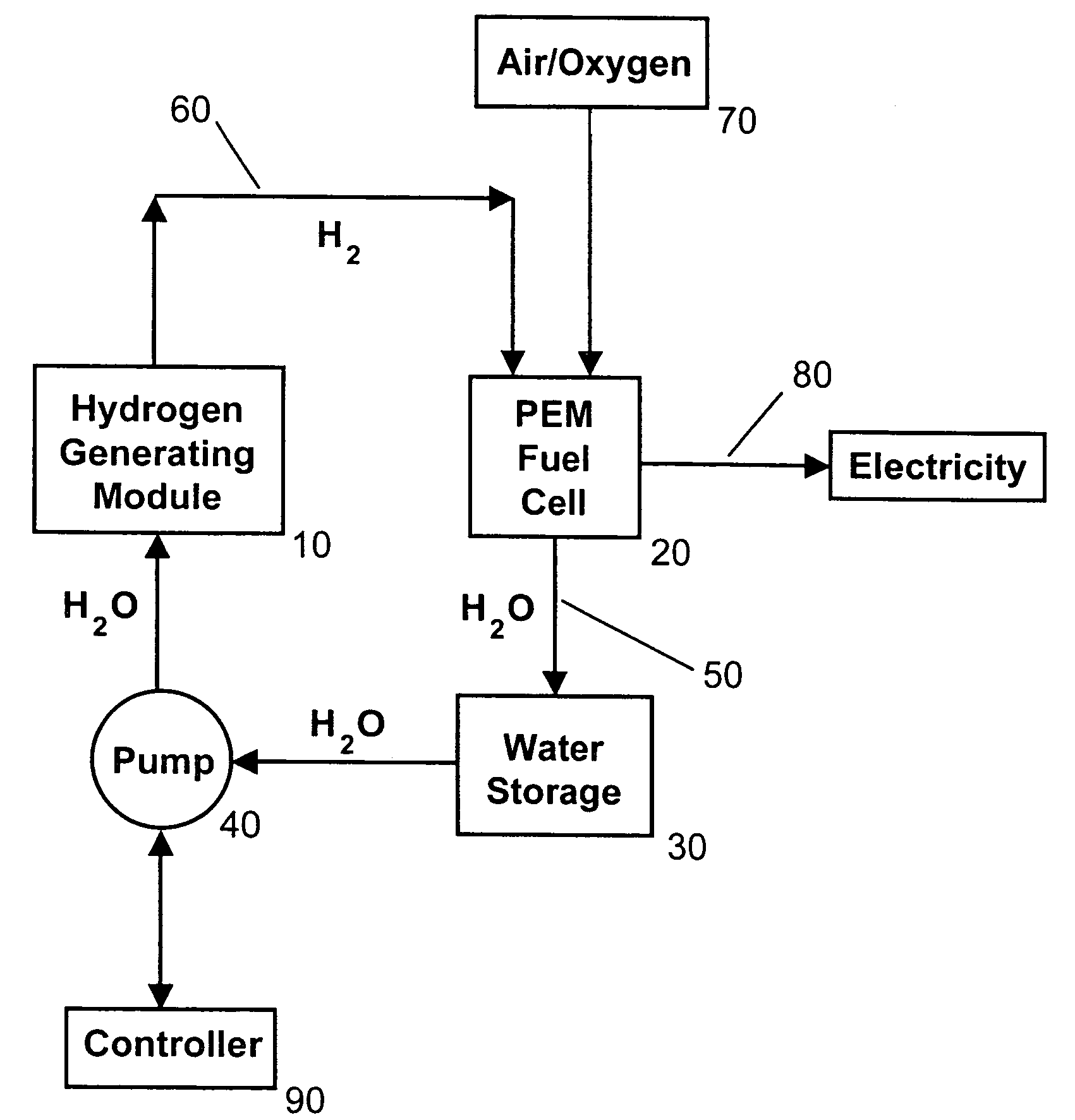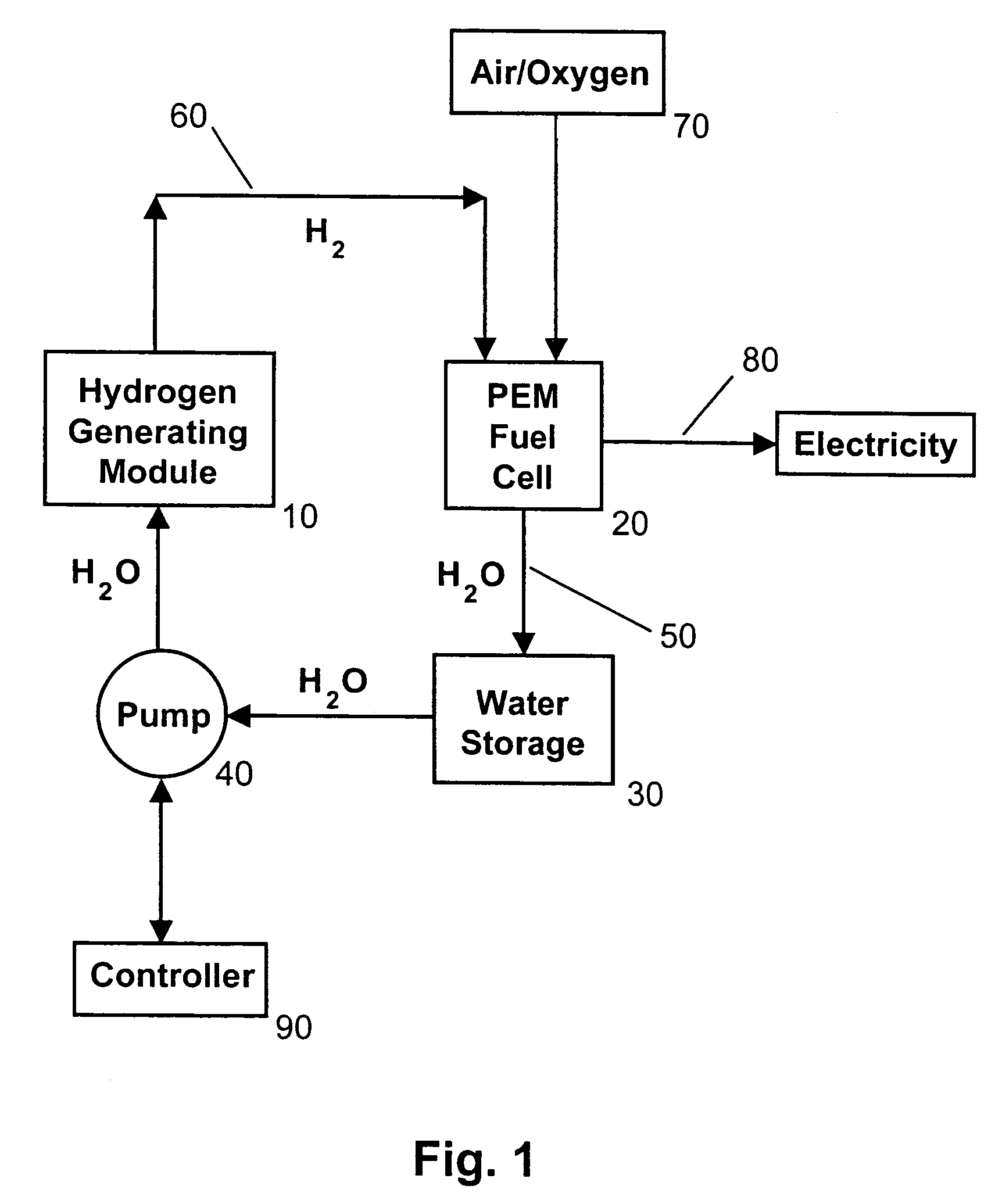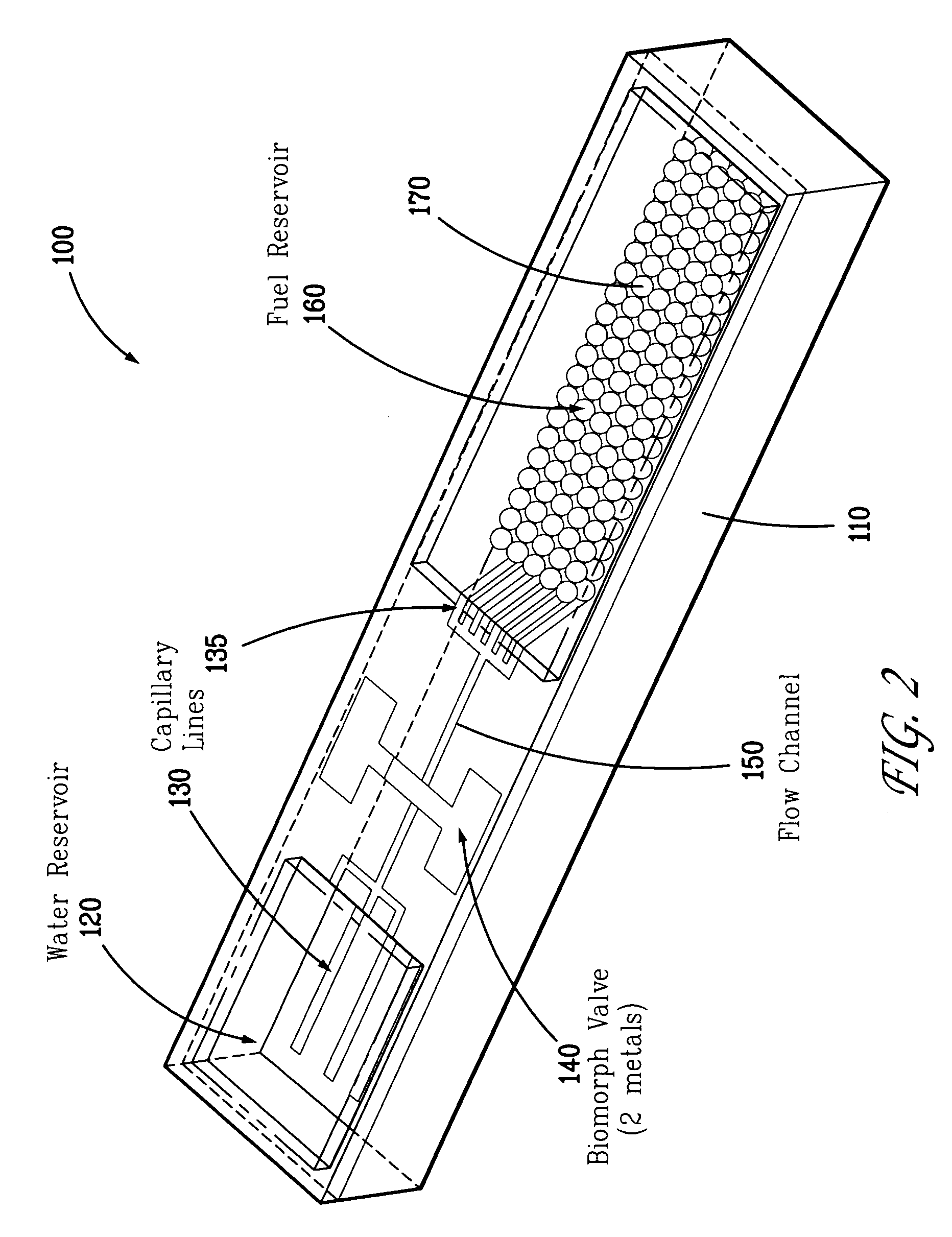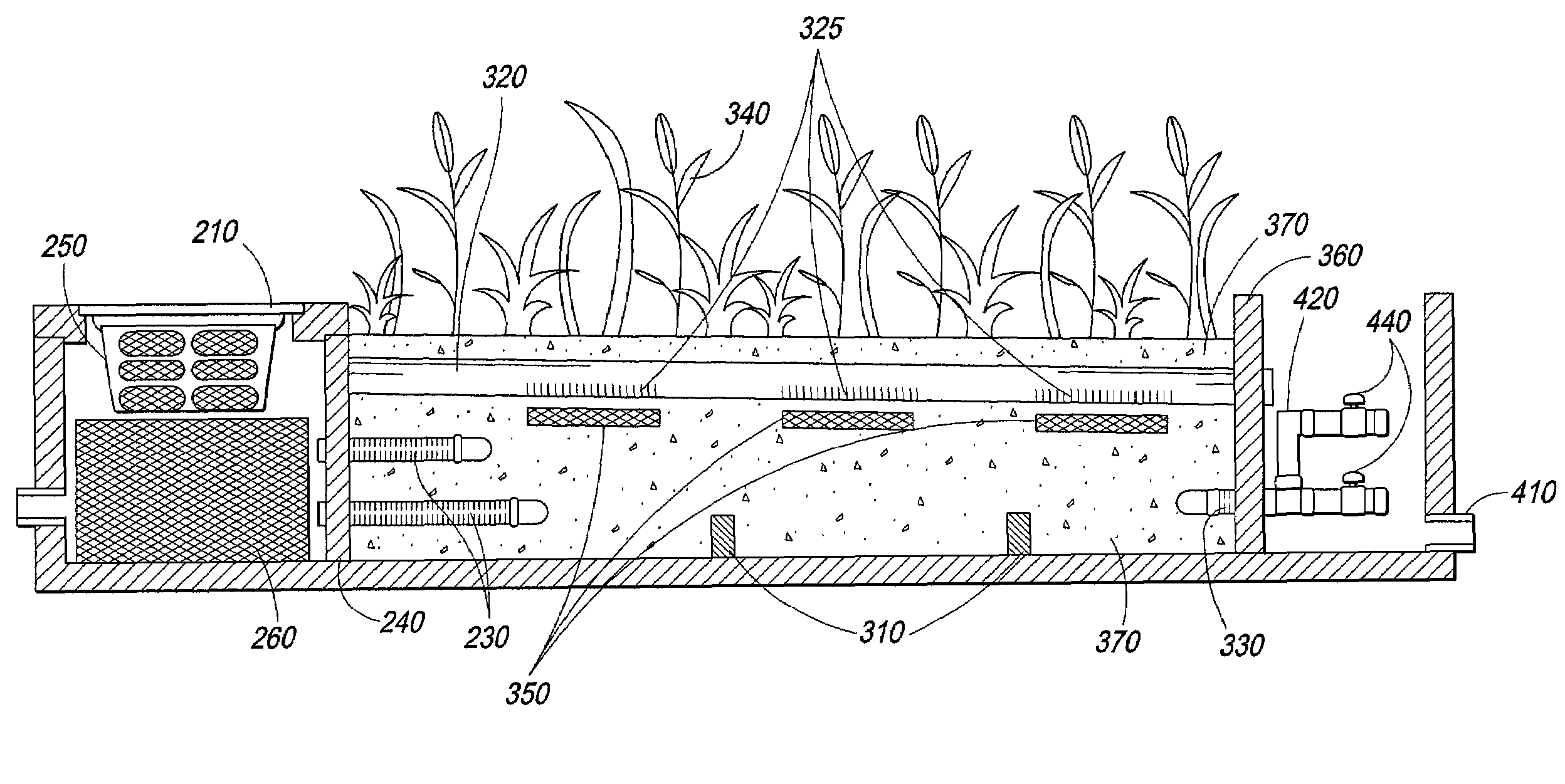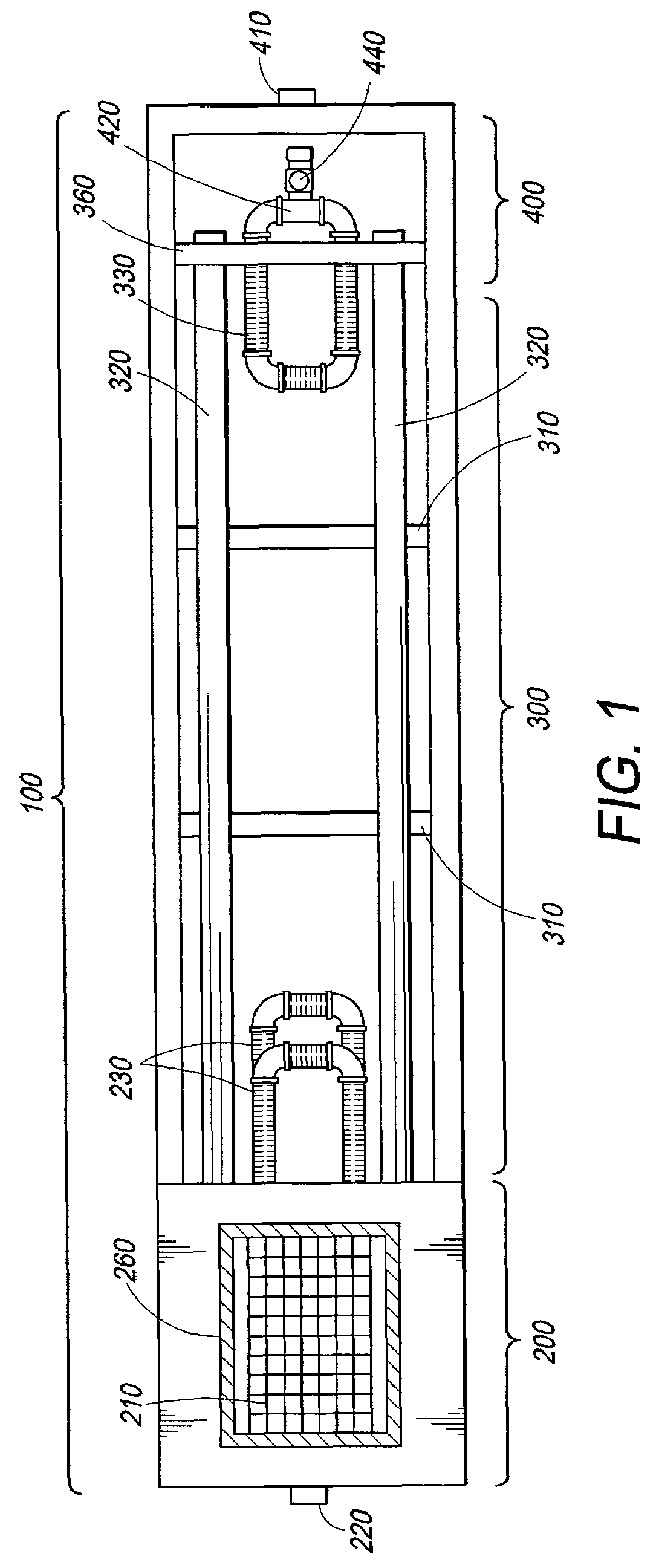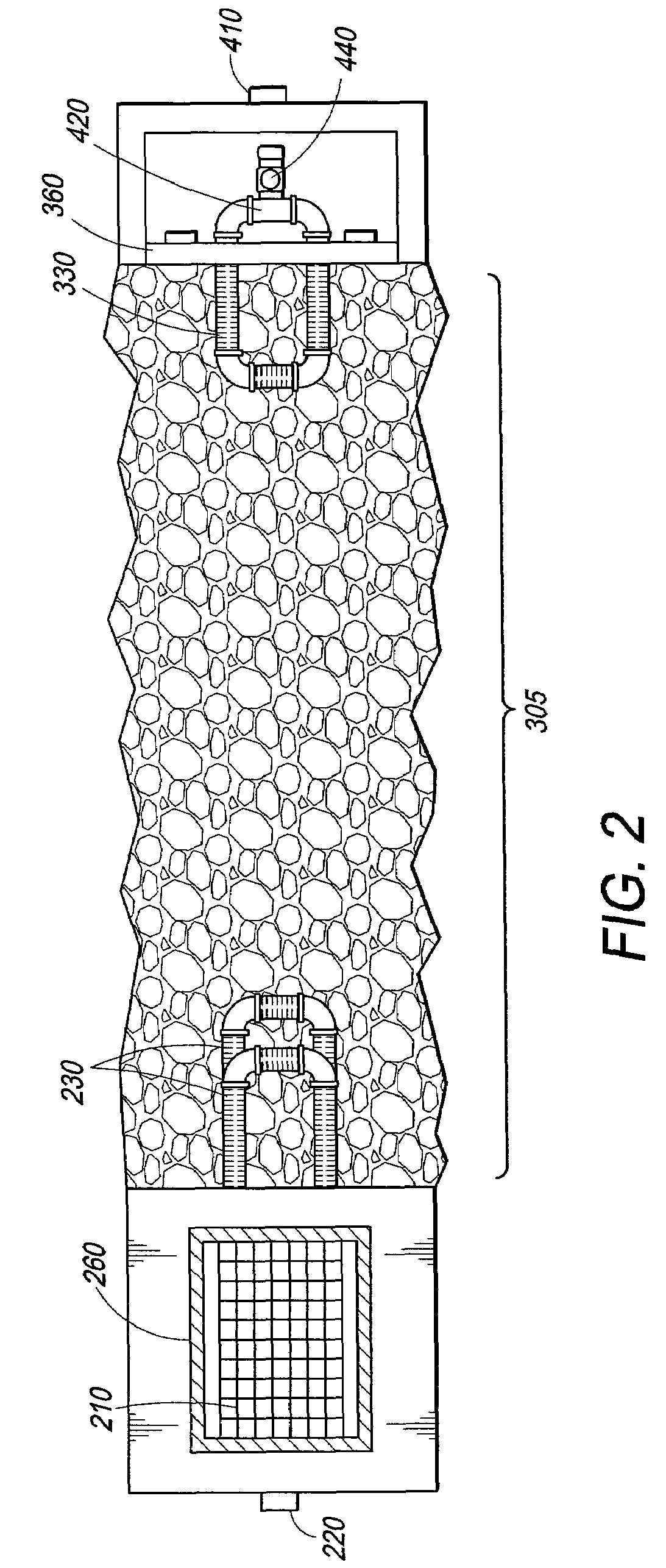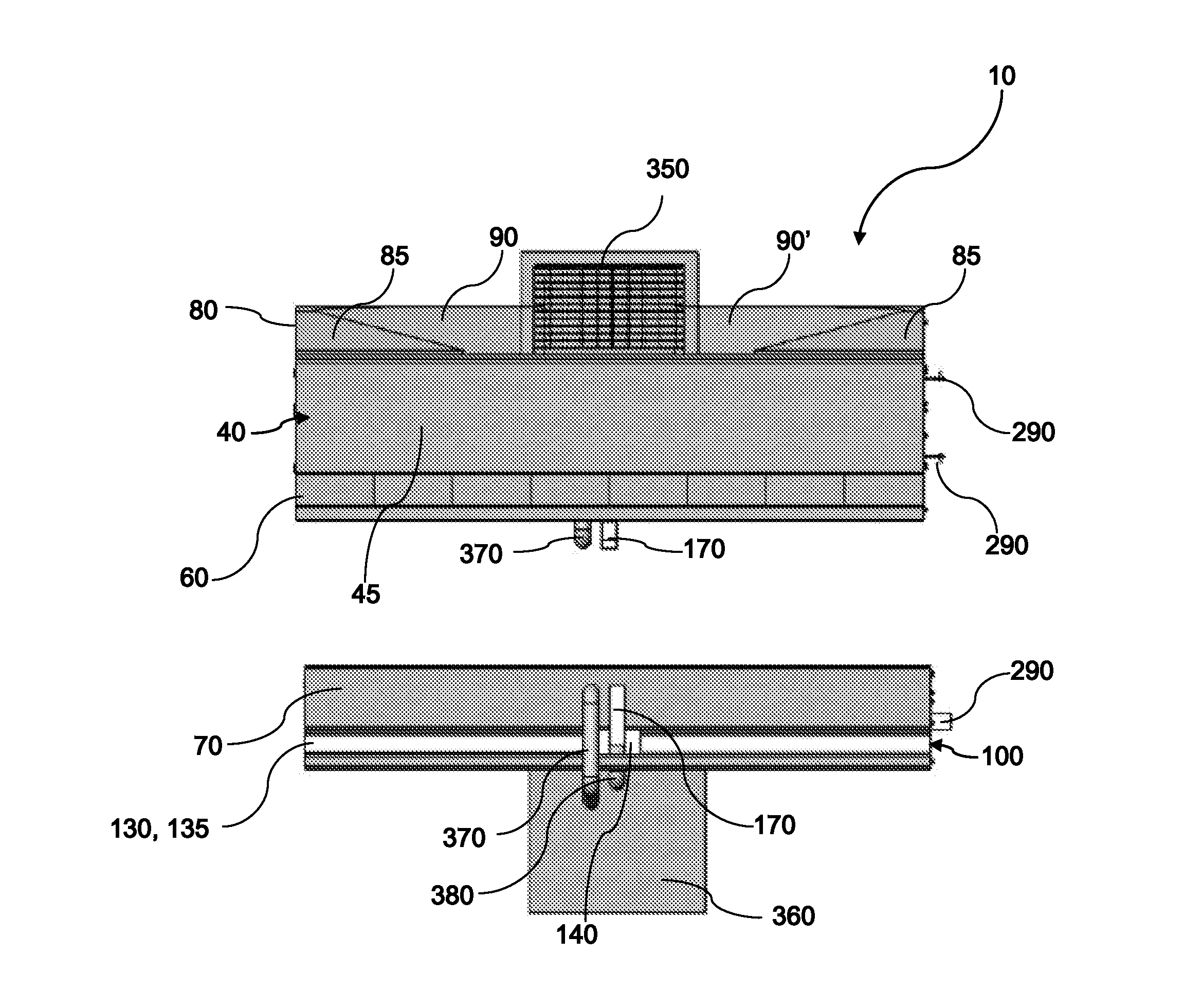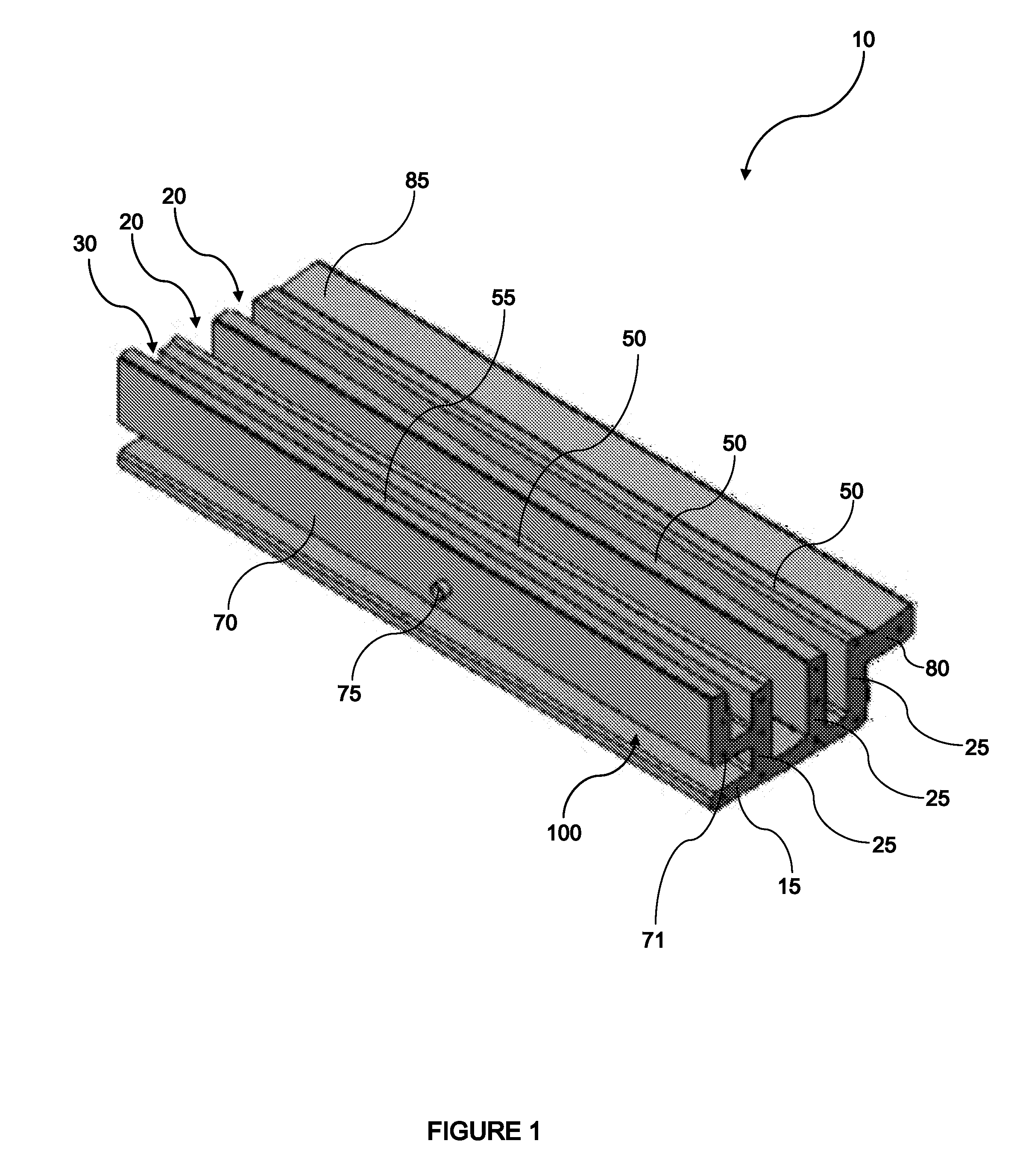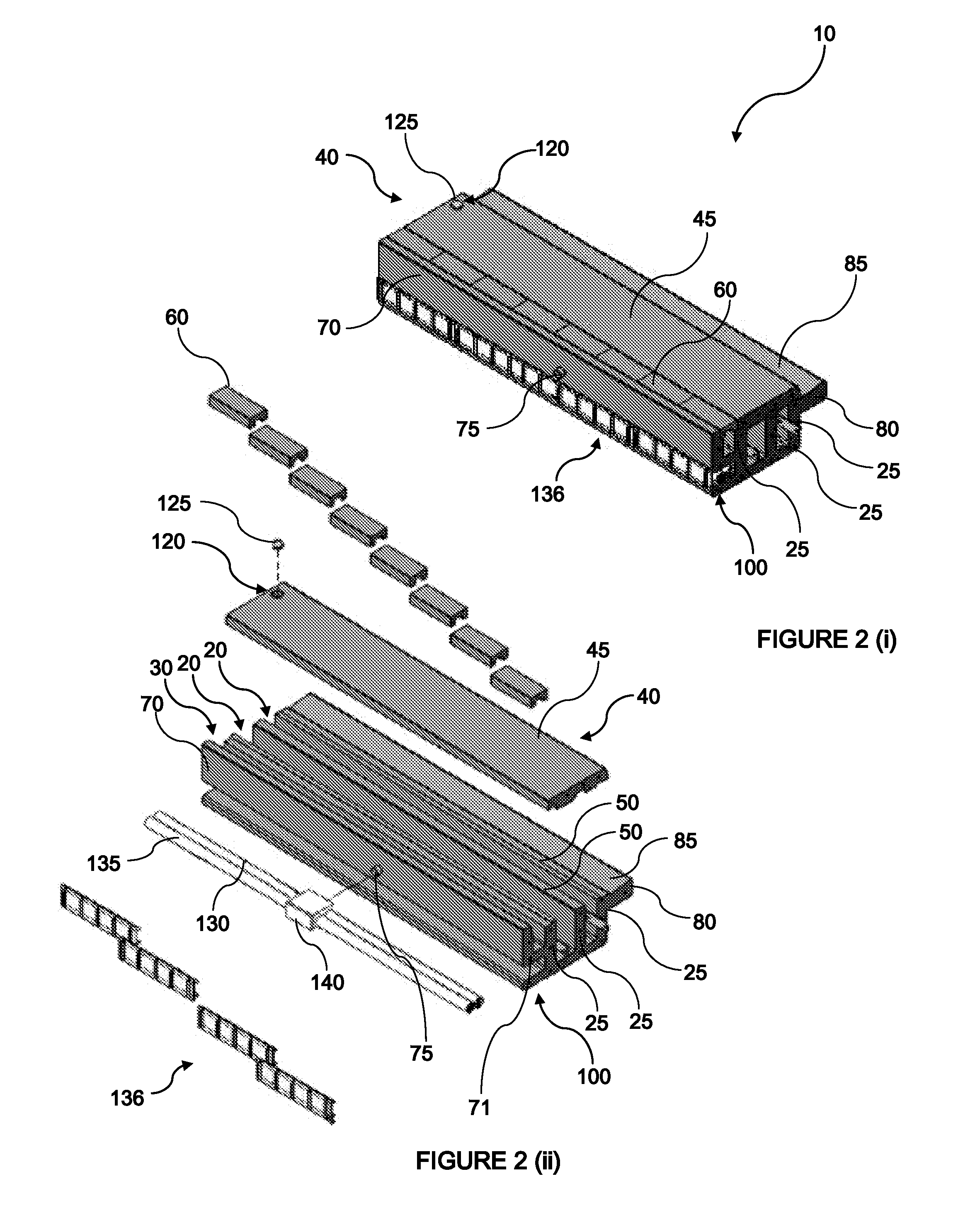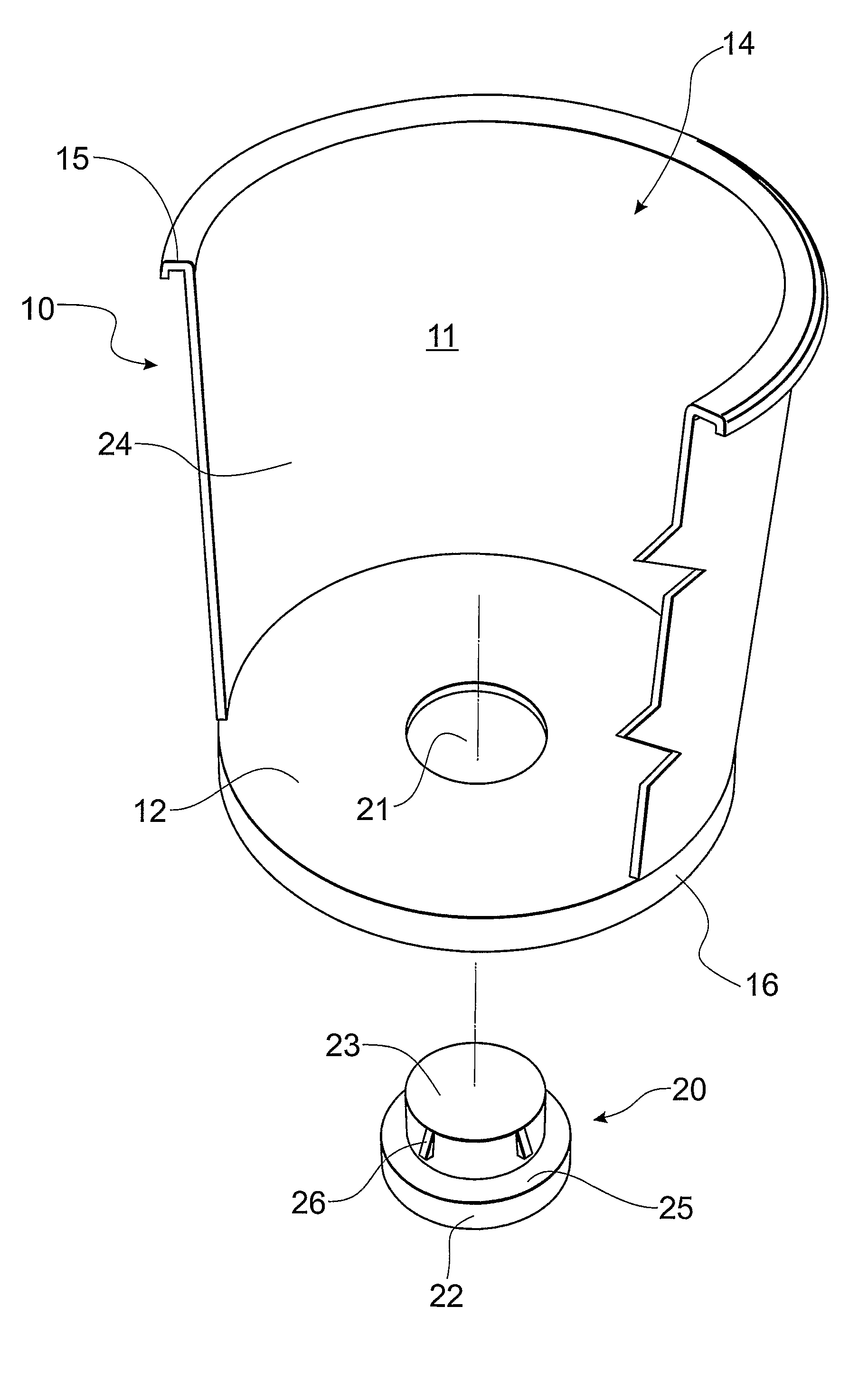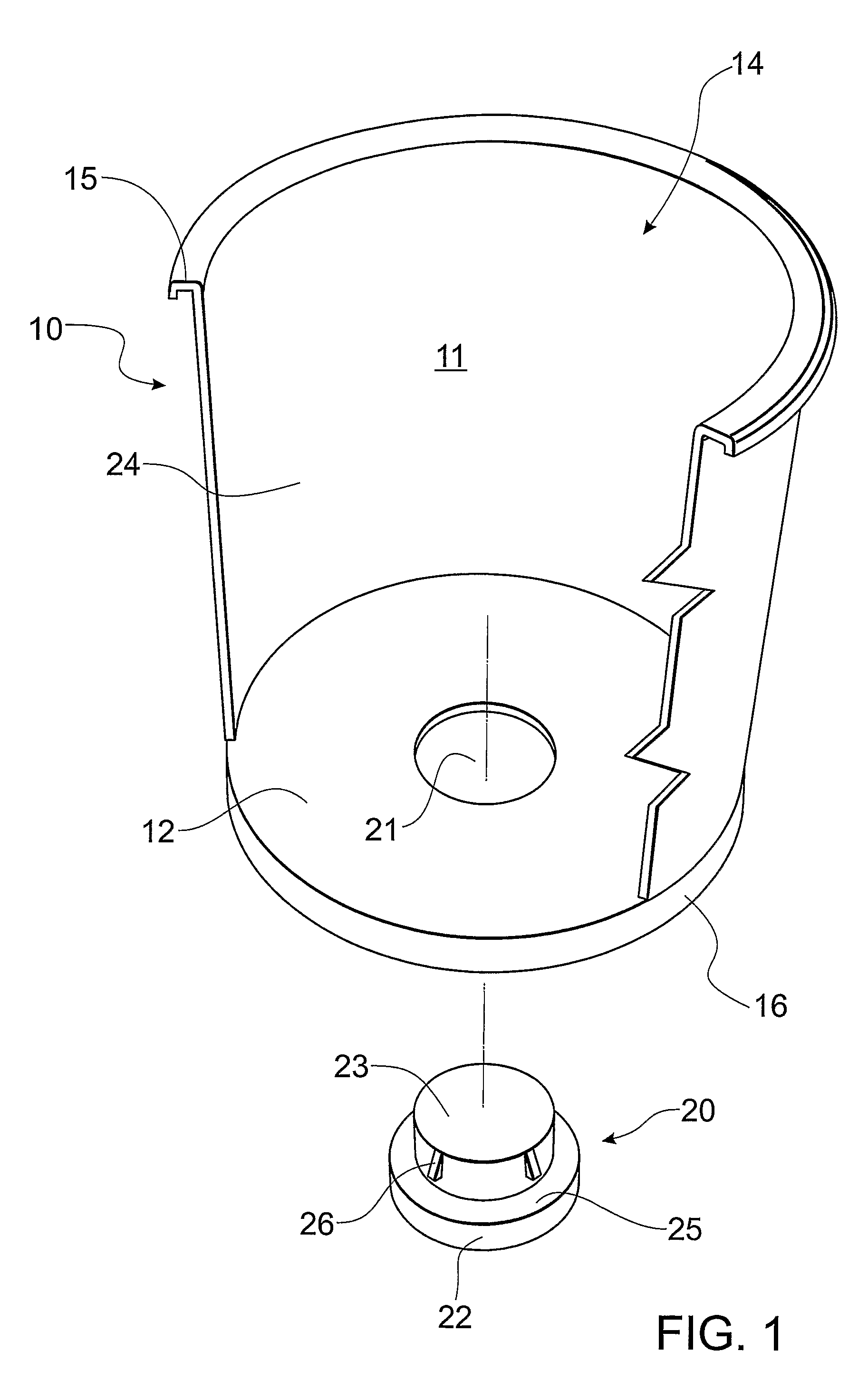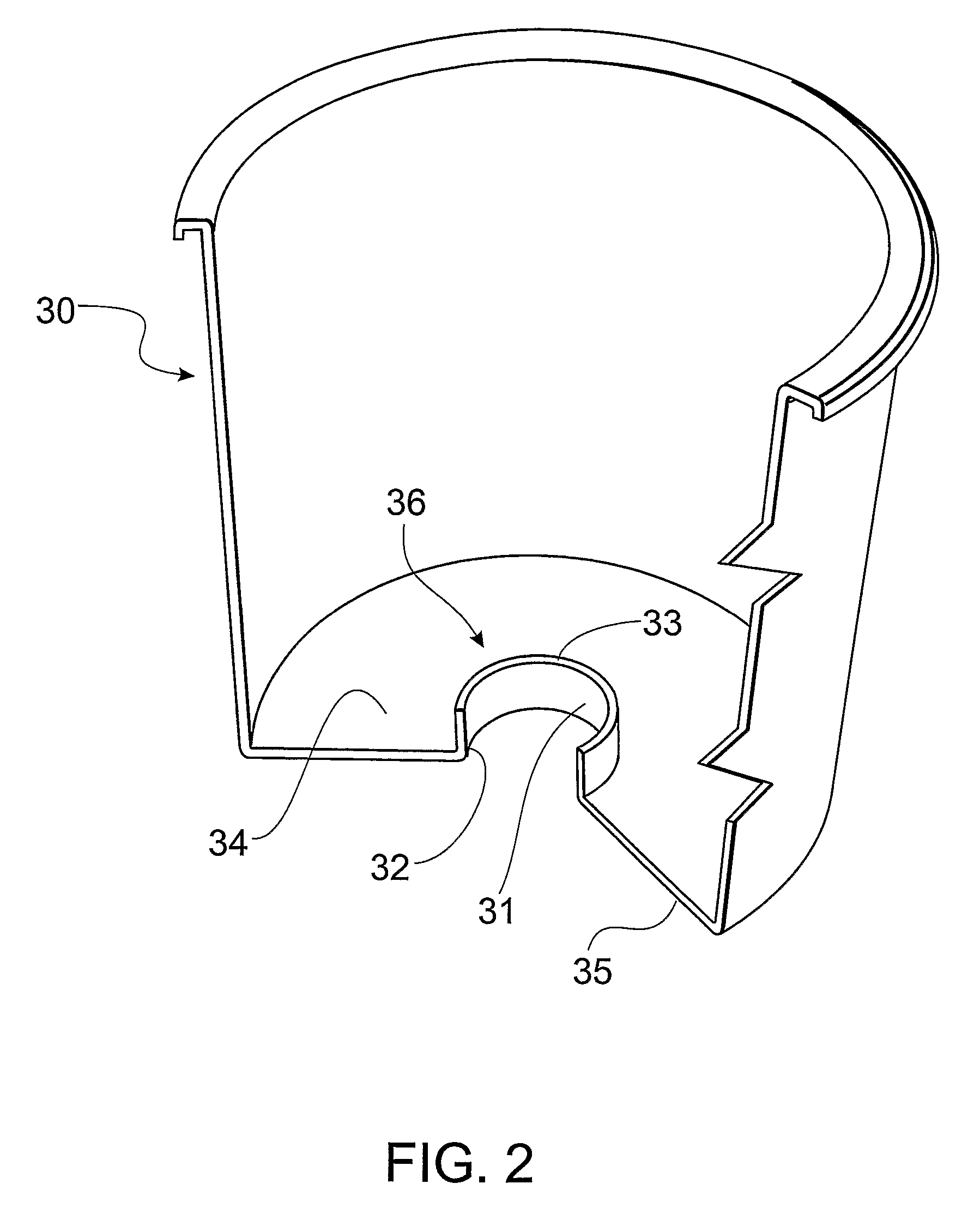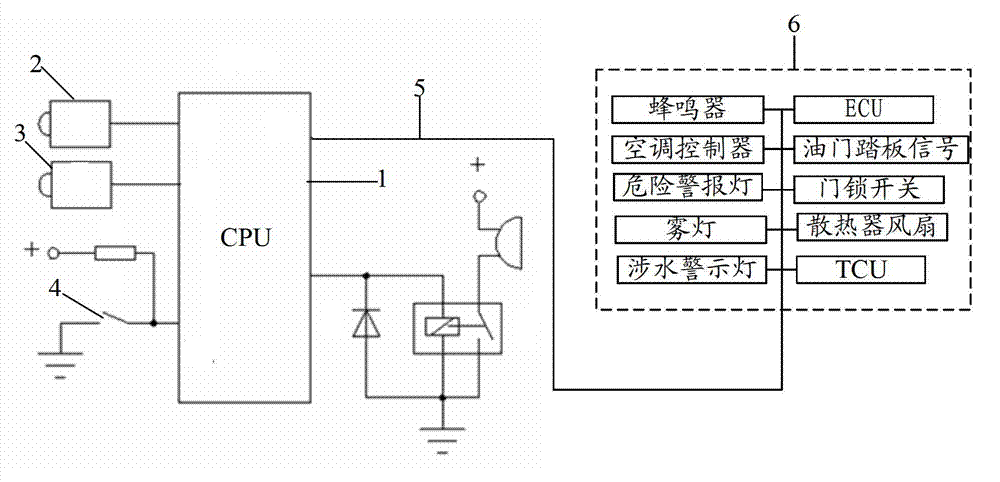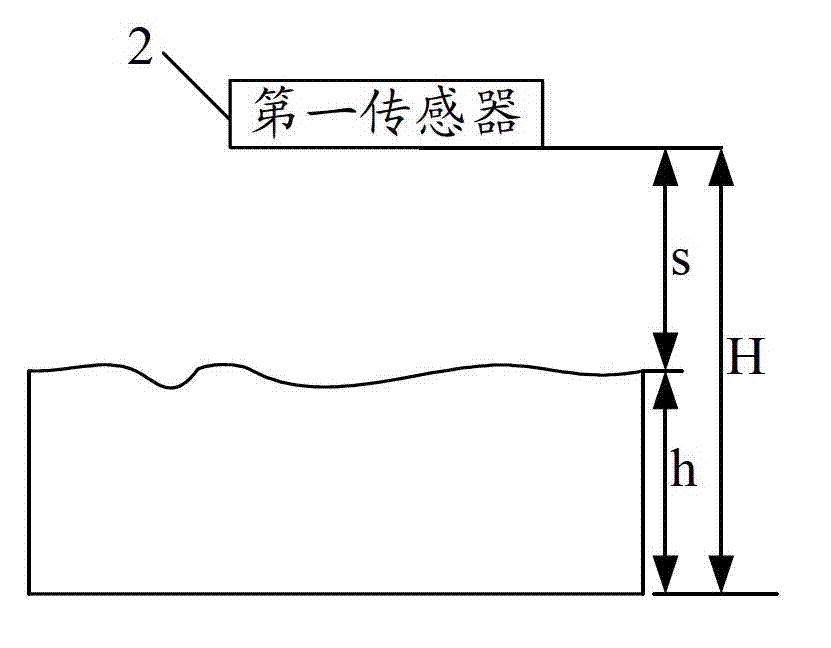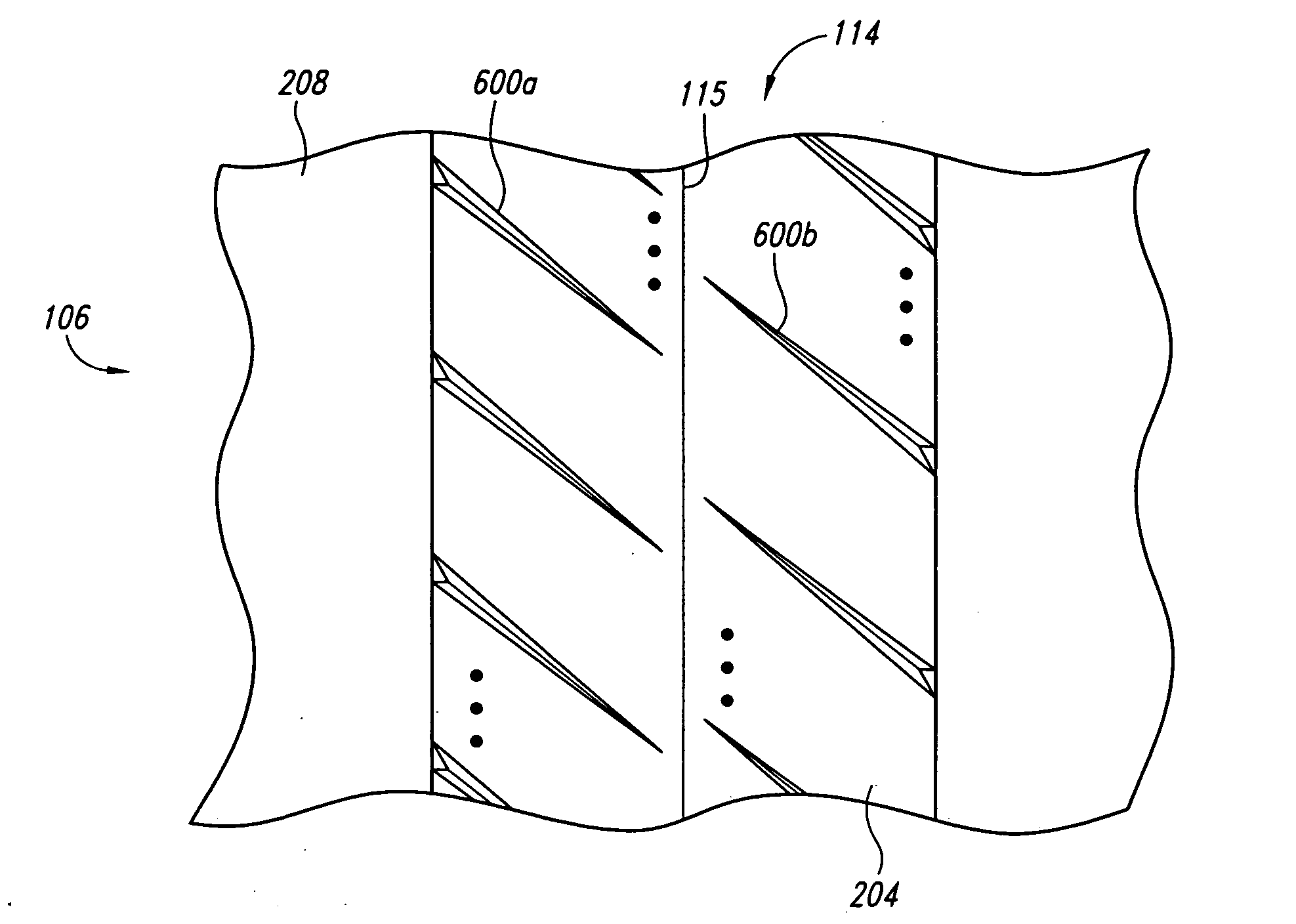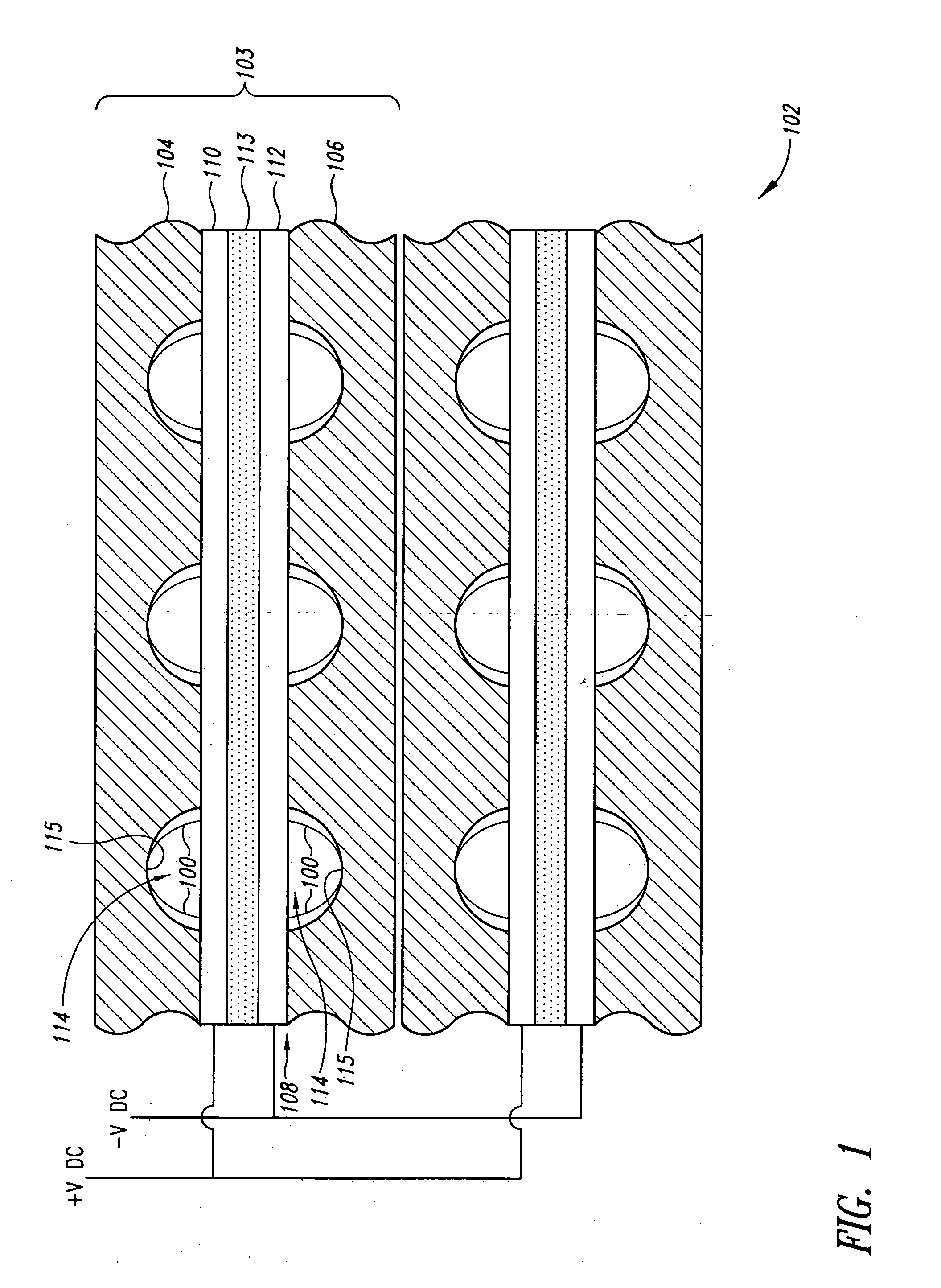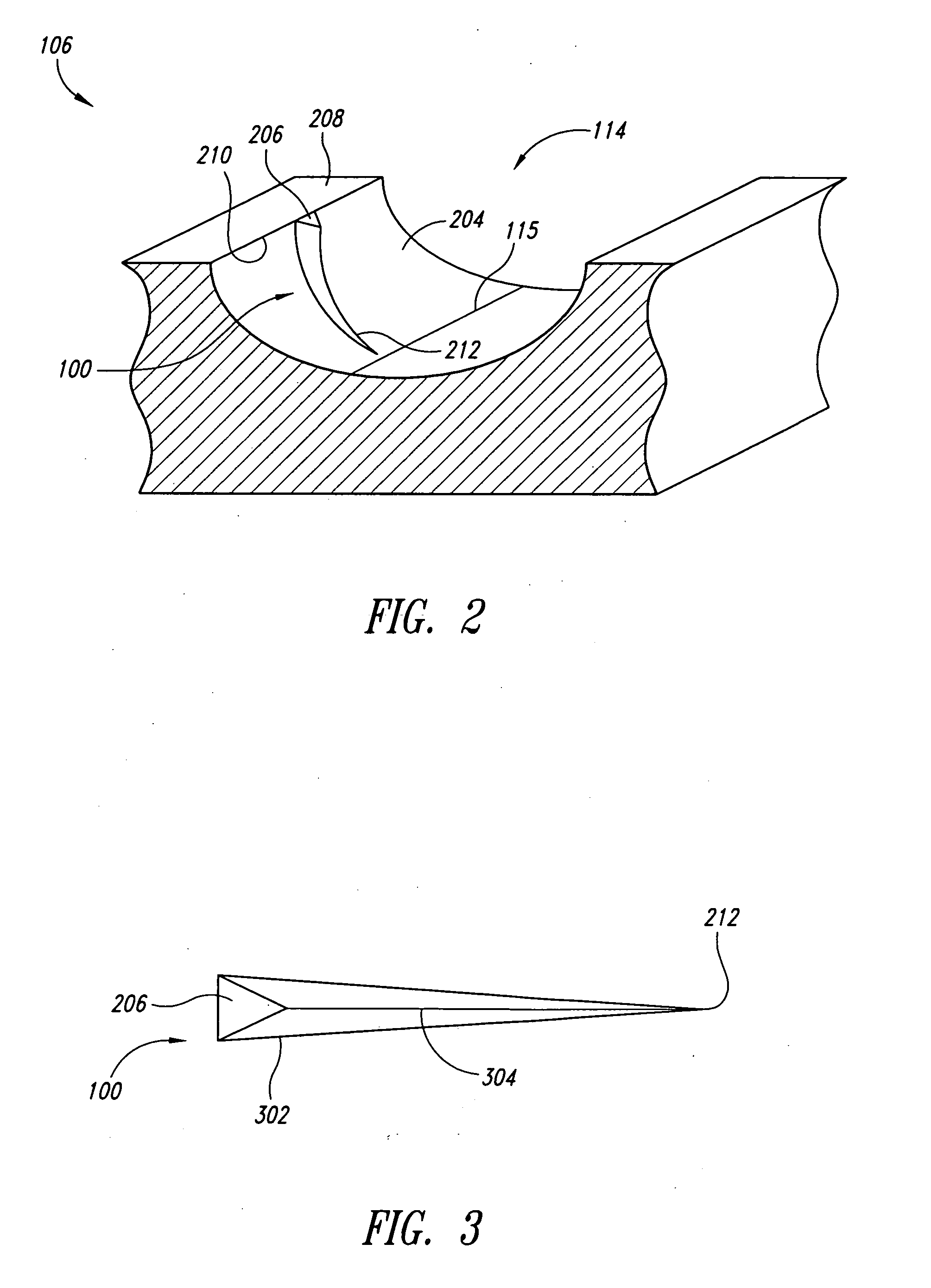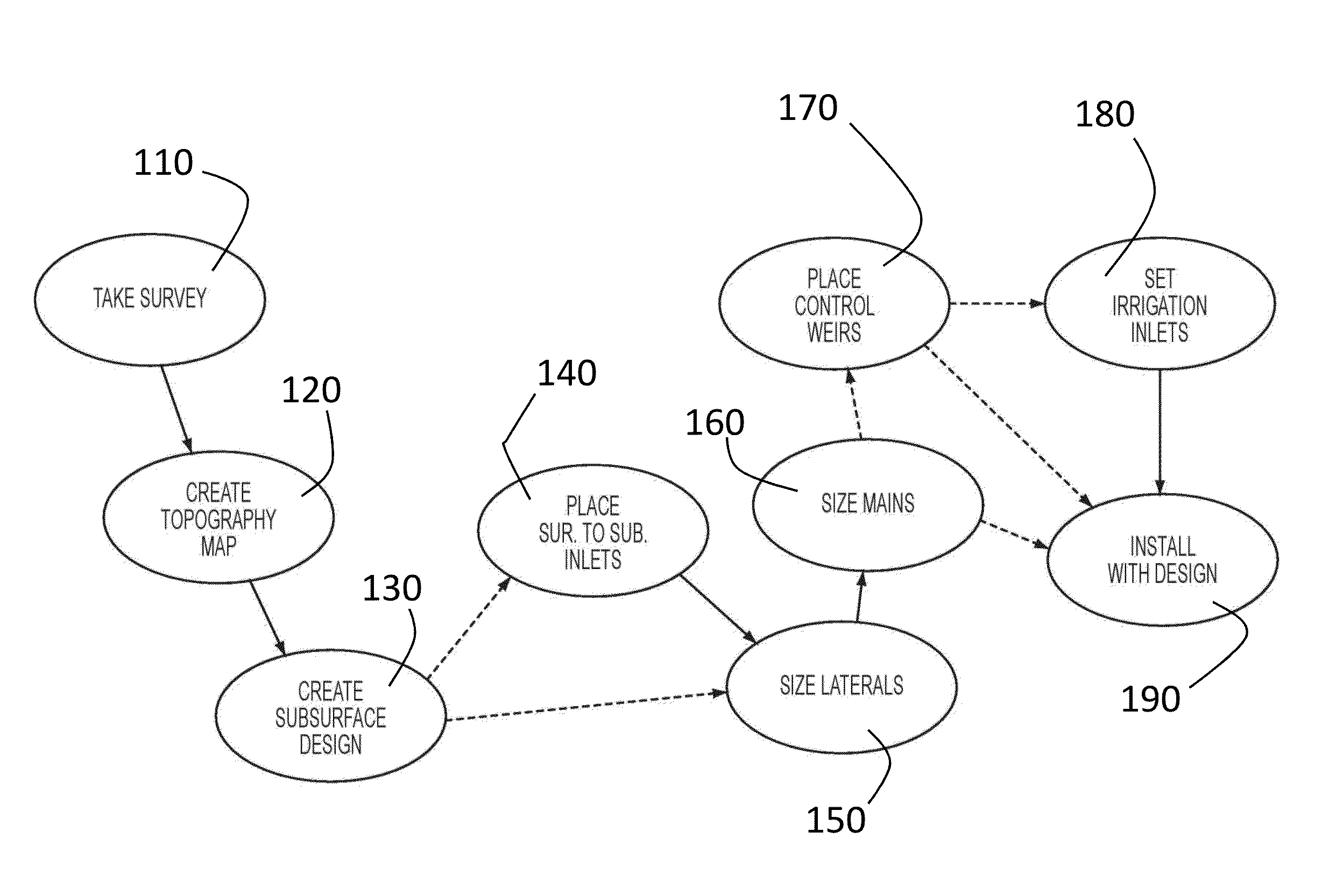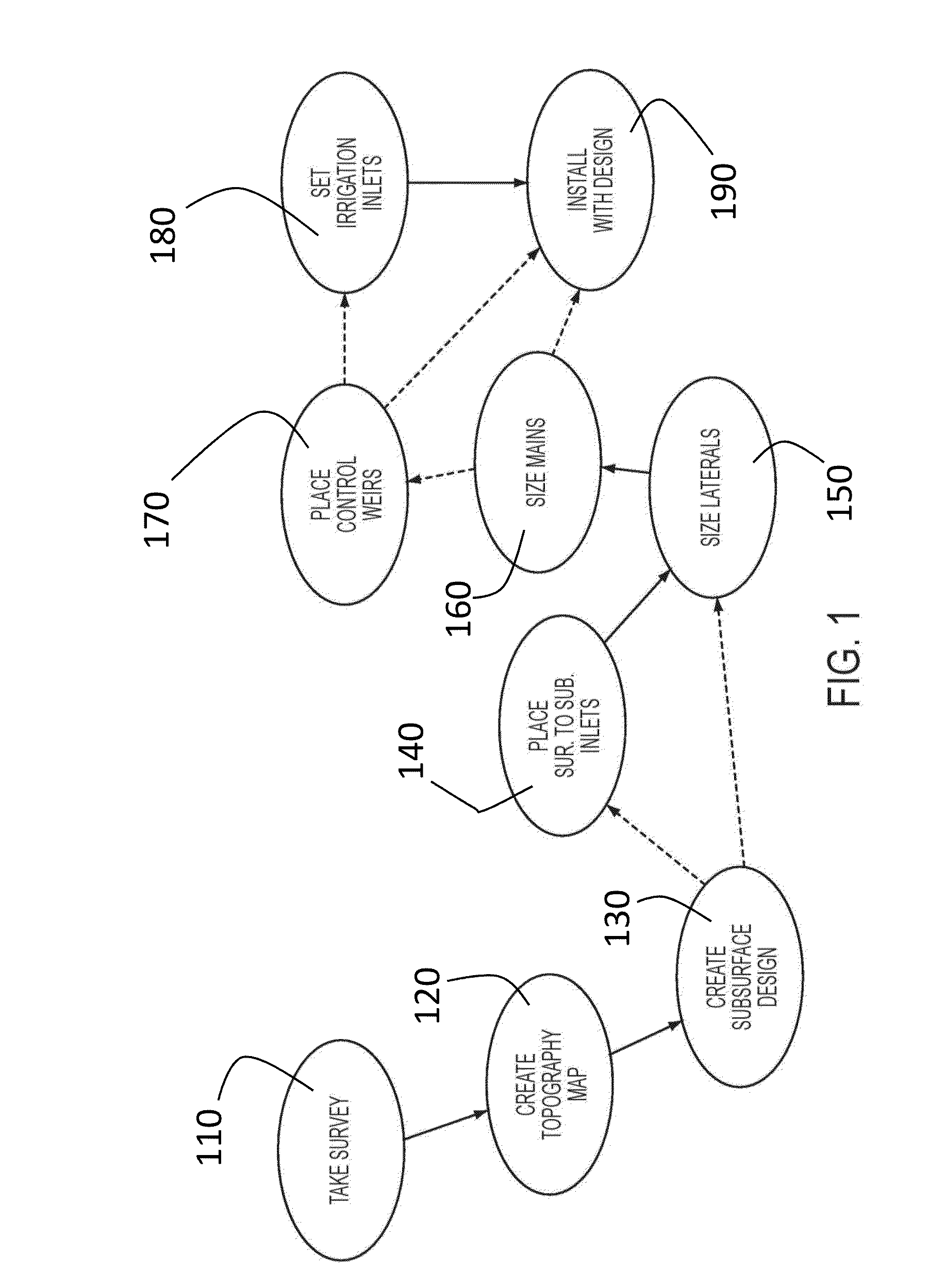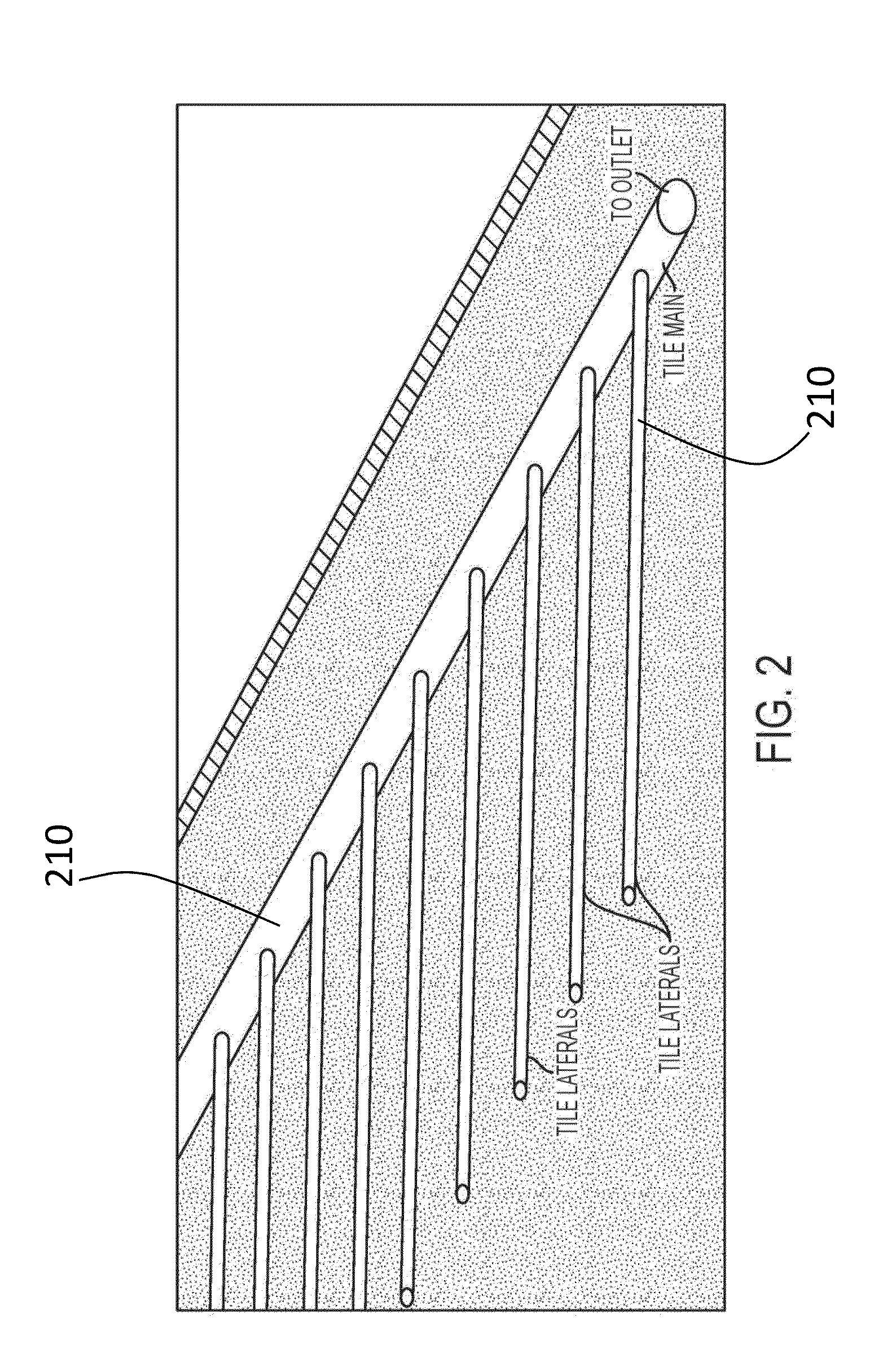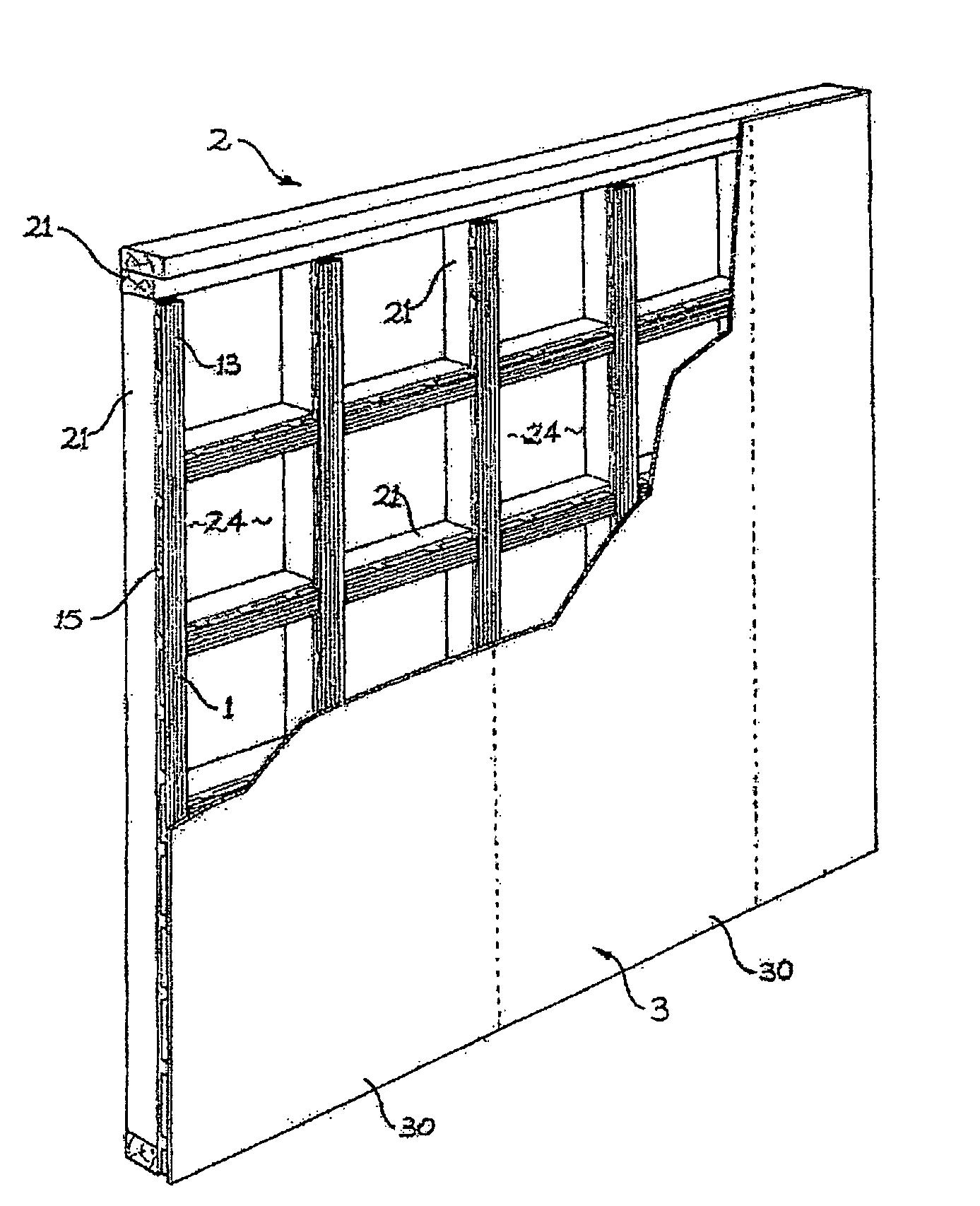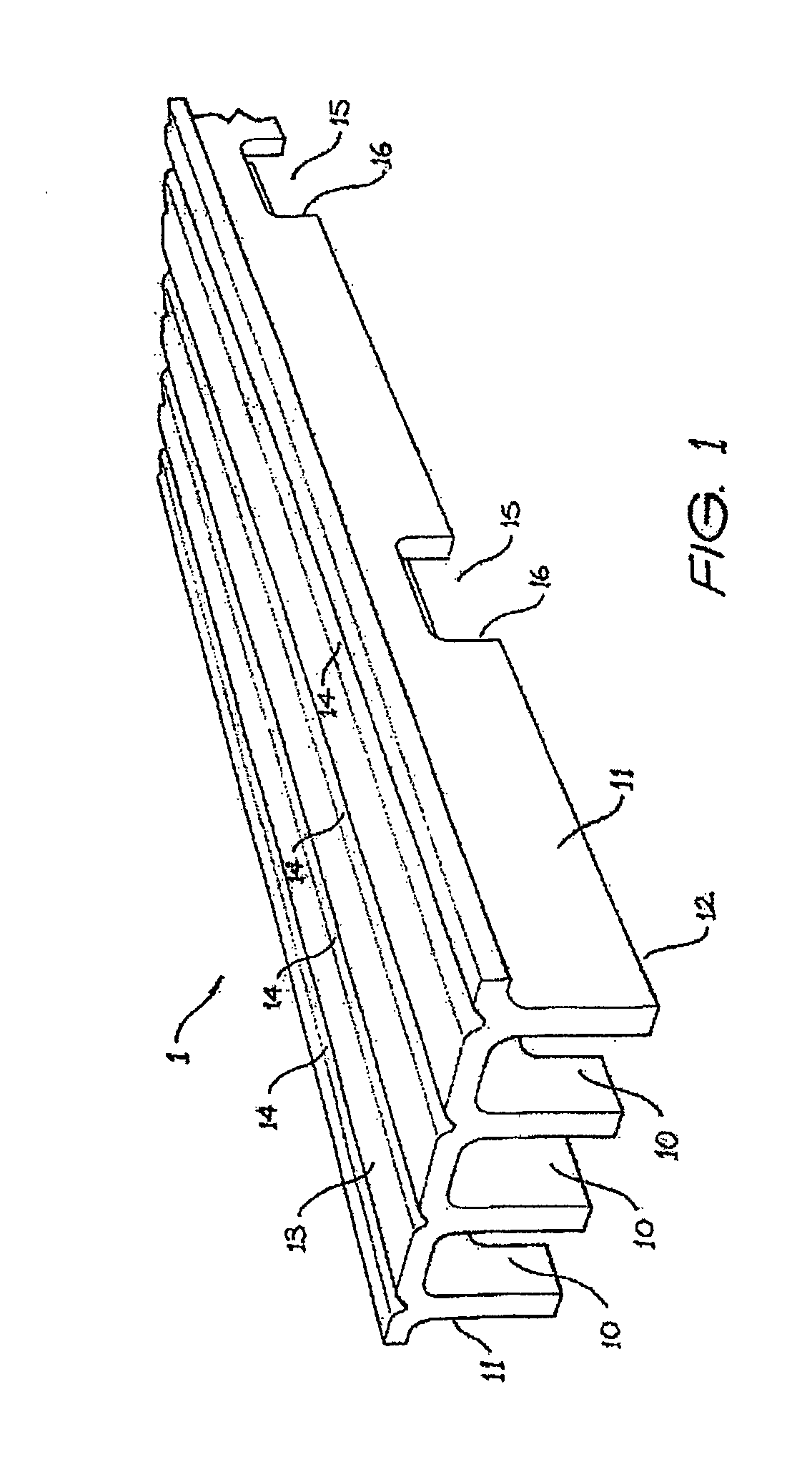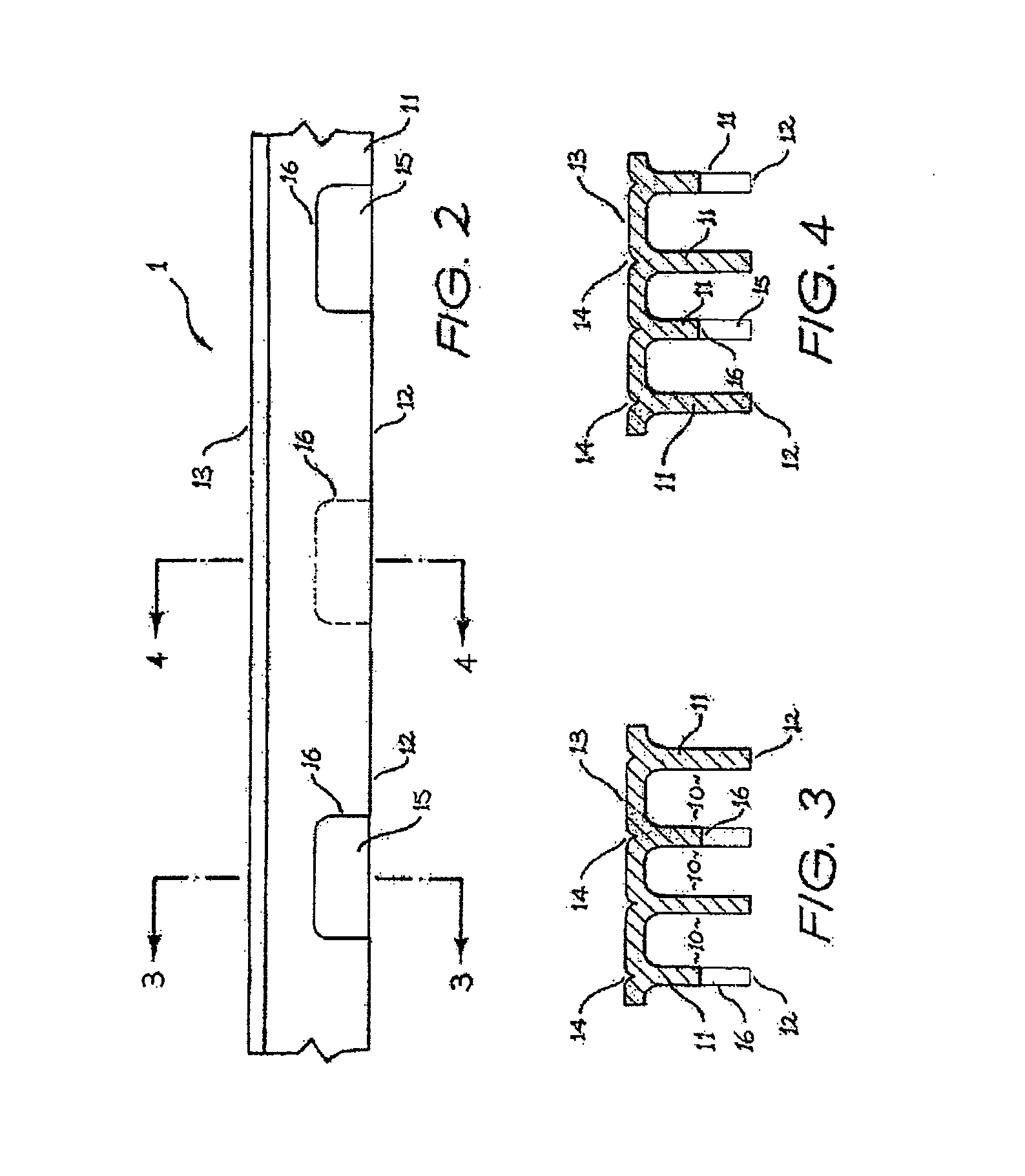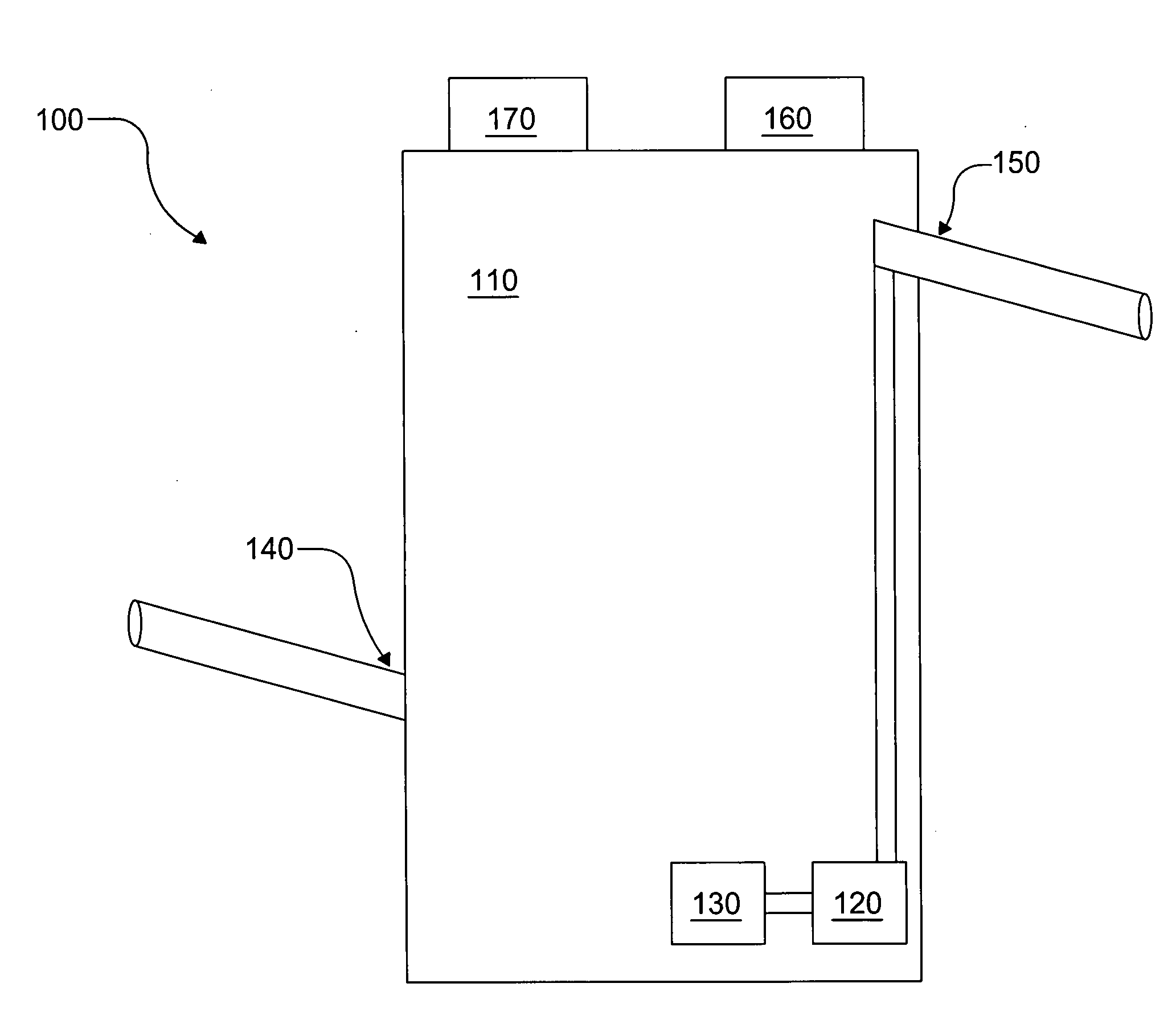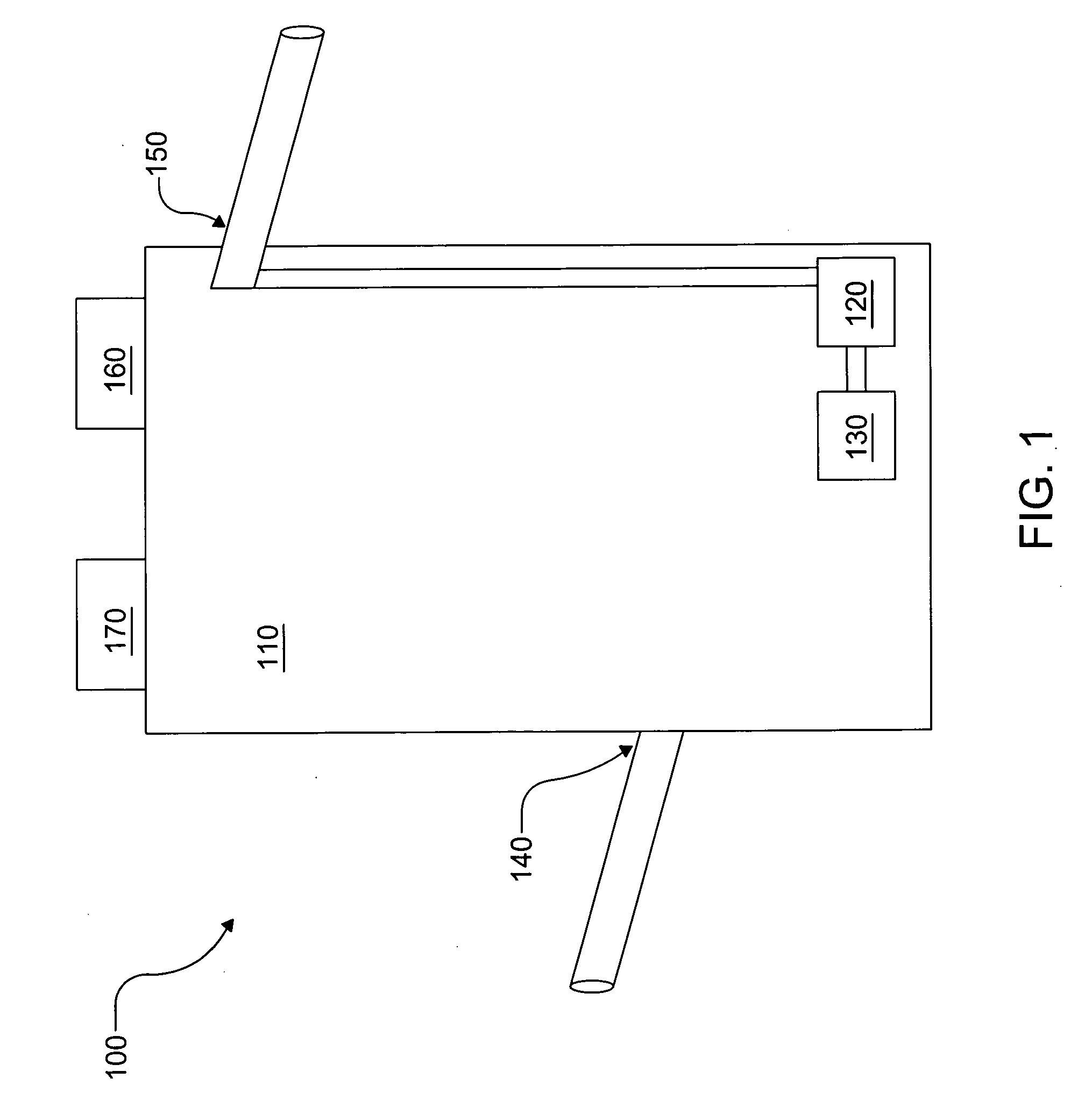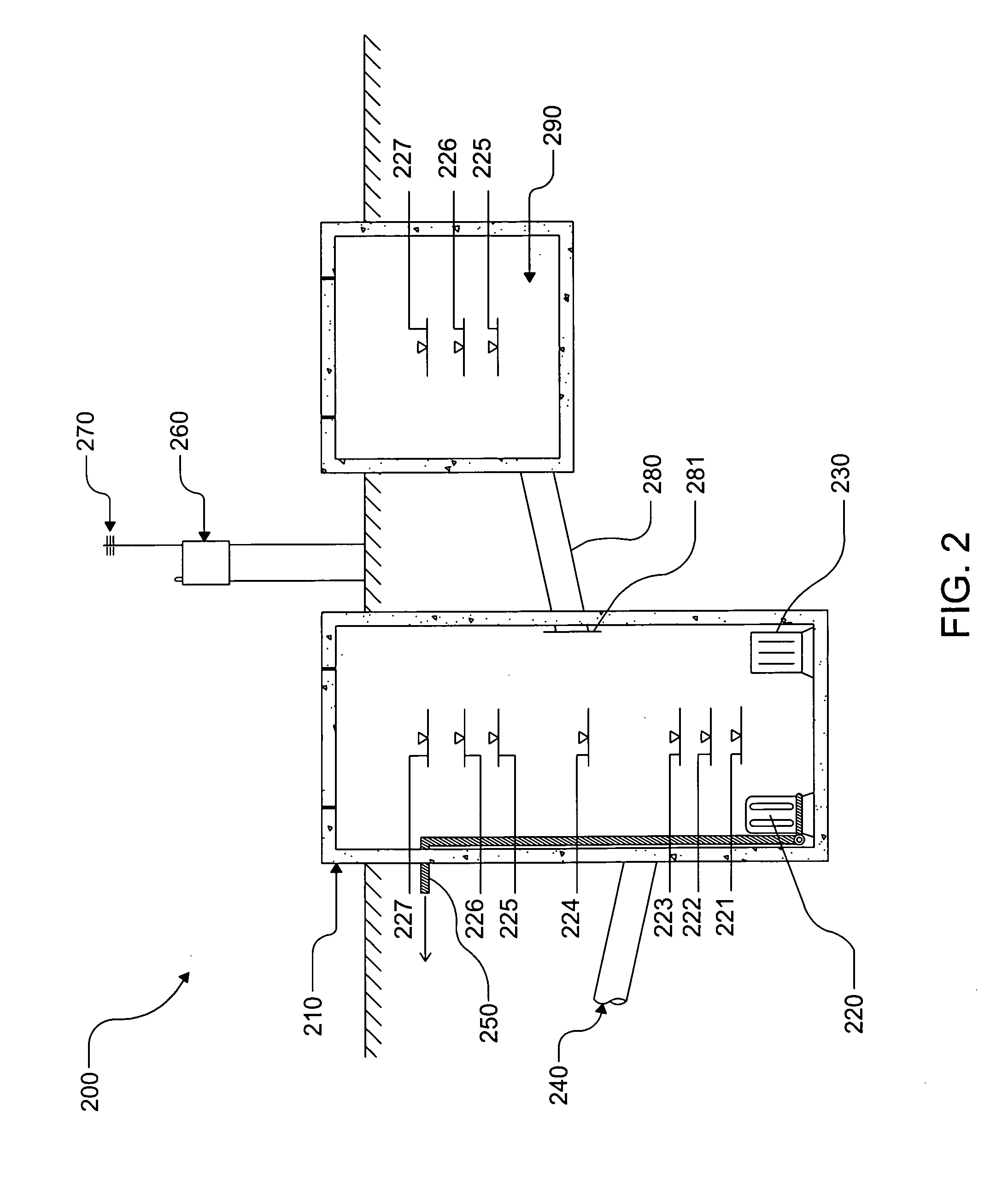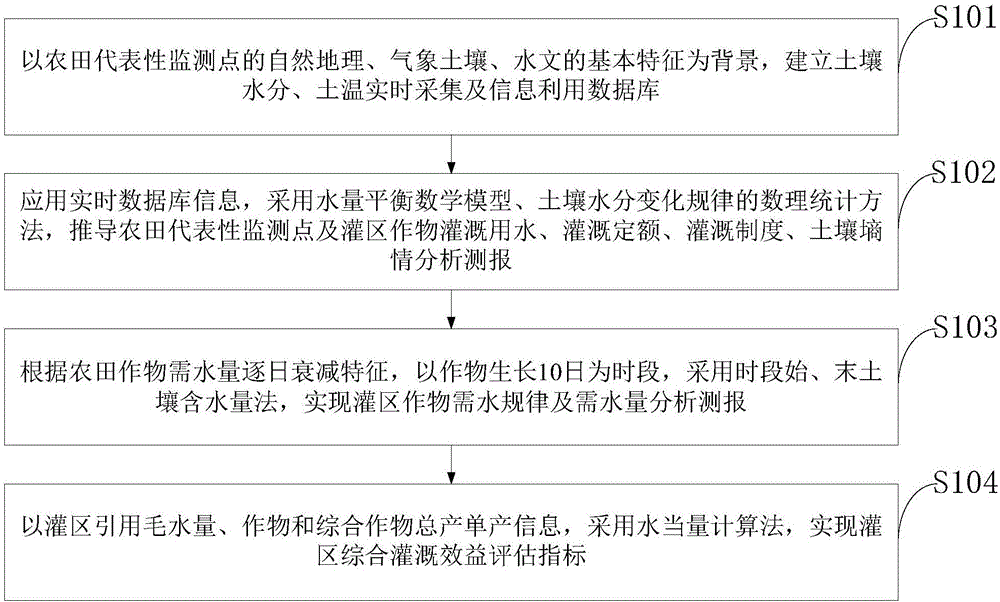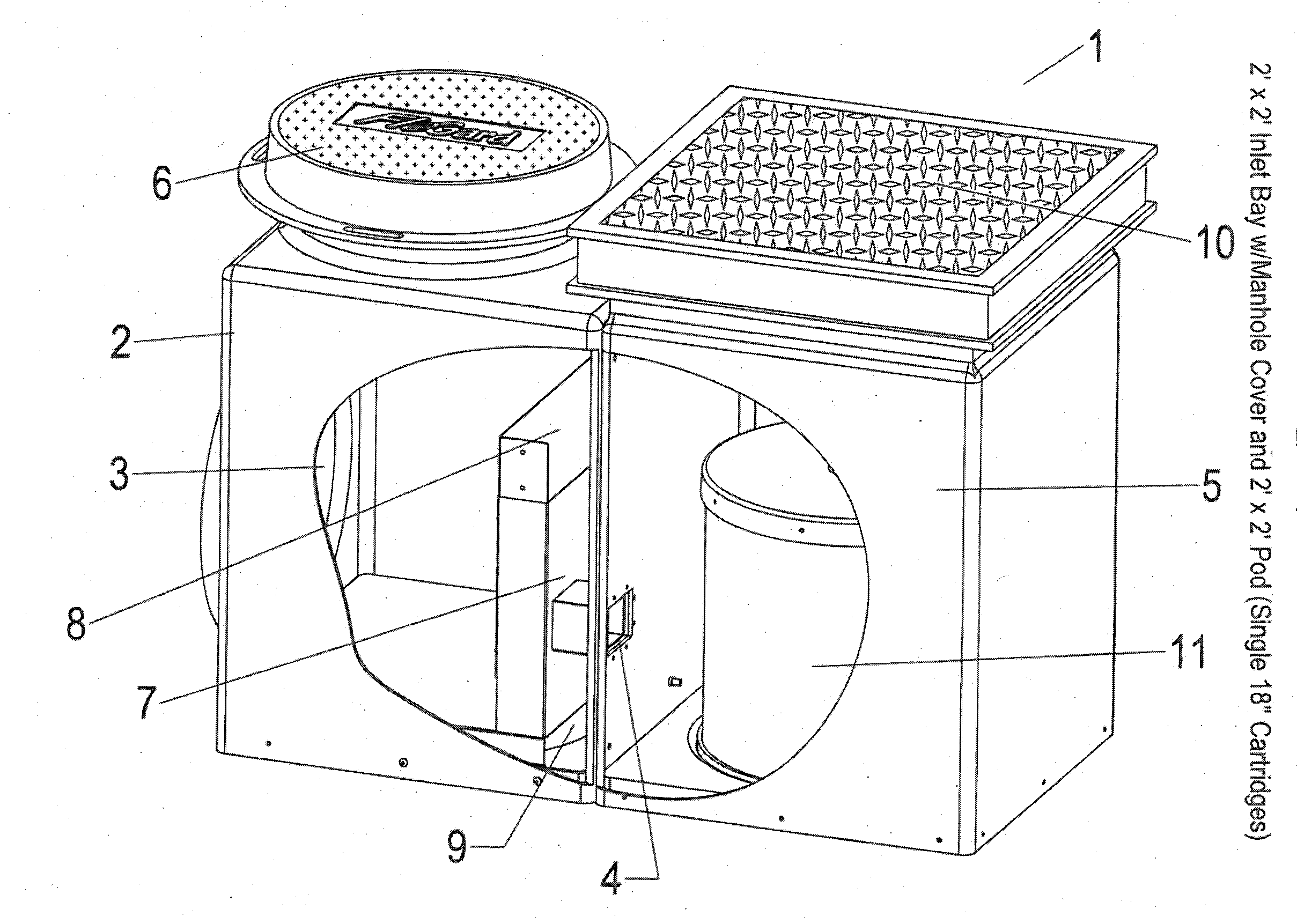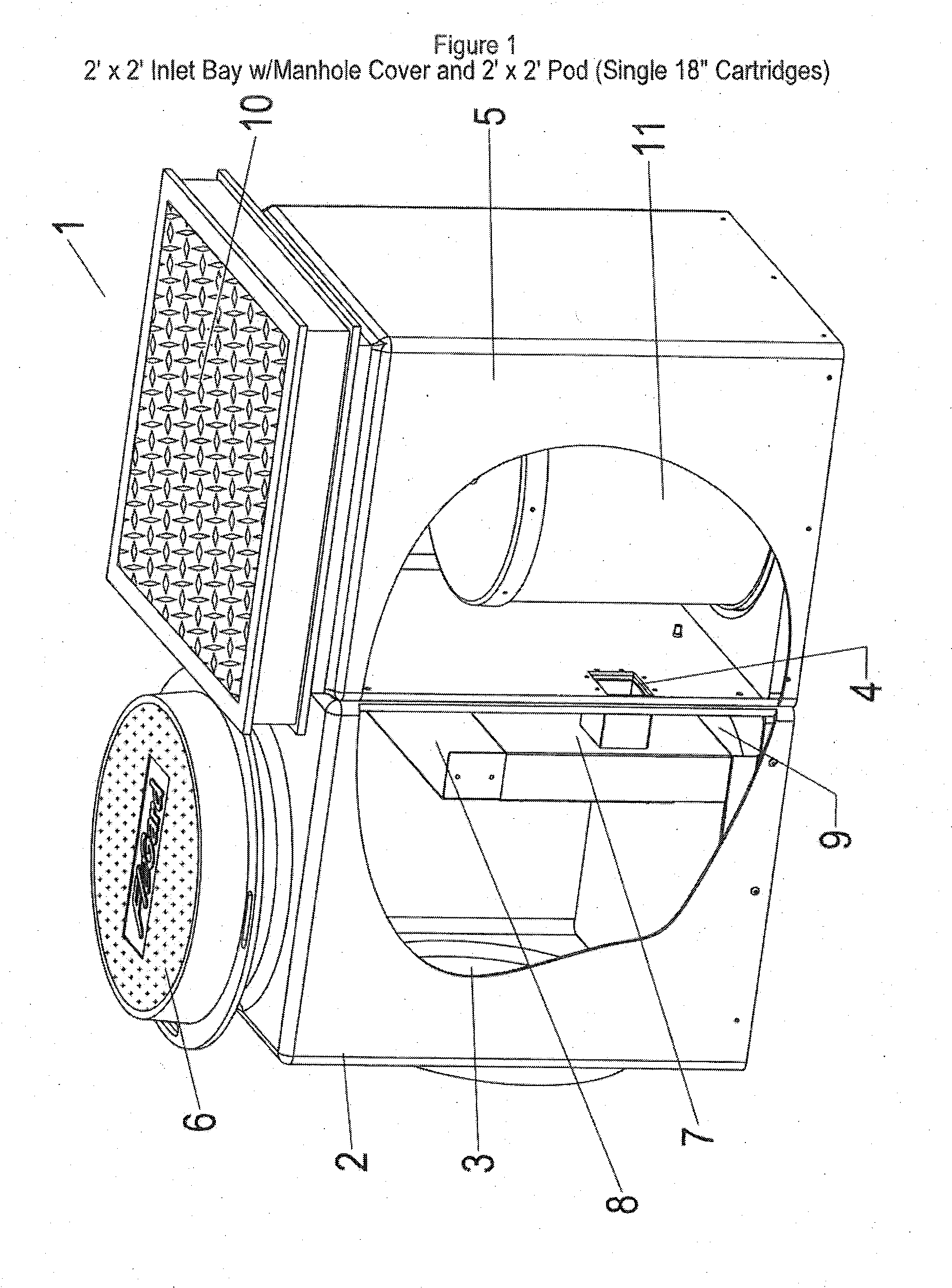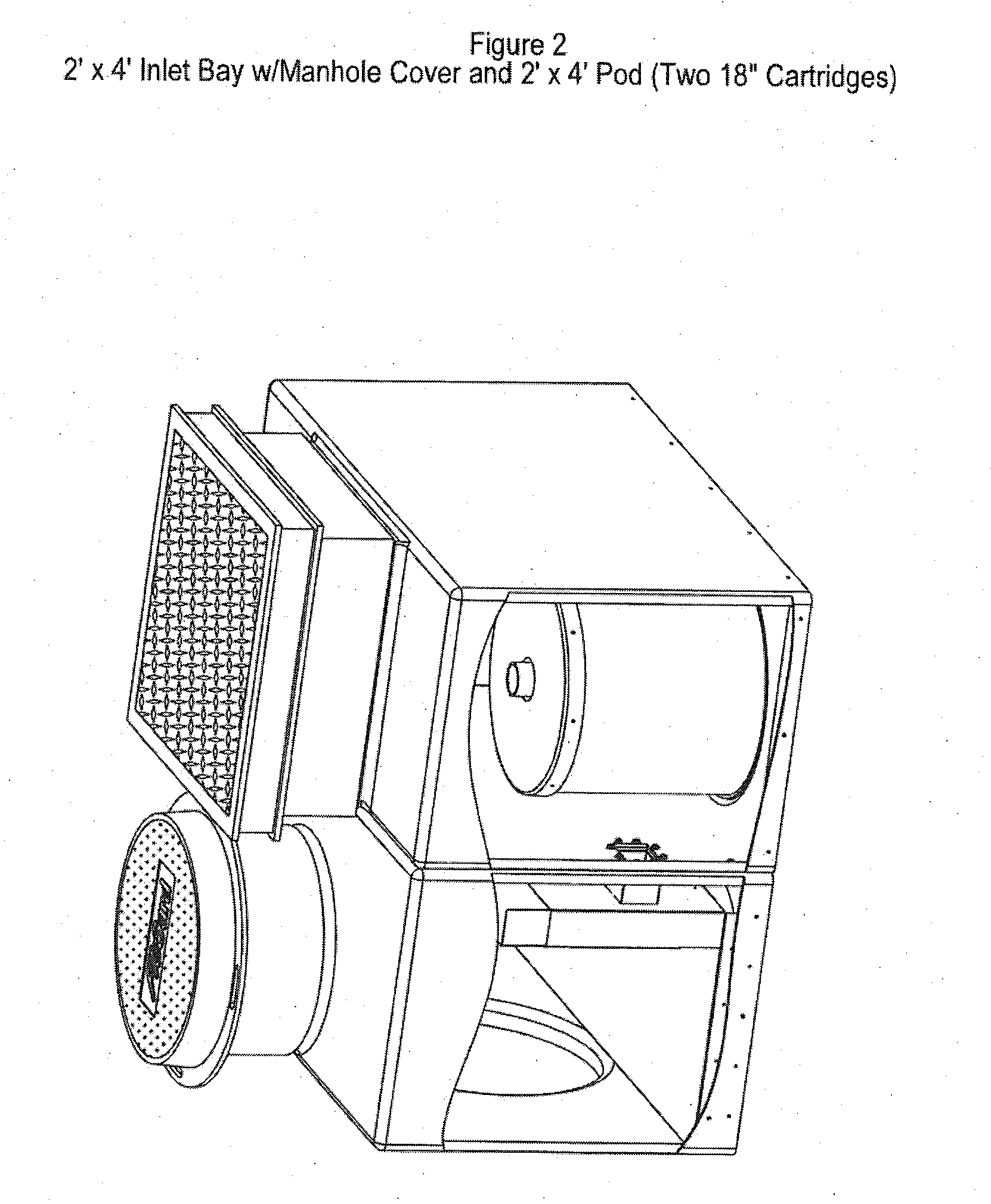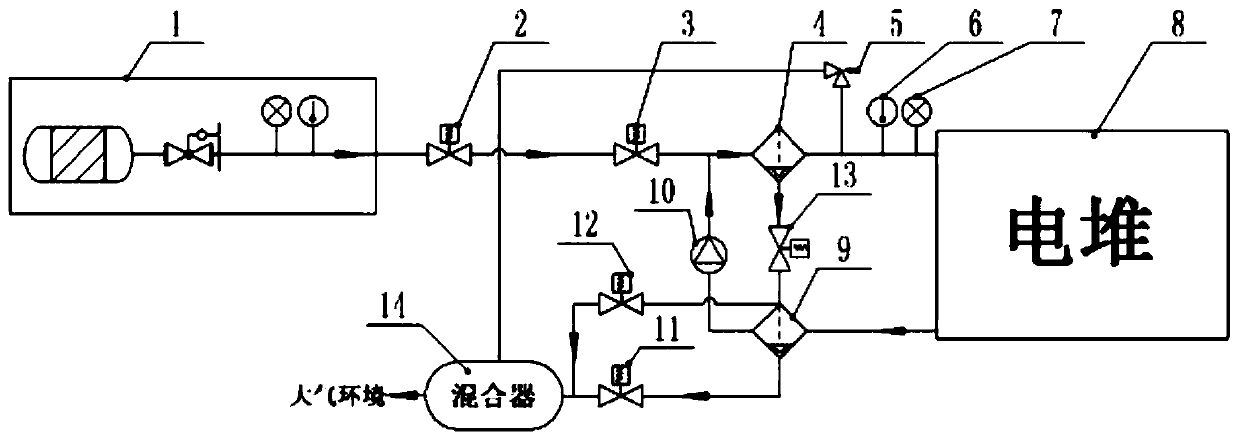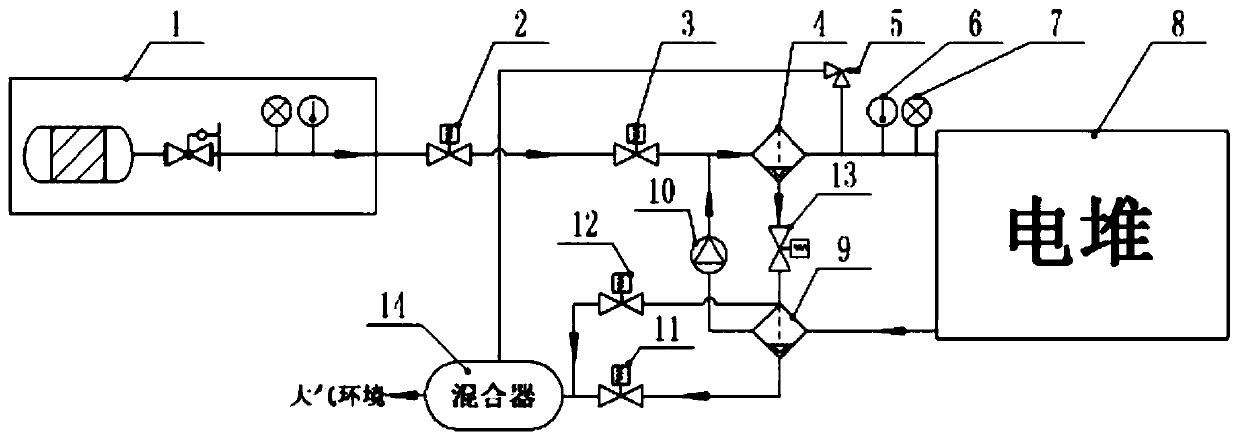Patents
Literature
266 results about "Water management system" patented technology
Efficacy Topic
Property
Owner
Technical Advancement
Application Domain
Technology Topic
Technology Field Word
Patent Country/Region
Patent Type
Patent Status
Application Year
Inventor
Fuel cell gas management system
InactiveUS6013385AImprove battery efficiencyMinimize the possibilityFuel cell heat exchangeFuel cell controlIonEnthalpy
A fuel cell gas management system including a cathode humidification system for transferring latent and sensible heat from an exhaust stream to the cathode inlet stream of the fuel cell; an anode humidity retention system for maintaining the total enthalpy of the anode stream exiting the fuel cell equal to the total enthalpy of the anode inlet stream; and a cooling water management system having segregated deionized water and cooling water loops interconnected by means of a brazed plate heat exchanger.
Owner:EMPRISE TECH ASSOC
Fuel-cell engine stream conditioning system
A stream conditioning system for a fuel cell gas management system or fuel cell engine. The stream conditioning system manages species potential in at least one fuel cell reactant stream. A species transfer device is located in the path of at least one reactant stream of a fuel cell's inlet or outlet, which transfer device conditions that stream to improve the efficiency of the fuel cell. The species transfer device incorporates an exchange media and a sorbent. The fuel cell gas management system can include a cathode loop with the stream conditioning system transferring latent and sensible heat from an exhaust stream to the cathode inlet stream of the fuel cell; an anode humidity retention system for maintaining the total enthalpy of the anode stream exiting the fuel cell related to the total enthalpy of the anode inlet stream; and a cooling water management system having segregated deionized water and cooling water loops interconnected by means of a brazed plate heat exchanger.
Owner:EMPRISE TECH ASSOC
Automatic pool cleaner
ActiveUS20070094817A1Prevent movementEfficient vacuumingGymnasiumSwimming poolsPower cableMarine engineering
An automatic pool cleaner is provided of the type for random travel over submerged floor and side wall surfaces of a swimming pool or the like to dislodge and collect debris. The pool cleaner includes an electric-powered traction drive system for rotatably driving cleaner wheels, and an electric-powered water management system including a water supply pump and related manifold unit for venturi-vacuuming and collection of settled debris within a porous filter bag. A directional control system including an on-board compass monitors turning movements of the pool cleaner during normal random travel operation, and functions to regulate the traction drive system in a manner to prevent, e.g., excess twisting of a conduit such as a power cable tethered to the pool cleaner.
Owner:ZODIAC POOL SYST LLC
Irrigation flow converter, monitoring system and intelligent water management system
ActiveUS20090271045A1Reduce the amount requiredLess waterOperating means/releasing devices for valvesSelf-acting watering devicesWater useWater management system
The present invention is directed to an intelligent water management irrigation system for monitoring the total water usage for a billing site and preventing cumulative water usage from exceeding a water budget by adjusting the amount of water used for irrigation. Irrigation zone priority values are selected for each irrigation zone that specify a percentage of the full water need that the foliage in the zone can survive and are saved in an intelligent water management irrigation (IWMI) controller. The IWMI controller receives water usage information originating from a property's water meter and compares the measured water usage with the allowable water budget. Water usage is tracked separately for the household use and landscape use (irrigation). Prior to each irrigation cycle, the IWMI controller estimates the amount of water that will be needed by the landscape and for household use during the remainder of a billing cycle; household use is given precedence over landscape use. If the water budget will support both, irrigation can proceed normally. If the budget will not support both, the IWMI controller estimates the amount of water needed for the remainder of the billing cycle if only a priority watering amount is allocated for each landscape zone. If the water budget will support priority irrigation, landscape watering can proceed in priority irrigation mode. If the water budget will not support priority irrigation watering, the irrigation cycle is skipped and the water usage estimations are recalculated prior to the next irrigation cycle.
Owner:TELSCO INDS
Irrigation flow converter, monitoring system and intelligent water management system
ActiveUS7930069B2Operating means/releasing devices for valvesSelf-acting watering devicesWater useWater management system
The present invention is directed to an intelligent water management irrigation system for monitoring the total water usage for a billing site and preventing cumulative water usage from exceeding a water budget by adjusting the amount of water used for irrigation. Irrigation zone priority values are selected for each irrigation zone that specify a percentage of the full water need that the foliage in the zone can survive and are saved in an intelligent water management irrigation (IWMI) controller. The IWMI controller receives water usage information originating from a property's water meter and compares the measured water usage with the allowable water budget. Water usage is tracked separately for the household use and landscape use (irrigation). Prior to each irrigation cycle, the IWMI controller estimates the amount of water that will be needed by the landscape and for household use during the remainder of a billing cycle; household use is given precedence over landscape use. If the water budget will support both, irrigation can proceed normally. If the budget will not support both, the IWMI controller estimates the amount of water needed for the remainder of the billing cycle if only a priority watering amount is allocated for each landscape zone. If the water budget will support priority irrigation, landscape watering can proceed in priority irrigation mode. If the water budget will not support priority irrigation watering, the irrigation cycle is skipped and the water usage estimations are recalculated prior to the next irrigation cycle.
Owner:TELSCO INDUSTRIES INC
Irrigation flow converter, monitoring system and intelligent water management system
InactiveUS20110190947A1Reduce the amount requiredLess waterControlling ratio of multiple fluid flowsWatering devicesWater useMonitoring system
The present invention is directed to an intelligent water management irrigation system for monitoring the total water usage for a billing site and preventing cumulative water usage from exceeding a water budget by adjusting the amount of water used for irrigation. Irrigation zone priority values are selected for each irrigation zone that specify a percentage of the full water need that the foliage in the zone can survive and are saved in an intelligent water management irrigation (IWMI) controller. The IWMI controller receives water usage information originating from a property's water meter and compares the measured water usage with the allowable water budget. Water usage is tracked separately for the household use and landscape use (irrigation). Prior to each irrigation cycle, the IWMI controller estimates the amount of water that will be needed by the landscape and for household use during the remainder of a billing cycle; household use is given precedence over landscape use. If the water budget will support both, irrigation can proceed normally. If the budget will not support both, the IWMI controller estimates the amount of water needed for the remainder of the billing cycle if only a priority watering amount is allocated for each landscape zone. If the water budget will support priority irrigation, landscape watering can proceed in priority irrigation mode. If the water budget will not support priority irrigation watering, the irrigation cycle is skipped and the water usage estimations are recalculated prior to the next irrigation cycle.
Owner:TELSCO INDS
In line wetland water treatment system and method
ActiveUS20080251448A1Easy to useIncrease the lengthFatty/oily/floating substances removal devicesWater cleaningWater treatment systemWater flow
A complete storm water management system and process which incorporates a wetlands water treatment system. This system creates an infrastructure, flow control which is multi-level and multi-stage. This is a modular system which includes three or more chambers and / or ditches through which the storm water or other influent passes and is cleaned. The influent which flows into a storm drain, curb inlet, or inflow pipe into the system is directed first into a screening type catch basin inset filter within the first chamber of the system. The influent is treated within the first chamber before it passes out of this chamber into the incorporated wetlands system. The water flows through the wetlands chamber or ditch where it is further filtered and decontaminated through both an aerobic and anaerobic process. In situations of high runoff there is a bypass component.
Owner:MODULAR WETLAND SYST
Modular underground water management systems
The invention provides modular units, associated component parts, and assemblies of the modular units and component parts, including filtration systems, that are useful for making and using underground water management systems.
Owner:CUDO STORMWATER PRODS
Water Management System
InactiveUS20110035063A1Facilitate water conservationData processing applicationsElectric devicesTelecommunications linkDisplay device
This invention is a water consumption monitoring and control system comprised of a base unit, itself comprising a display and a data entry device, a microprocessor, a communication link to water meters, pressure sensors, temperature sensors, flush toilet vibration sensors and shut-off valves. In addition the base unit has access to the Internet and can access a server which holds a database of water conservation information. This database includes watering advisories from the local government, and weather information from the weather office. The server runs an algorithm and generates control data which is sent to the base unit.
Owner:PALAYUR SAJU ANTONY
Automatic pool cleaner
ActiveUS7690066B2Prevent movementEfficient vacuumingGymnasiumSwimming poolsAutomated pool cleanerPower cable
An automatic pool cleaner is provided of the type for random travel over submerged floor and side wall surfaces of a swimming pool or the like to dislodge and collect debris. The pool cleaner includes an electric-powered traction drive system for rotatably driving cleaner wheels, and an electric-powered water management system including a water supply pump and related manifold unit for venturi-vacuuming and collection of settled debris within a porous filter bag. A directional control system including an on-board compass monitors turning movements of the pool cleaner during normal random travel operation, and functions to regulate the traction drive system in a manner to prevent, e.g., excess twisting of a conduit such as a power cable tethered to the pool cleaner.
Owner:ZODIAC POOL SYST LLC
Inner supported climate controlled single trailer shelter
InactiveUS7695049B2Increase pressureFirmly connectedTents/canopiesVehicle with living accommodationAir filtrationWater storage tank
A portable climate controlled air shelter system on a transport device such as a trailer, truck bed or ISO container box with all sub-systems integral to the transport device where the sub systems include an inflatable air shelter with inflation / deflation blower, electrical power generator and fuel system pre-wired to all other sub systems, heating ventilation and air conditioning unit, air filtration, inflation / deflation blower, water management system, external lighting, central control panel for single point monitoring and control of the air shelter system and physical storage. Also provided are compressed air tanks for inflation of the air shelter as well as water ballast tubes that mechanically attach to the air shelter to provide stability in winds and on uneven ground. The water management system includes a water storage tank and pump for filling and emptying the water ballast tubes. The air shelter system also has transfer switch to allow the system to run on external “house power”.
Owner:COLBORNE BRUCE J
Water management system
InactiveUS8606413B2Detection of leakageLevel controlGeneral water supply conservationWater management systemWater flow
A method of managing and conserving water at a point of use, by installing a control panel and at least one electrically operated valve in a plumbing line, which valve can monitor at least pressure and flow rate, and allow the calculation of the total volume of flow in a particular line. The valve being controlled by a controller programmed to prevent water loss by monitoring the pressure and flow rate in a particular line to detect and prevent water consumption outside controlled parameters by shutting off the valve if the system detects an uncontrolled flow, such as faucet being left on, or a leaky toilet cistern, or the water flow in a zone exceeding a predetermined quota.
Owner:PICTON DAVID JOHN
Modular Stormwater Storage System
The invention provides modular units, associated component parts, and assemblies of the modular units and component parts, including storage and filtration systems, that are useful for making and using underground water management systems.
Owner:OLDCASTLE PRECAST
Hydrogen oxygen generation system for an internal combustion engine
InactiveUS20060090712A1Improve fuel efficiencyExcessive emissionInternal combustion piston enginesNon-fuel substance addition to fuelDistillationInternal combustion engine
A system is provided which, when integrated with an internal combustion engine, generates hydrogen and oxygen gases to enrich an internal combustion engine's petroleum fuel source. The system's primary components are a gas generation unit, heated water supply tanks, and a gas combiner for mixing generated hydrogen and oxygen gas with petroleum fuel to create hydrogenated and oxygenated petroleum fuel. The gas generation unit includes at least one cathode, at least one anode, vacuum regulatory units, a thermal transfer system, an electrical heating element, a feedwater management system, a gas collection and supply system, and water traps. The heated water tanks include a thermal transfer system, pressure and regulatory units as well as a distillation apparatus for producing distilled water. Electrical power is supplied to the system's power amplifier from the internal combustion engine's alternator or associated electrical system.
Owner:EHRETEK
Hydrogen oxygen generation system for an internal combustion engine
InactiveUS7100542B2Improve fuel efficiencyExcessive emissionNon-fuel substance addition to fuelInternal combustion piston enginesExternal combustion engineDistillation
Owner:EHRETEK
Green sorption material mixes for water treatment
ActiveUS8002984B1Low costRaise the ratioCalcareous fertilisersClimate change adaptationFiltrationStormwater treatment
Media compositions for use in wastewater treatment, stormwater treatment, CSO treatment and greenroof stormwater management systems as filtration media, plant growth media or pollutant retention media. Media composition includes at least one of a recycled material selected from a group consisting of tire crumb, wood sawdust and paper and a naturally occurring material selected from a group consisting of sand, limestone, sandy clay, expanded clay, organics used for processing geothermal water, organics used for agricultural drainage basins and filtration, and organics for aquaculture drainage and organics used for silviculture and forest drainage, and organics used as growing media.
Owner:UNIV OF CENT FLORIDA RES FOUND INC
In line wetland water treatment system
ActiveUS7425262B1Reduce maintenanceEasy to useTreatment using aerobic processesGeneral water supply conservationWater treatment systemWater flow
A complete storm water management system and process which performs both drainage and treatment tasks and incorporates a wetlands water treatment system. This system creates an infrastructure, flow control which is multi-level and multi-stage. This system incorporates a self-contained wetlands treatment system. This is a modular system which includes three or more linear chambers through which the storm water or other influent passes and is cleaned. The influent which flows into a storm drain, curb inlet, or inflow pipe into the system is directed first into a screening type catch basin inset filter within the first chamber of the system. The wetlands chamber is composed of one or more modular segments which may be made in various depths, lengths and widths. The influent is treated within the first chamber before it passes out of this chamber into the incorporated wetlands system. The water flows through the wetlands chamber where it is further filtered and decontaminated through both an aerobic and anaerobic process. In situations of high runoff there is a bypass component which runs directly from the first chamber and bypasses the wetlands chamber dumping the pretreated water into the discharge final chamber. This system is fitted with a variable level treatment component designed in such a way to offer variable discharge rates and thus vary the level of treatments over a wide range of flow rates. The system can be placed underground, and below concrete, such as in parking lots or park areas.
Owner:MODULAR WETLAND SYST
Fuel cell anode water management system and control method
ActiveCN111063916AImprove environmental adaptabilityIncrease power consumptionFuel cell heat exchangeAtomizer nozzleLiquid water
The invention discloses a fuel cell anode water management system and a control method, and belongs to the technical field of proton exchange membrane fuel cells. Aiming at the problem of anode watermanagement in the operation process of a proton exchange membrane fuel cell, the scheme provided by the invention can realize two functions of water removal and humidification, and liquid water separated from a baffle in a gas-water separation device in the water removal process is stored and supplemented to an ejector when the fuel cell membrane is dry and needs to be humidified. Liquid water inthe electric pile tail gas is fully recycled, so that the environmental adaptability of a humidifying system to a water shortage condition and a low-temperature condition is improved. Liquid water issucked into a mixing chamber through high-pressure hydrogen and the ejector, and extra system power consumption increased by humidifying devices such as an atomizing nozzle and an ultrasonic atomizeris avoided.
Owner:UNIV OF ELECTRONICS SCI & TECH OF CHINA
Method of generating hydrogen gas from sodium borohydride
ActiveUS7306780B1Rapid and complete reactionEliminate needPeroxides/peroxyhydrates/peroxyacids/superoxides/ozonidesChemical/physical/physico-chemical microreactorsClosed loopCobalt
A compact solid source of hydrogen gas, where the gas is generated by contacting water with micro-disperse particles of sodium borohydride in the presence of a catalyst, such as cobalt or ruthenium. The micro-disperse particles can have a substantially uniform diameter of 1-10 microns, and preferably about 3-5 microns. Ruthenium or cobalt catalytic nanoparticles can be incorporated in the micro-disperse particles of sodium borohydride, which allows a rapid and complete reaction to occur without the problems associated with caking and scaling of the surface by the reactant product sodium metaborate. A closed loop water management system can be used to recycle wastewater from a PEM fuel cell to supply water for reacting with the micro-disperse particles of sodium borohydride in a compact hydrogen gas generator. Capillary forces can wick water from a water reservoir into a packed bed of micro-disperse fuel particles, eliminating the need for using an active pump.
Owner:NAT TECH & ENG SOLUTIONS OF SANDIA LLC
In line wetland water treatment system and method
ActiveUS7470362B2Easy to useIncrease the lengthFatty/oily/floating substances removal devicesWater cleaningWater treatment systemWater flow
A complete storm water management system and process which incorporates a wetlands water treatment system. This system creates an infrastructure, flow control which is multi-level and multi-stage. This is a modular system which includes three or more chambers and / or ditches through which the storm water or other influent passes and is cleaned. The influent which flows into a storm drain, curb inlet, or inflow pipe into the system is directed first into a screening type catch basin inset filter within the first chamber of the system. The influent is treated within the first chamber before it passes out of this chamber into the incorporated wetlands system. The water flows through the wetlands chamber or ditch where it is further filtered and decontaminated through both an aerobic and anaerobic process. In situations of high runoff there is a bypass component.
Owner:MODULAR WETLAND SYST
Modular Ducting Section Adapted for Laing End-To-End and Side by Side Forming a Networked Utilities Ducting System and Rain and Run-Off Water Management System
ActiveUS20130121761A1Cost-effectiveLow-cost installationCable installations in surface ductsGround-workCycloneRoad surface
The invention integrates the functionality of: kerbs, gutters, pathways, into a surface accessible networked utility ducting system and a a rain and run-off water management system.It is comprised of a base section formed a combination of one or more open topped utility access channels, an open topped water catchment channel, a slopped flange and one or more open sided access and or open topped feeder line distribution channels.The invention includes features for the isolation of electric power channels from contact with other utilities such as gas, water, or communications.The invention includes features for, integration with existing stormwater systems such as overflow points.The invention provides utilities access pathway all the way to an end users premises with minimal need for digging or disturbance of footpaths or paved surfaces this is a major improvement upon the prior art which tranforms the economics of surface accessible utility ducting systems.The invention includes covers, which are interchangeable, may take various forms, such as a pavement and kerb, a driveway ramp or a wheel chair access ramp. This allows the invention to be economically adapted to changes in kerb requirements as changes to the pathways and kerbs occur along their length and as requirements change over time, this solves the problems associated with the prior art which can not be readily adapted to all the variations found in kerbs and gutters along the length of the kerb and pavement or as they occur over time.The invention enables rain and run-off water to be isolated from contamination and managed to preserve its value and usefulness.The invention lowers the cost of, and, increases the speed, of new service deployment thereby overcoming the major economic barriers to market entry of new distributed utility services.The invention is to be manufactured in most cases as precast modules. The channels, lids, access boxes are linked by flexible interstitial joints which enable the system so formed to change direction to conform with the contours of the landscape in which it is located. In most cases the material of construction will be a dense, reinforced material such as concrete. When so constructed the invention will resist the effects of earthquakes, cyclones, flooding, tornados, and tsunamis.
Owner:DIXON GUY ANDREW COTTERILL
Root and water management system for potted plants
ActiveUS20070094928A1ConstructionsSelf-acting watering devicesWater management systemLocal environment
A pot (40) shown having a well formed by a side wall connecting a base wall aperture (43) and internal aperture (44). A mesh (42) is provided to retain liquid transferring material. The invention provides a liquid transfer means for transferring liquid between growth medium and a local environment external to the pot and adjacent the base wall, the liquid transfer means transferring liquid to in or from an internal zone in the chamber wherein the internal zone is spaced from the bottom wall. Alternative embodiments provide a solid liquid permeable plug (20) which may be inserted in a tight nesting fitting through a bottom wall aperture (21) or through a well (36). Alternatively, a wick arrangement (56) may be provided to insert through a well or a side wall aperture (65) and extending into the internal zones. The conduit may be formed as a slot (52). A cap (54) may be optionally be provided. The invention extends to a method of water control and a system for controlling a plurality of pots according to the disclosure. The pots may be located on a capillary mat (68) and in liquid communication therewith to transfer a liquid to and / or from the internal zone in the base of the pot. The pot base is preferably planar externally to provide an easy working surface.
Owner:ANOVA SOLUTIONS
Wading management system and control method for same
InactiveCN102923071AAvoid measurement errorsMachines/enginesLevel indicatorsIn vehicleWater management system
The invention discloses a wading management system and a control method for the wading management system and relates to the technical field of electronic control units. The invention aims at relatively accurately measuring the actual water level height corresponding to wading parts of vehicles when the vehicles are in a wading condition. The wading management system comprises a first sensor, a second sensor and a central processing unit. The first sensor is used for acquiring first water level height below the first sensor; the second sensor is used for acquiring the included angle of the road surface, at which vehicles are located, and the horizontal plane; a first input terminal of the central processing unit is in electric connection with the first sensor and a second input terminal is connected with the second sensor; and the central processing unit acquires the signal of the first water level height and the signal of the included angle and acquires second water level height at the corresponding position of various wading parts in vehicles by analyzing and calculating the first water level height and the included angle. The wading management system is mainly applied to vehicles.
Owner:GREAT WALL MOTOR CO LTD
Fuel cell water management system and method
InactiveUS20070148526A1Improve drawing legibilityFuel cells groupingWater management in fuel cellsFuel cellsWater management system
Systems and methods for transporting accumulated water in a fuel cell system are disclosed. Briefly described, in one aspect, a system comprises a fuel cell flow field plate with at least one channel disposed on a surface of the fuel cell flow field plate, and at least one water management fin residing on a wall of the channel such that when the accumulated water is transported along the channel the water management fin guides the accumulated water.
Owner:FORD MOTOR CO +1
System And Method For Design Of Subsurface Drainage Systems Incorporating Control Weirs, Surface To Subsurface Inlets, And Irrigation Inlets
InactiveUS20130311144A1Minimize changesKeep distanceGeometric CADSpecial data processing applicationsSubsurface drainagePipeflow
A method for the creation of subsurface water management systems that place subsurface drainage lines at a consistent grade and within defined elevation bounds throughout a field with topographical undulation and inconsistent slopes, incorporate control weirs for dividing the subsurface into elevation and acreage zones, place and size surface to subsurface, size and determine inside surface of drainage mains and laterals according to the desired coefficient of the subsurface system, and determine the amount of water required at irrigation inlets in order to deliver a determined amount of water into the subsurface system for purposes of irrigation.
Owner:MEINERS CHAD R +2
Batten Mounting Water Management System
InactiveUS20080163582A1Good drainageImprove ventilationConstruction materialCovering/liningsWater management systemEvaporation
An elongate batten (1) adapted for positioning intermediate an inner wall framing member (2) and an outer wall cladding sheet (3) to facilitate dispersion and evaporation of moisture from a wall cavity. The batten includes at least one channel to facilitate migration and drainage of moisture between the batten and the framing member.
Owner:JAMES HARDIE TECH LTD
Waste water management system and method
InactiveUS20090283457A1Easy to pumpMinimize potentialSettling tanks feed/dischargeLoose filtering material filtersWater management systemWastewater
A system and method for increasing overall efficiency of a waste water system and increasing working efficiency of individual pump stations by implementing an overflow management system. The individual pump station facilitates delaying a discharge of fluid and stores waste water when a down stream pump station has reached a threshold level, thereby delaying or eliminating an overflow situation.
Owner:ISOS VENTURES
Irrigation water management system based on farmland water monitoring, and management method implemented by system
The invention discloses an irrigation water management system based on farmland water monitoring, and a management method implemented by the system. The system comprises a soil water and soil temperature information module, a farmland irrigation and soil water content information module, an irrigation area water consumption and irrigation result measuring and reporting module, and an irrigation area irrigation benefit result reporting module. The system and the method provided by the invention have the advantages that through comprehensive and modular technical methods and solutions, the maximum application of limited information is achieved; an information source, data transmission, a server and a database are utilized to provide basic conditions for storage, extraction, utilization and processing of monitoring information demand responses by the management system; and through comprehensive technical analysis methods, such as water balance, logical association, mathematical statistics, the method of measuring soil water contents at the beginning and the end of a period, the head-tail ratio calculation method, cross-industry data application, the water equivalent calculation method and the like, analysis of a water consumption quota, an irrigation system, the soil water content, the amount of water required by crops, an irrigation water utilization coefficient, the amount of water introduced into an irrigation area, crop yields, irrigation benefits and other management technology evaluation indicators can be achieved.
Owner:XINJIANG INST OF WATER RESOURCES & HYDRAULIC POWER
Modular Storm Water Filtration System
ActiveUS20120031854A1Reduce eliminateShallower facilitySemi-permeable membranesFatty/oily/floating substances removal devicesFiltrationWater management system
The invention provides systems, associated component parts, and assemblies of the pre-filtration systems, that are useful for treating storm water entering underground storm water management systems. The invention further provides methods to pre-filter storm water prior to entering underground water management systems. The invention reduces pollutant loading in storm water runoff with minimal footprint, flexibility of use and ease of maintenance.
Owner:OLDCASTLE PRECAST
Onboard fuel cell water management system and method
PendingCN110010932AImprove operational efficiencyGuaranteed uptimeFuel cellsExhaust valveWater management system
The invention belongs to the field of fuel cells and discloses an onboard fuel cell water management system and method. The system comprises a hydrogen supply component, a first gas-water separator, avoltaic pile, a first drain valve, a second gas-water separator, a second drain valve, an exhaust valve and a circulation pump, wherein the inlet of the first gas-water separator is connected to theoutlet of the hydrogen supply component; the gas outlet of the first gas-water separator is connected to the hydrogen inlet of the voltaic pile; the water outlet of the first gas-water separator is connected to the first drain valve; the inlet of the second gas-water separator is connected to the hydrogen outlet of the voltaic pile; the first gas outlet of the second gas-water separator is connected with the exhaust valve and the first drain valve; the second gas outlet of the second gas-water separator is connected to the inlet of the first gas-water separator through the circulation pump; and the water outlet of the second gas-water separator is connected to the second drain valve. The system configures different drainage and exhaust circuits under different working conditions to preventthe anode of the voltaic pile from being insufficiently humidified or excessively humidified, thereby improving the performance of the fuel cell.
Owner:SHANGHAI FUEL CELL VEHICLE POWERTRAIN
Features
- R&D
- Intellectual Property
- Life Sciences
- Materials
- Tech Scout
Why Patsnap Eureka
- Unparalleled Data Quality
- Higher Quality Content
- 60% Fewer Hallucinations
Social media
Patsnap Eureka Blog
Learn More Browse by: Latest US Patents, China's latest patents, Technical Efficacy Thesaurus, Application Domain, Technology Topic, Popular Technical Reports.
© 2025 PatSnap. All rights reserved.Legal|Privacy policy|Modern Slavery Act Transparency Statement|Sitemap|About US| Contact US: help@patsnap.com



